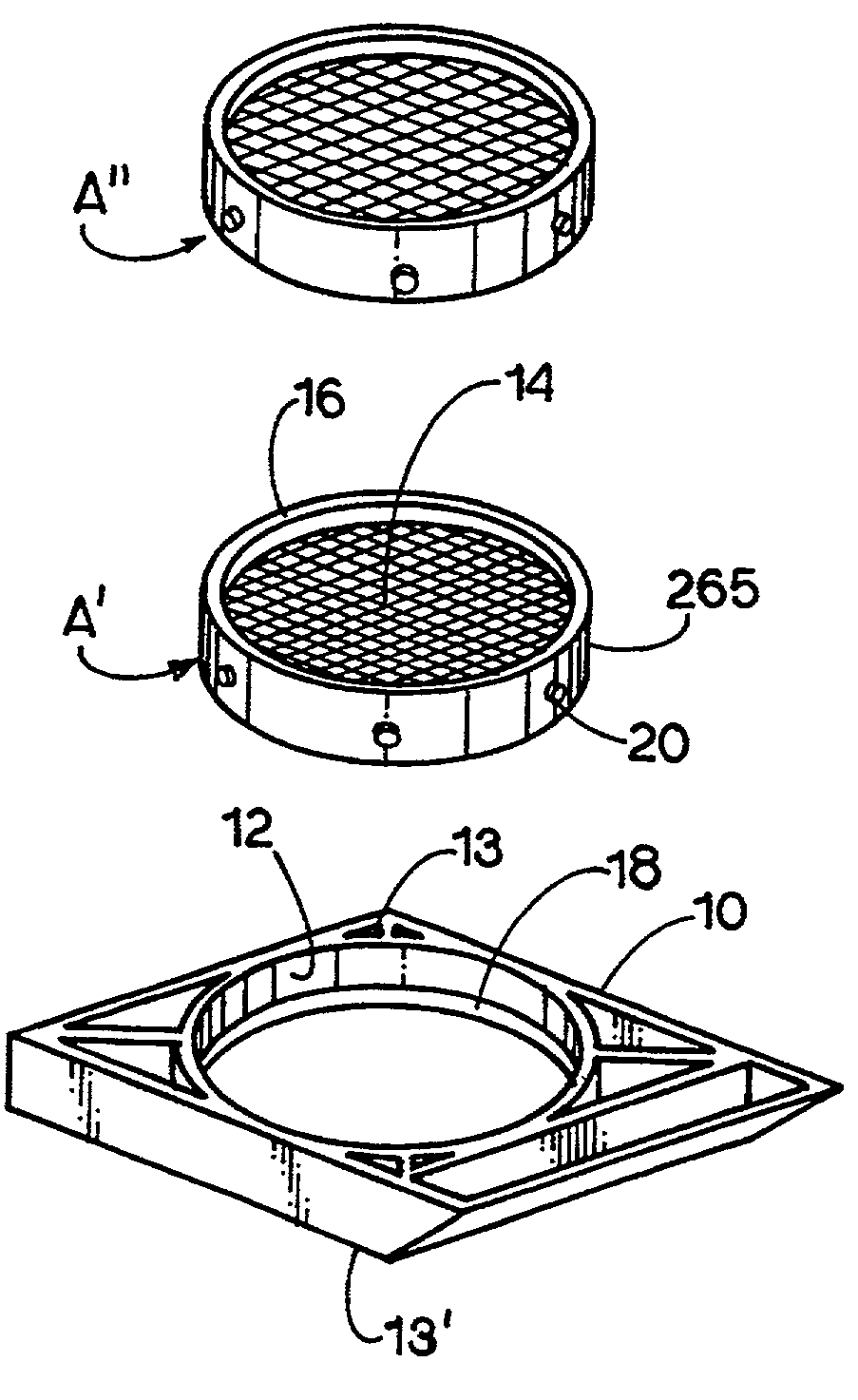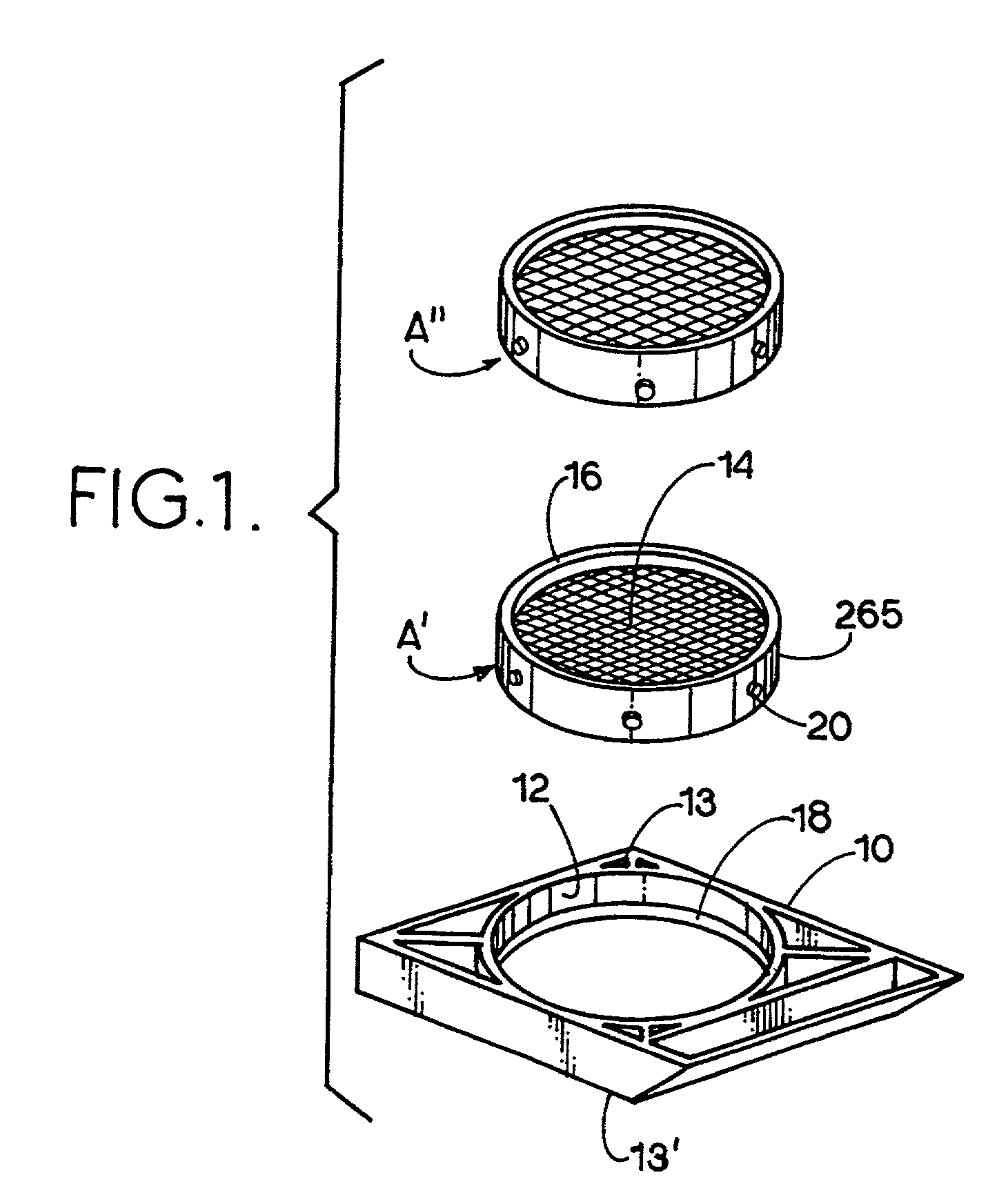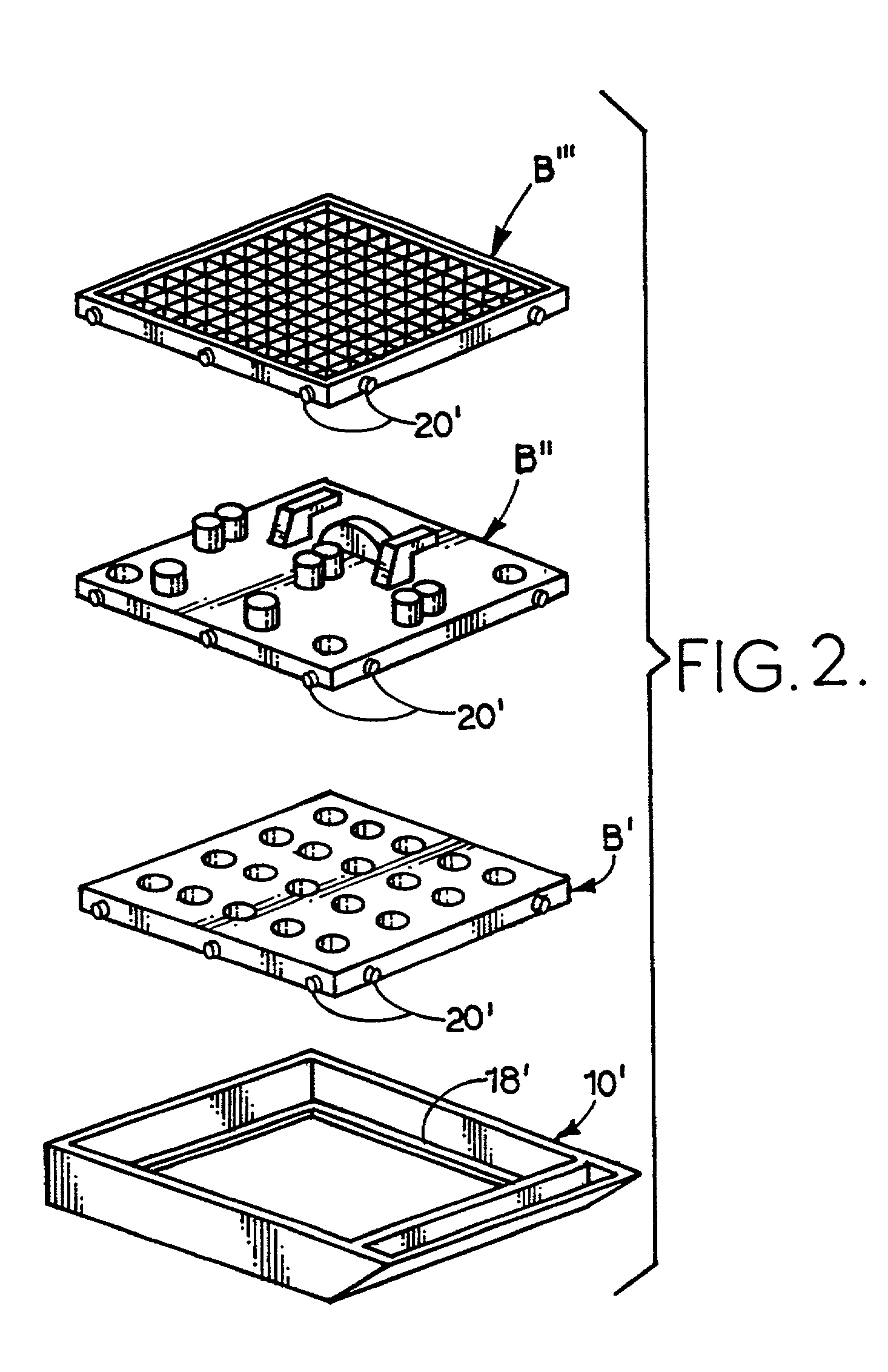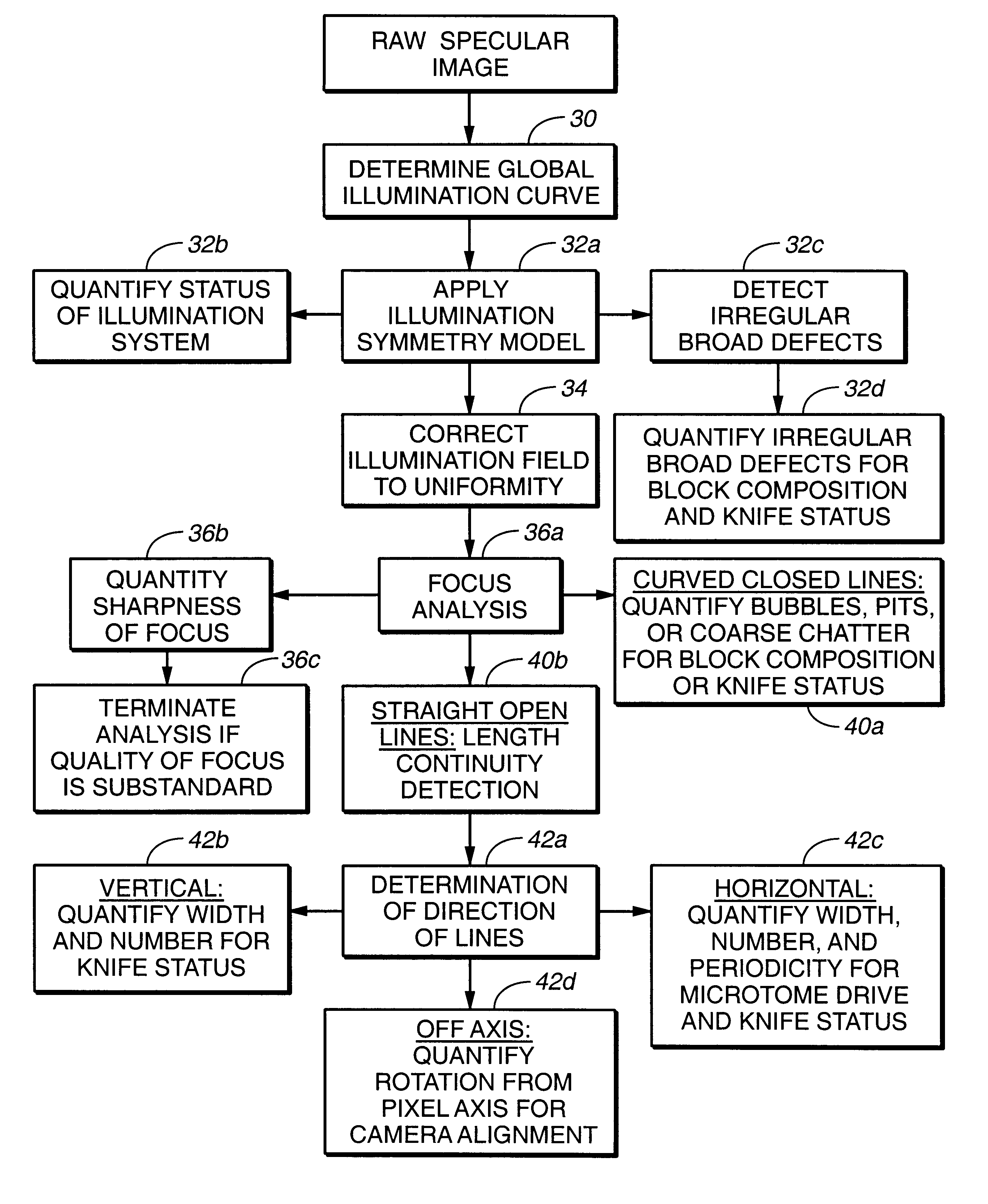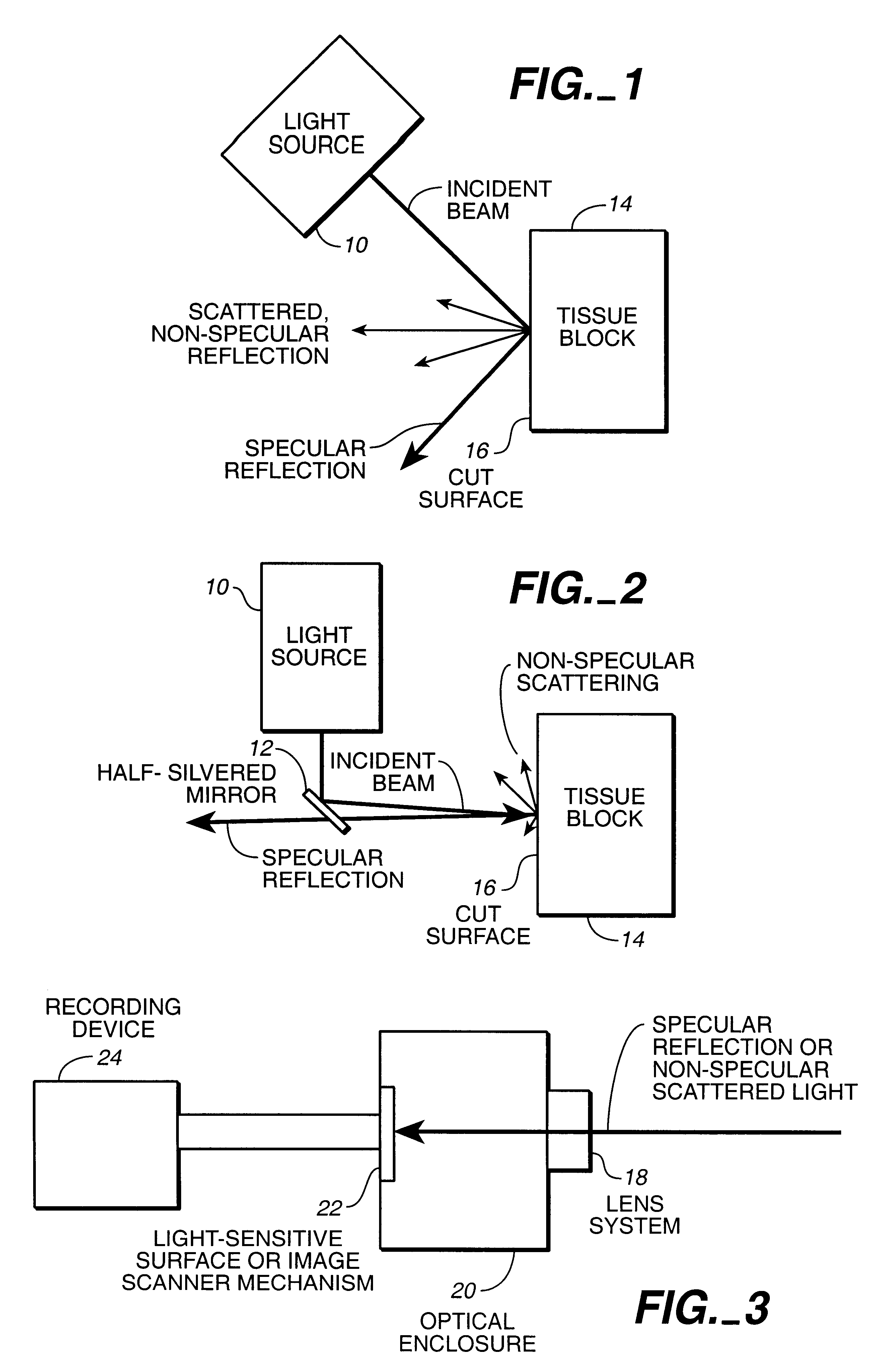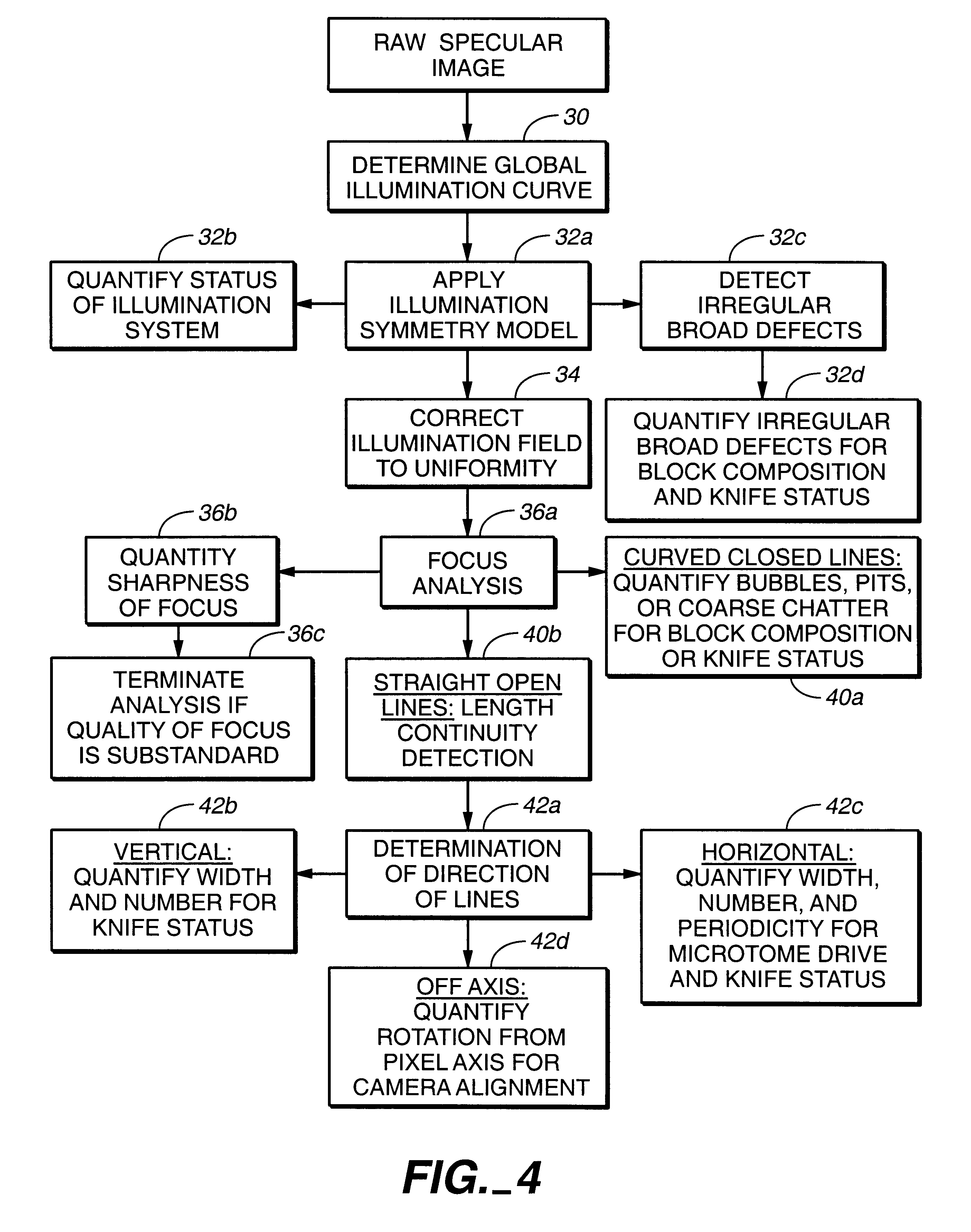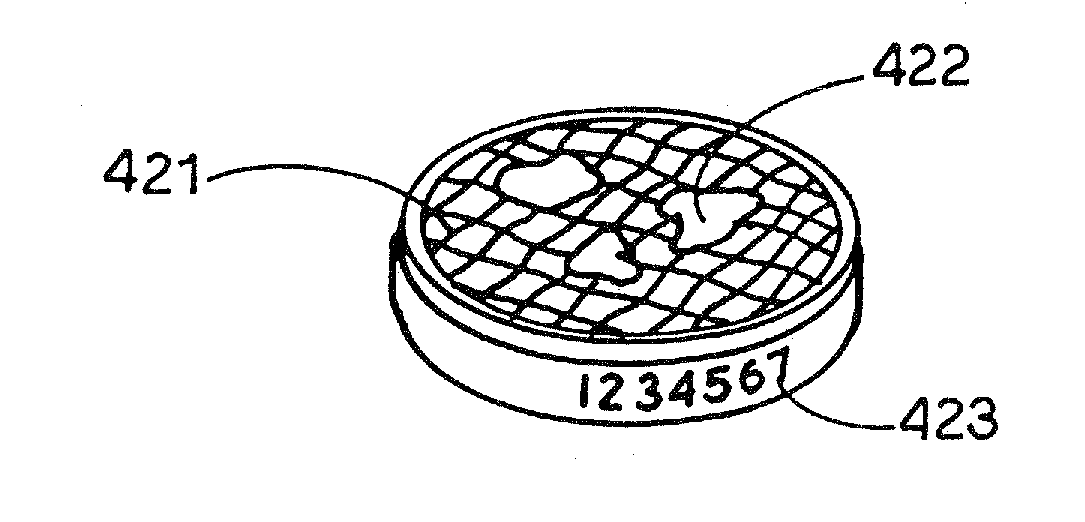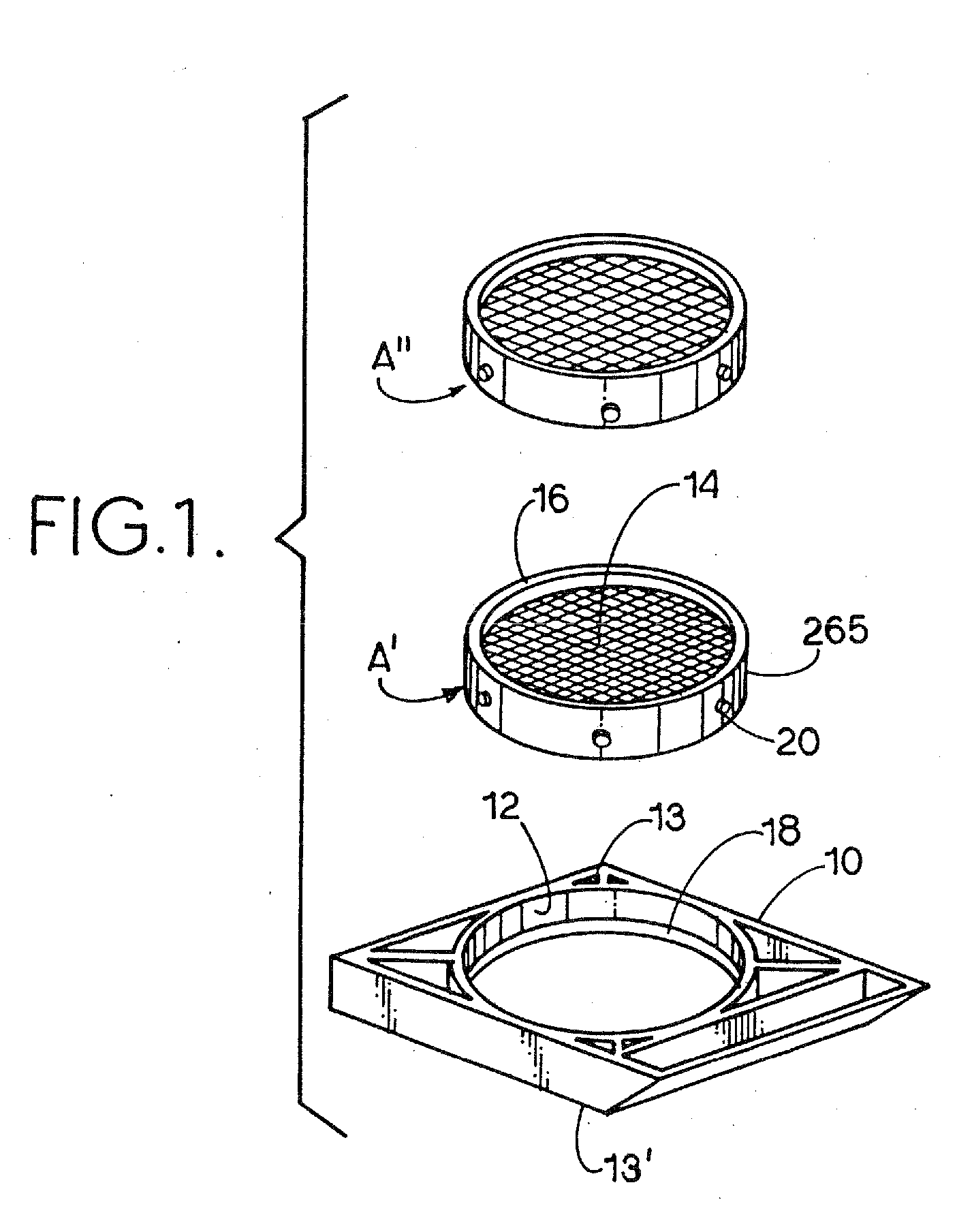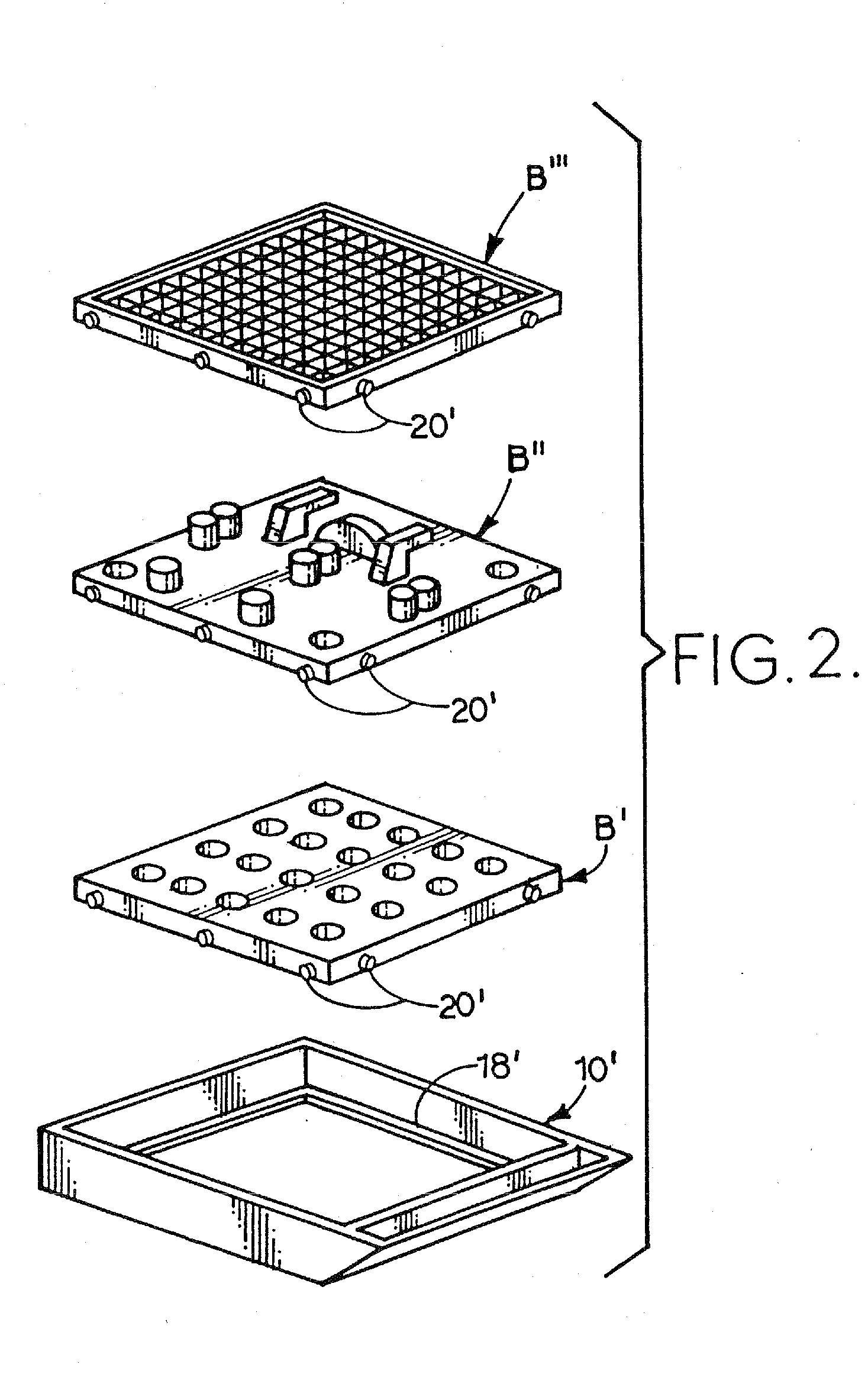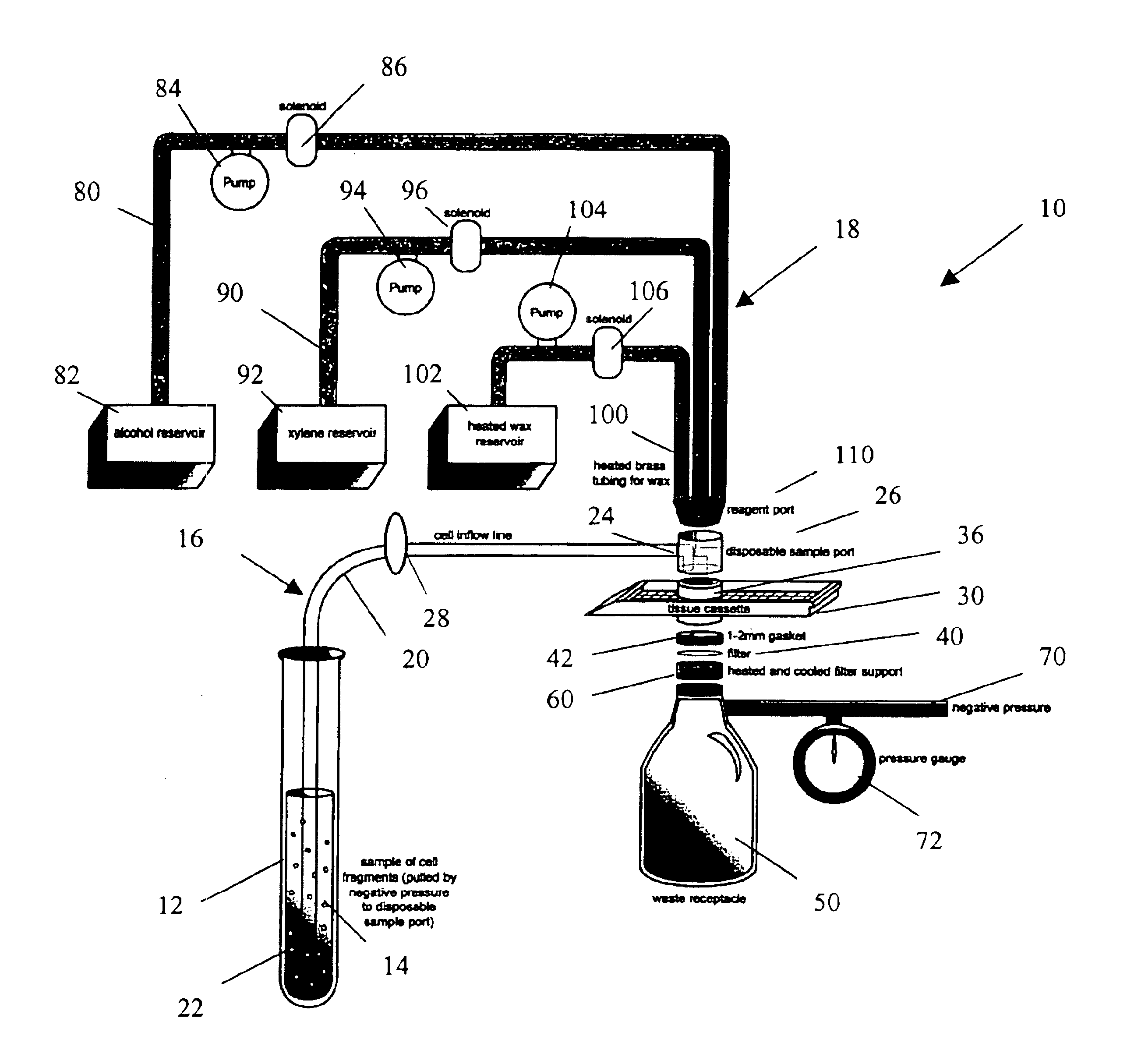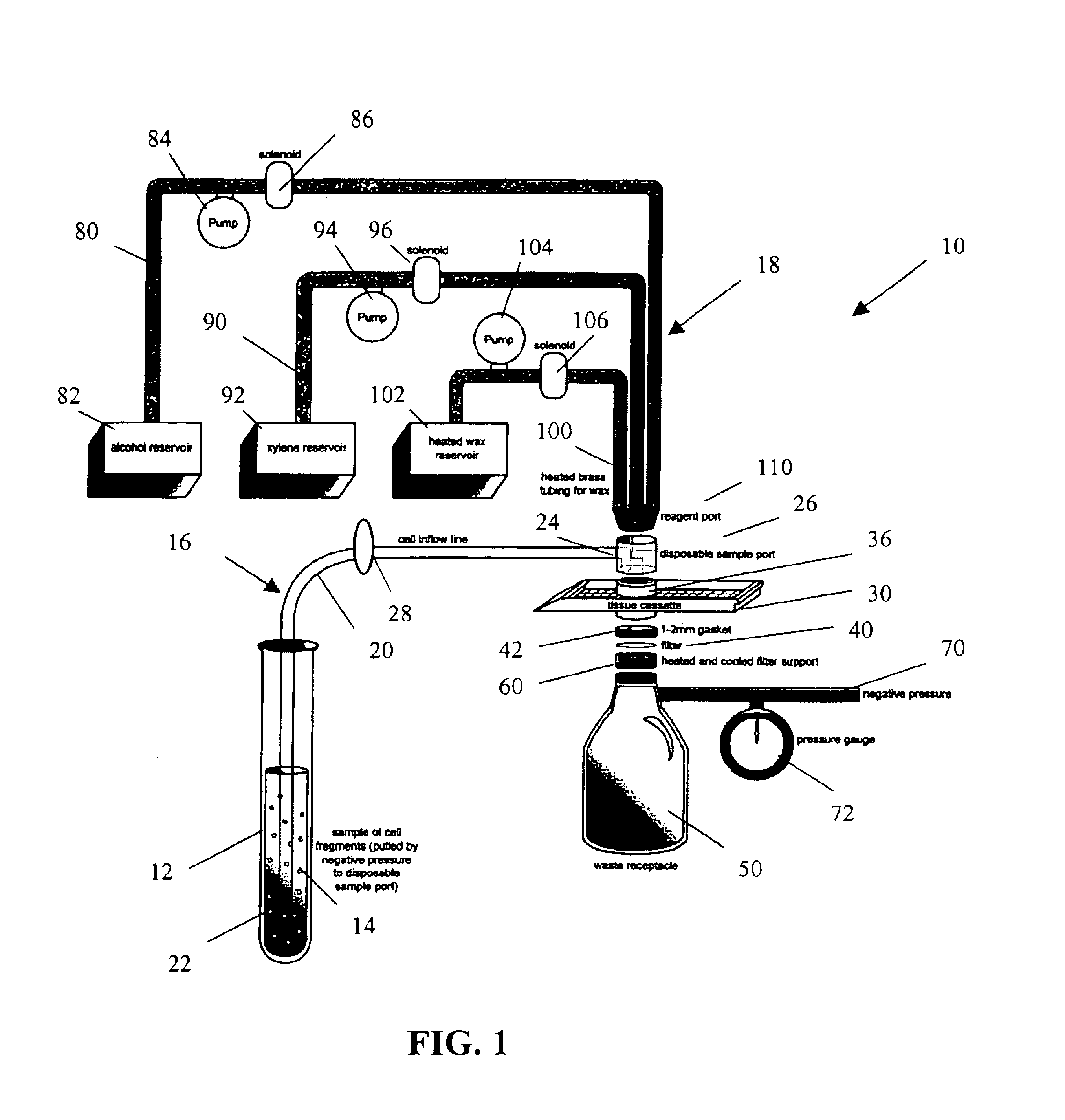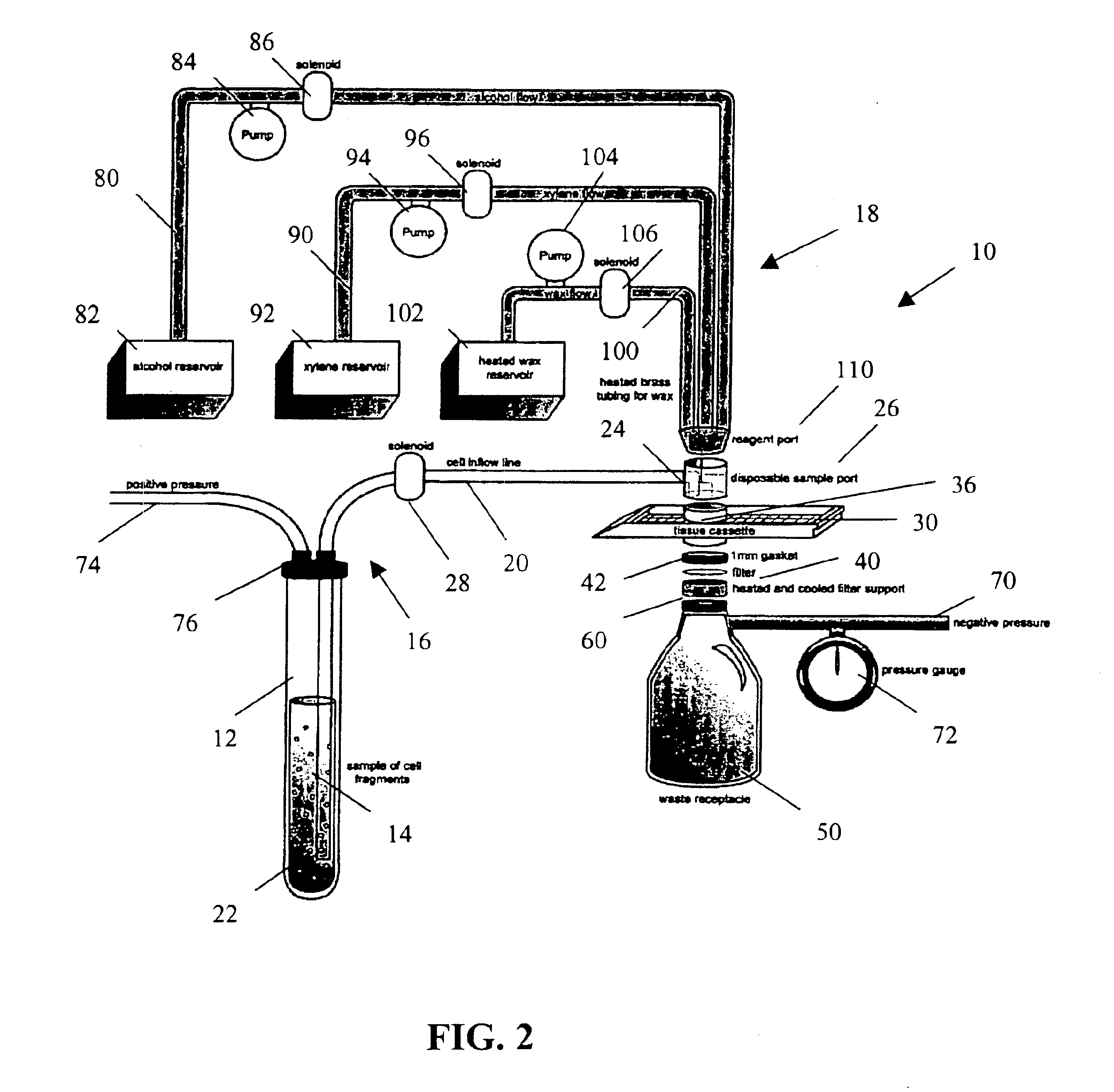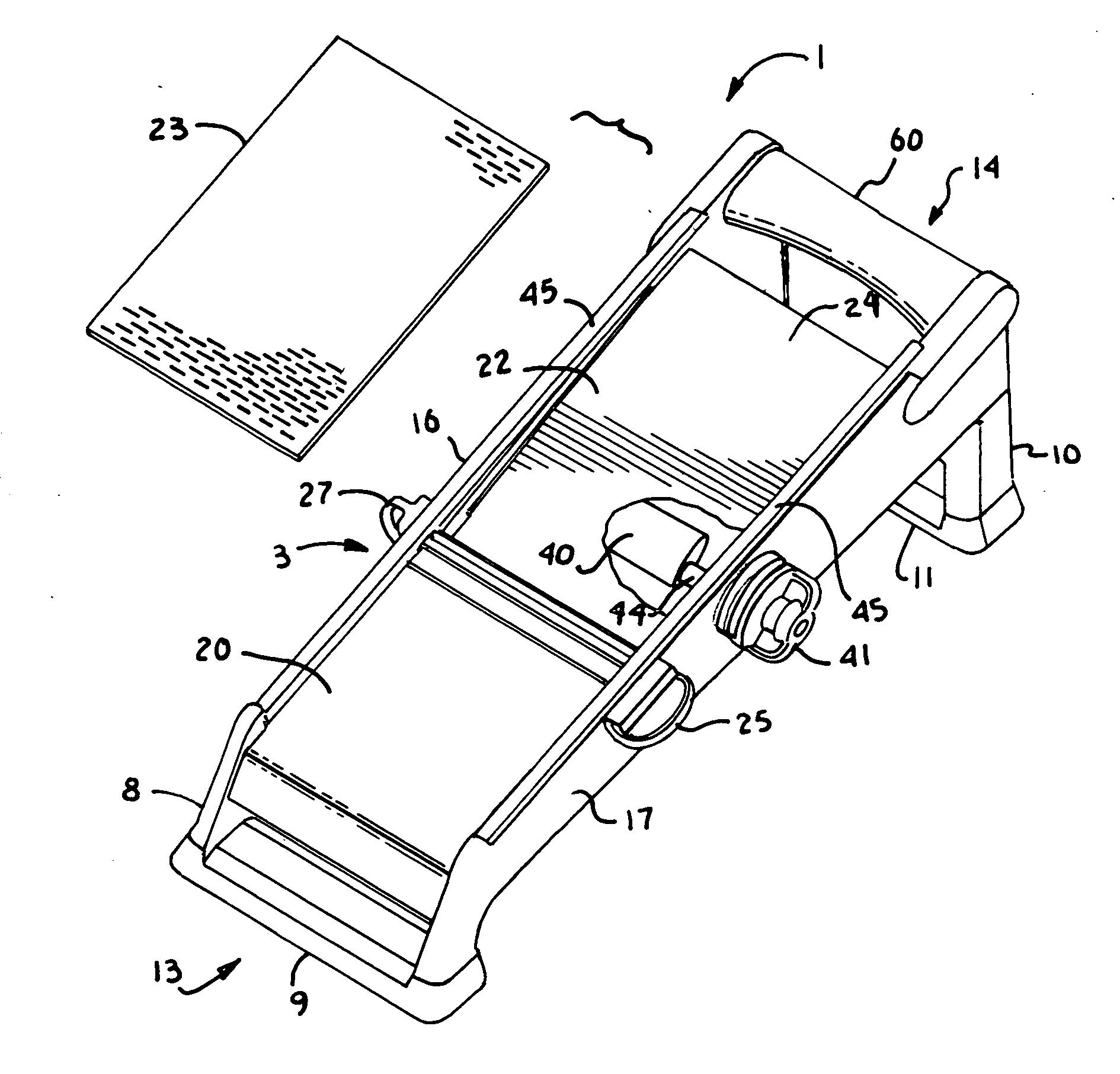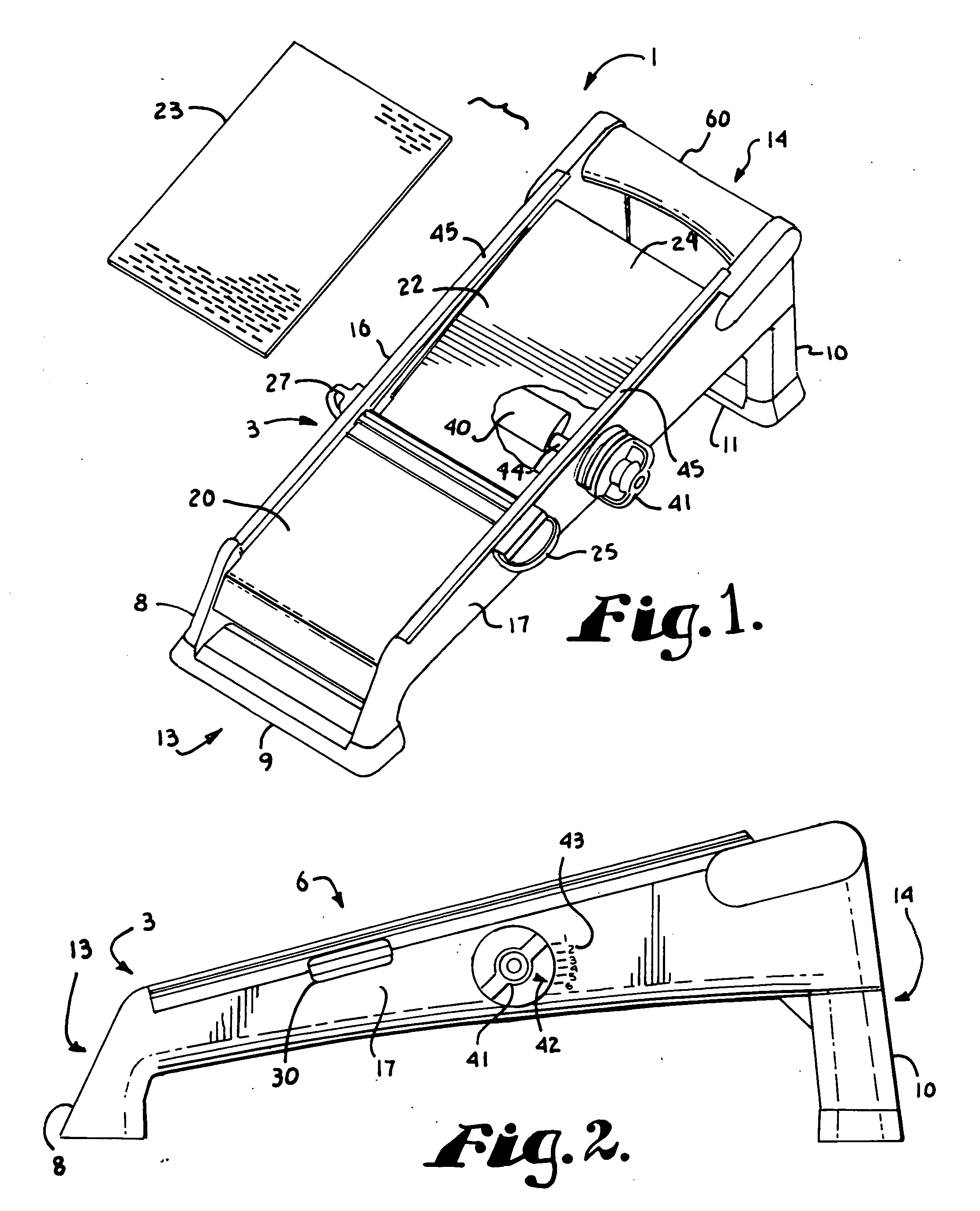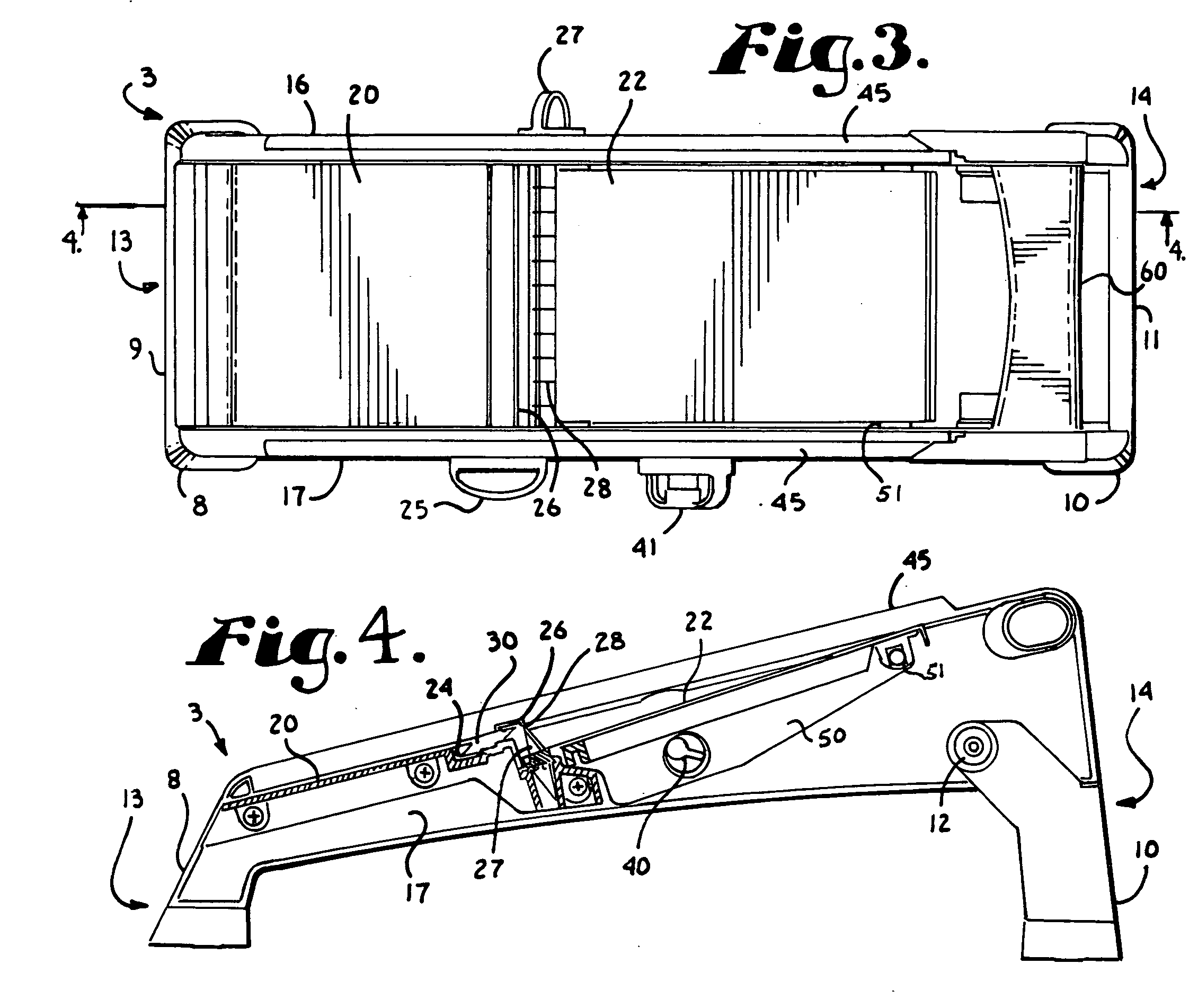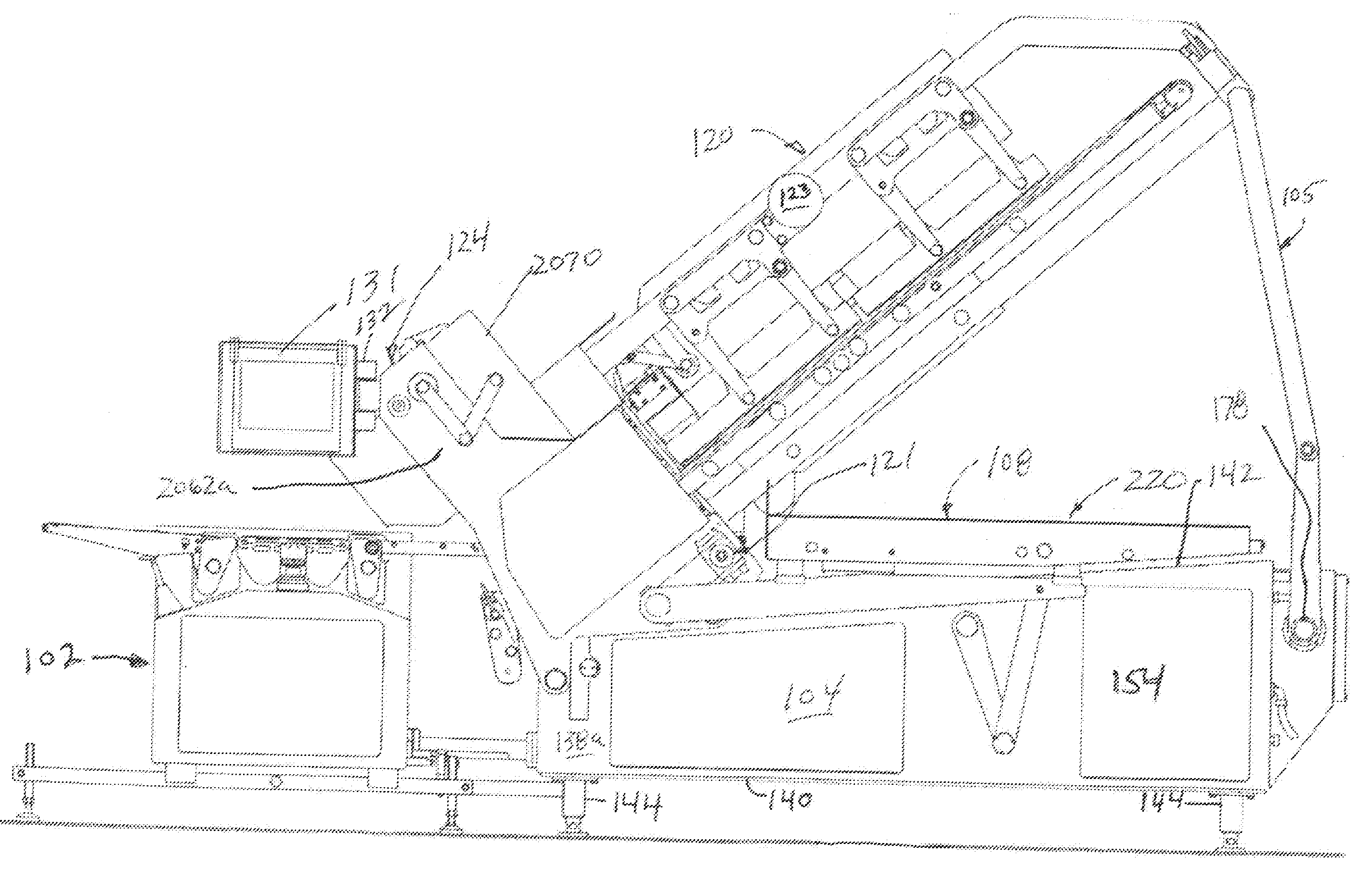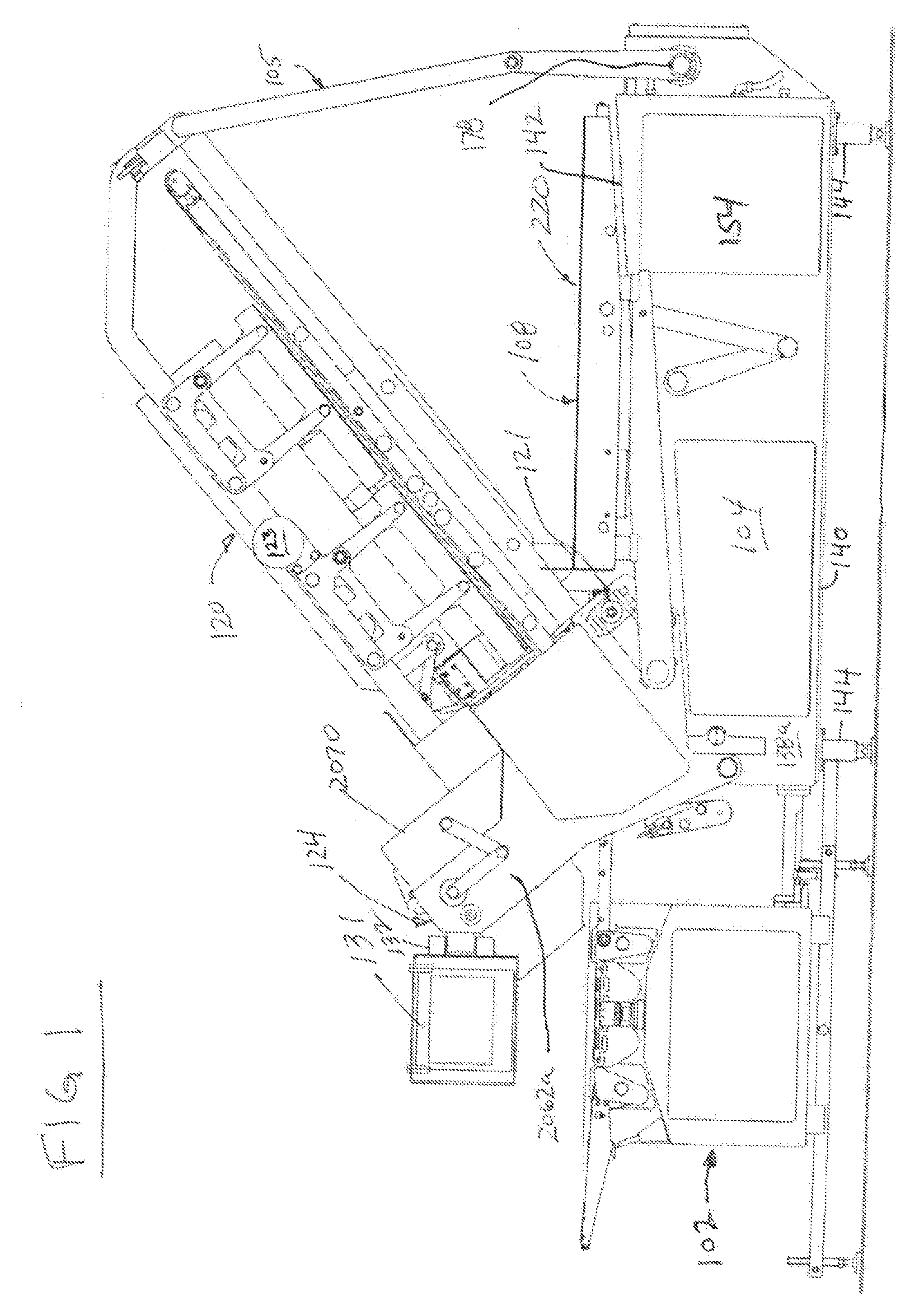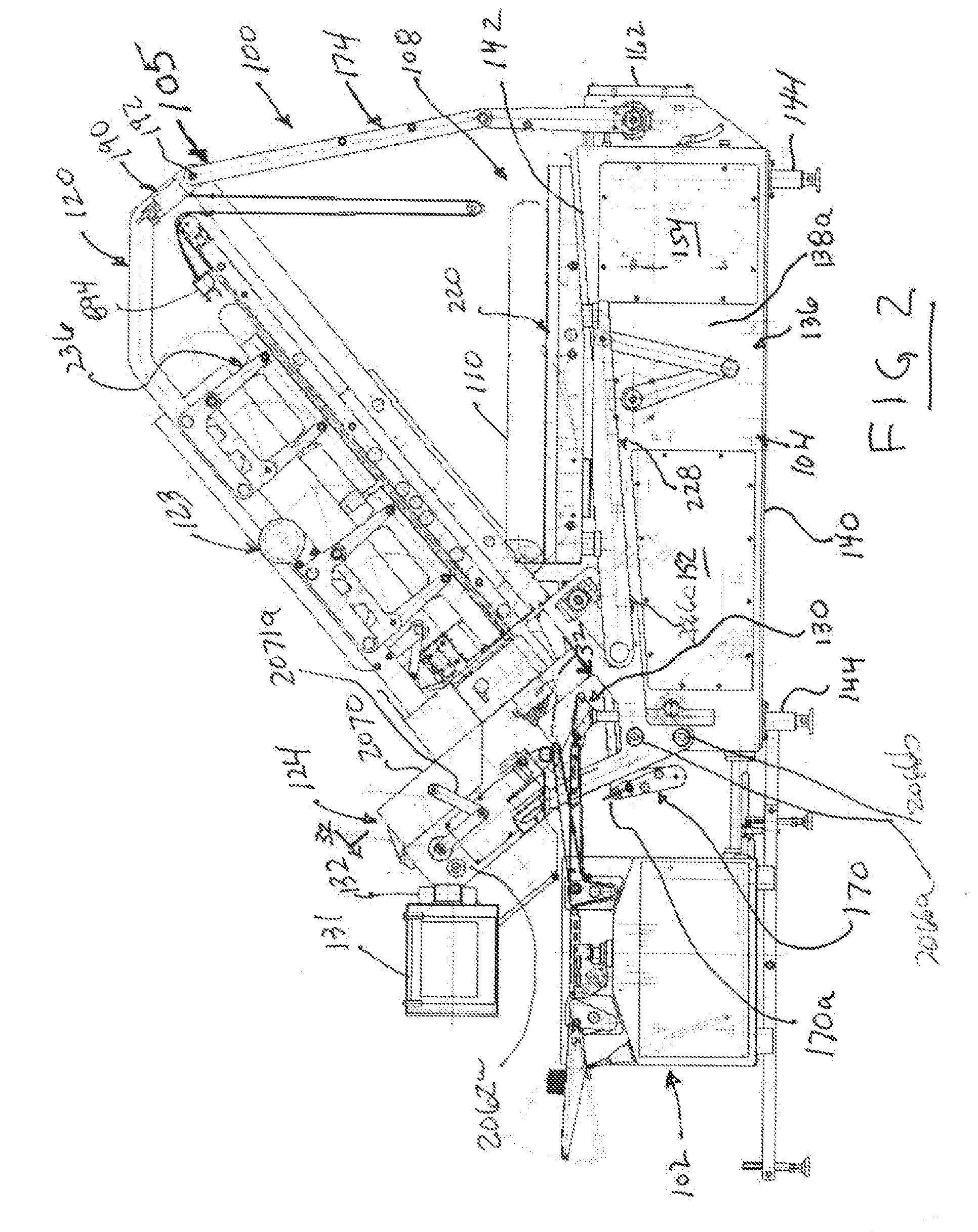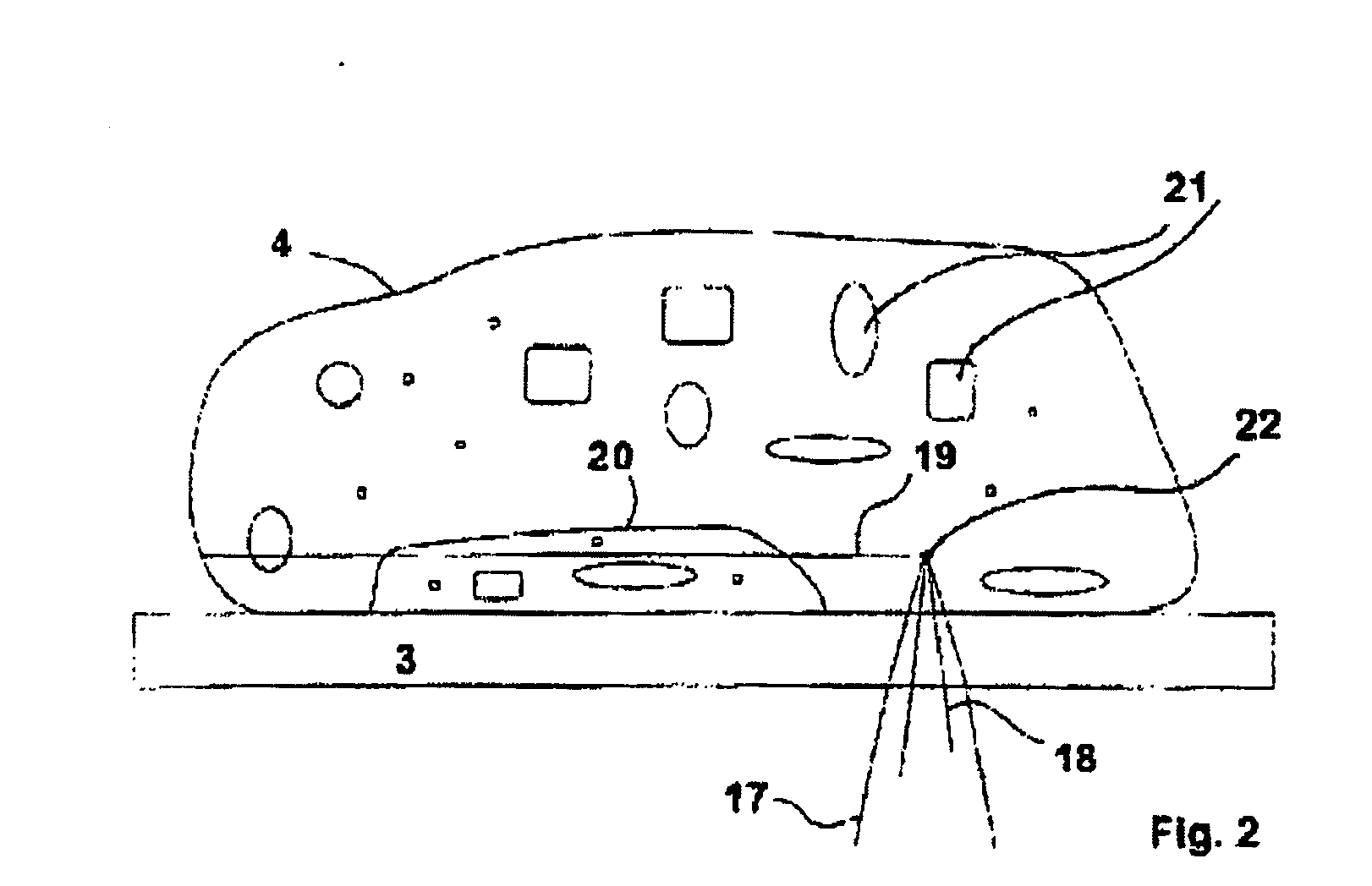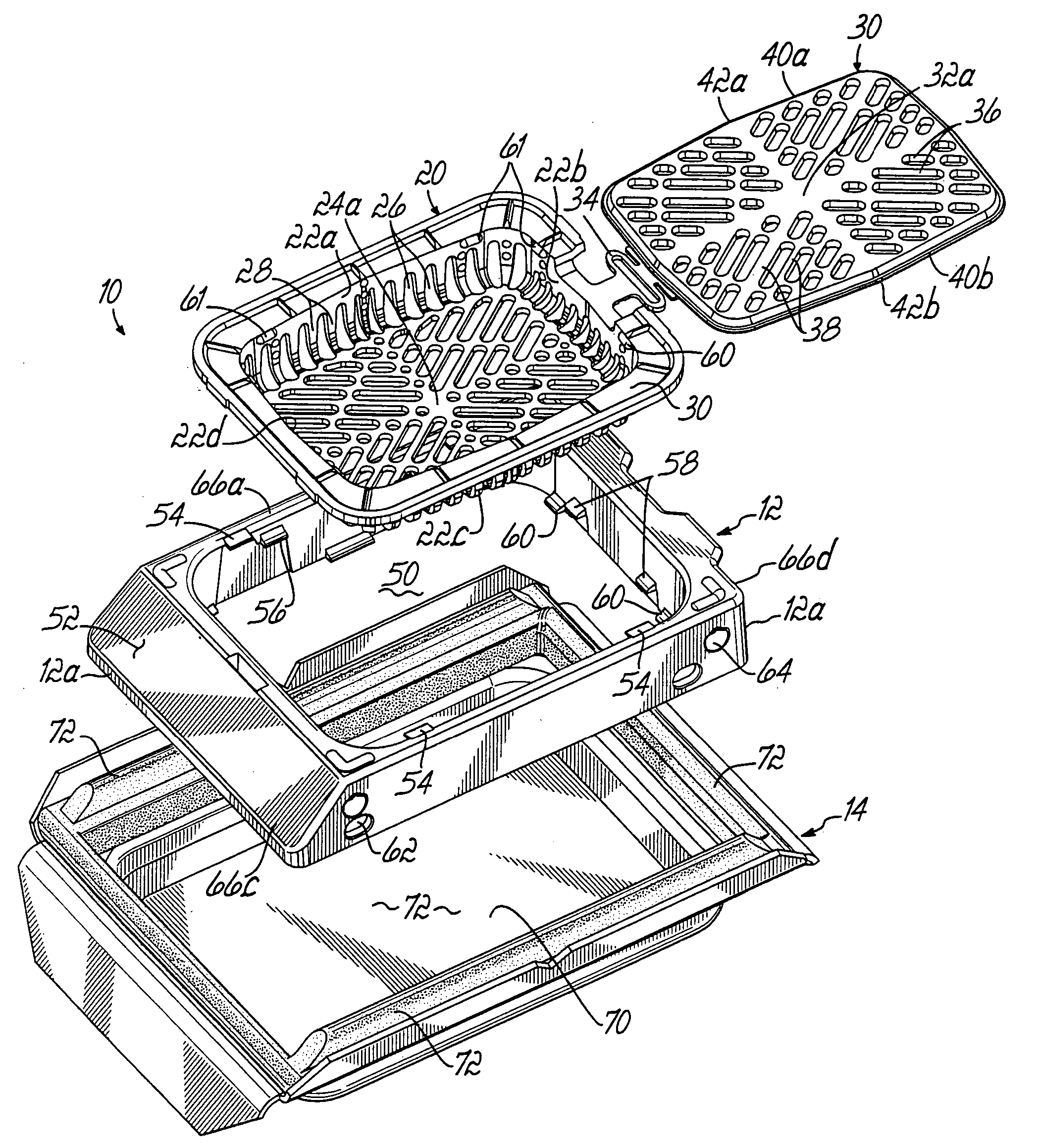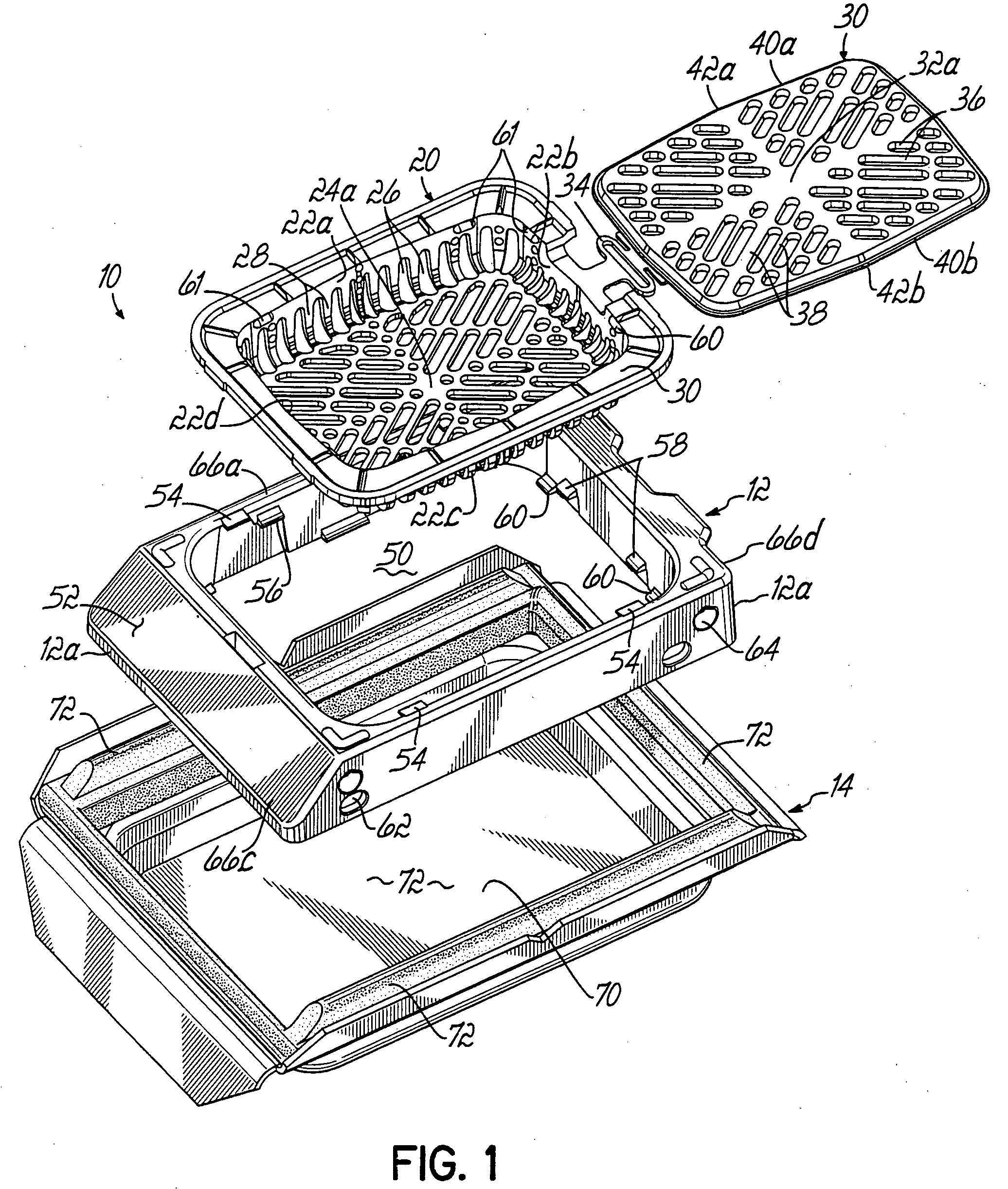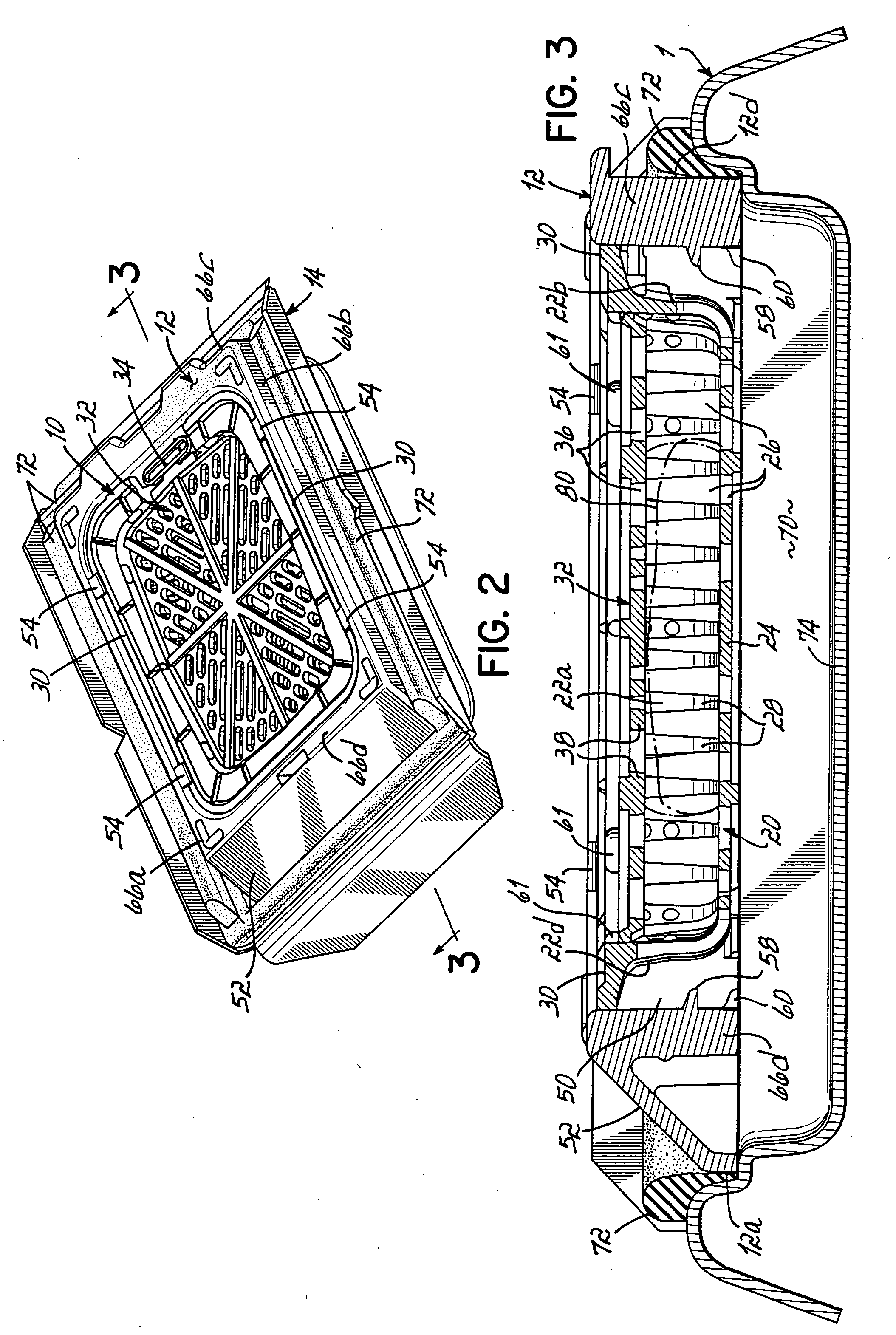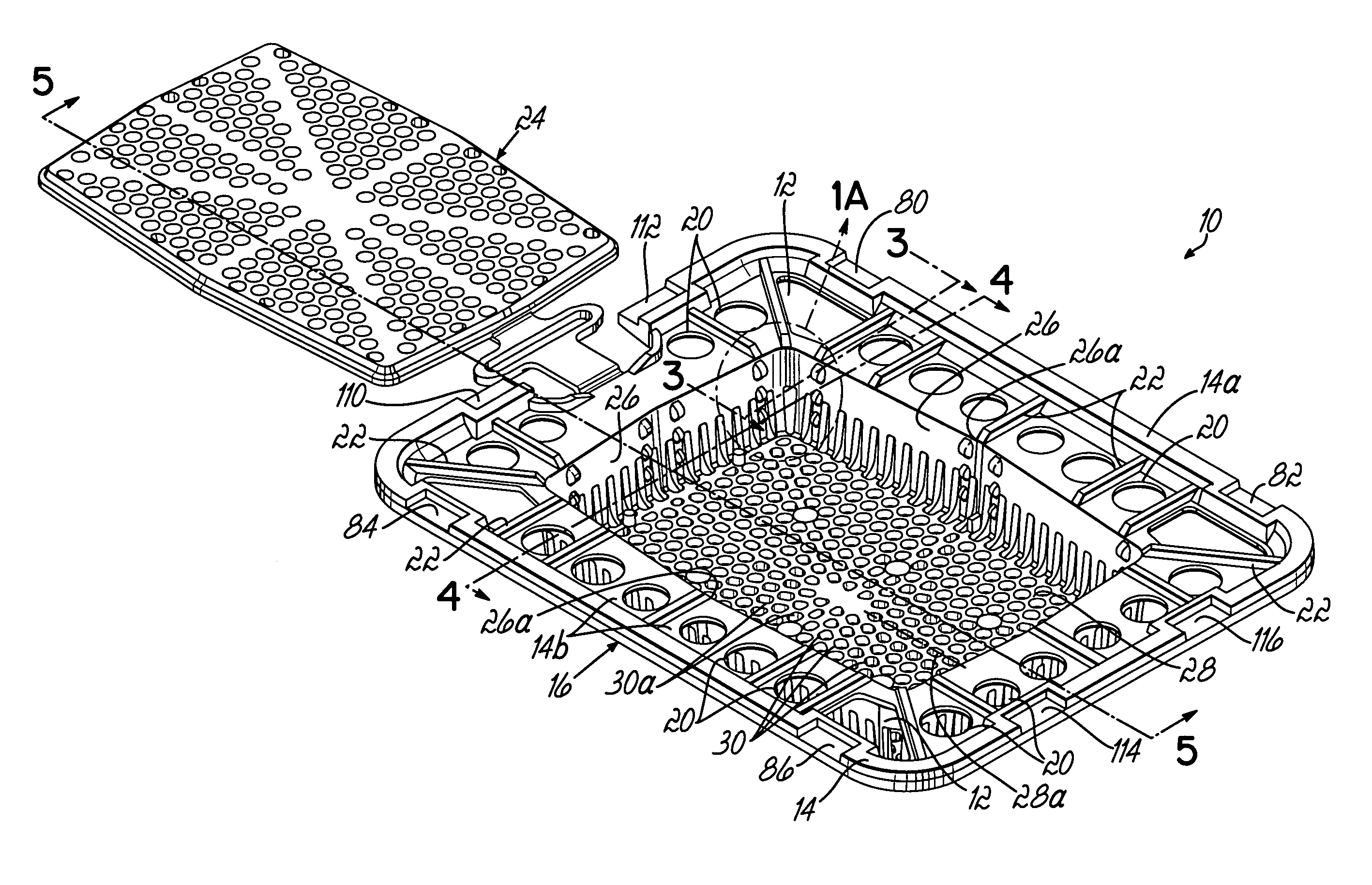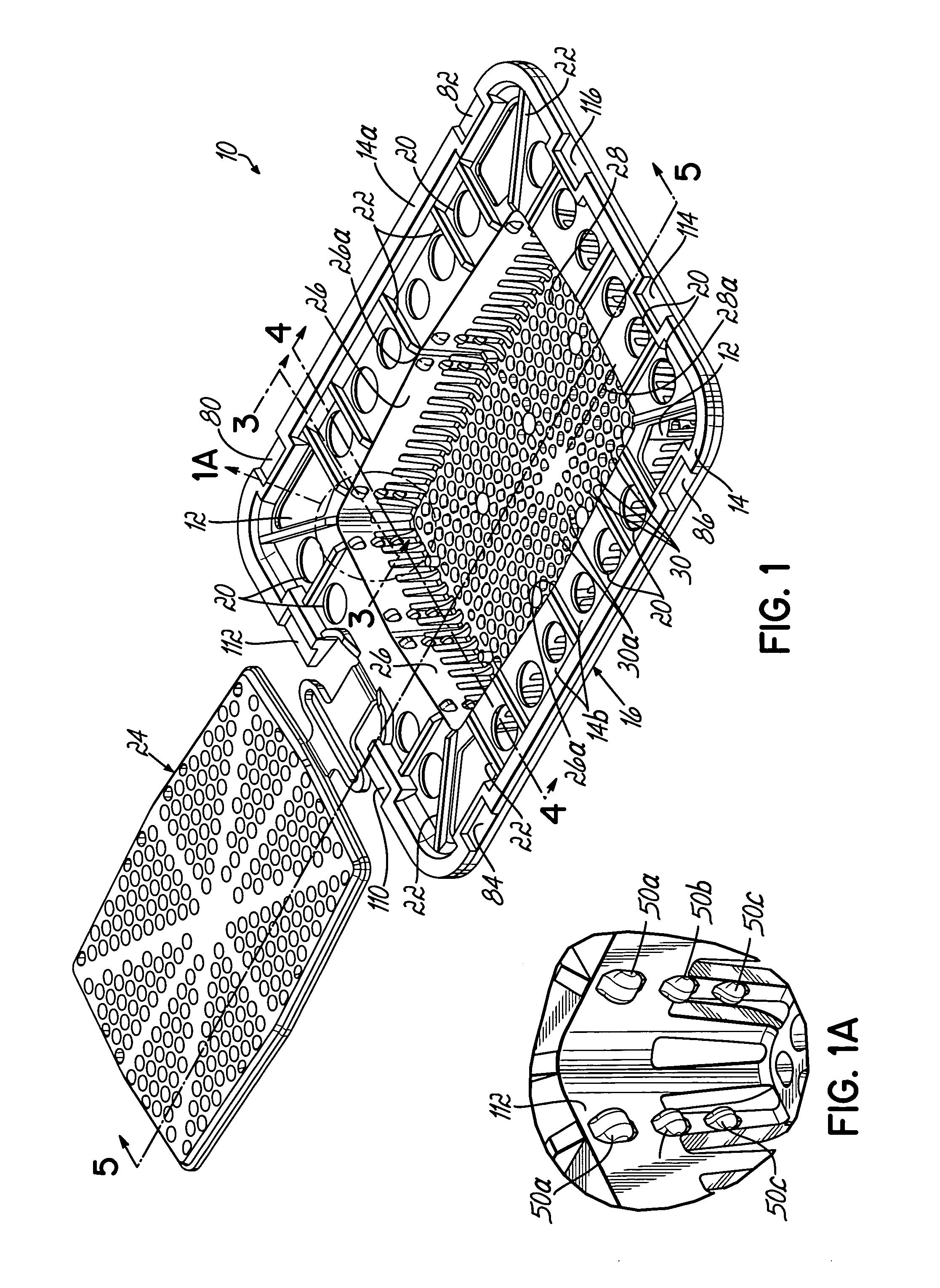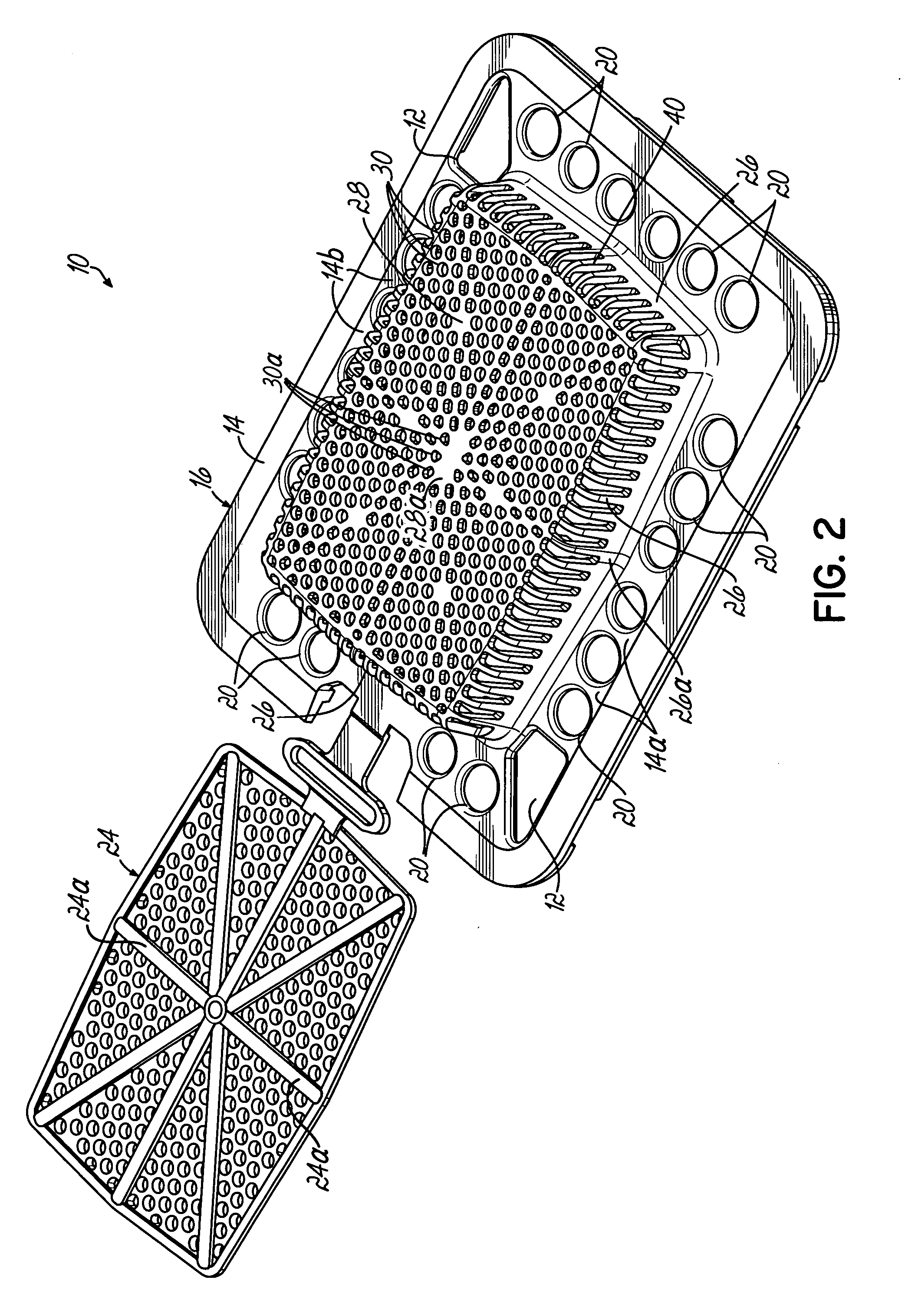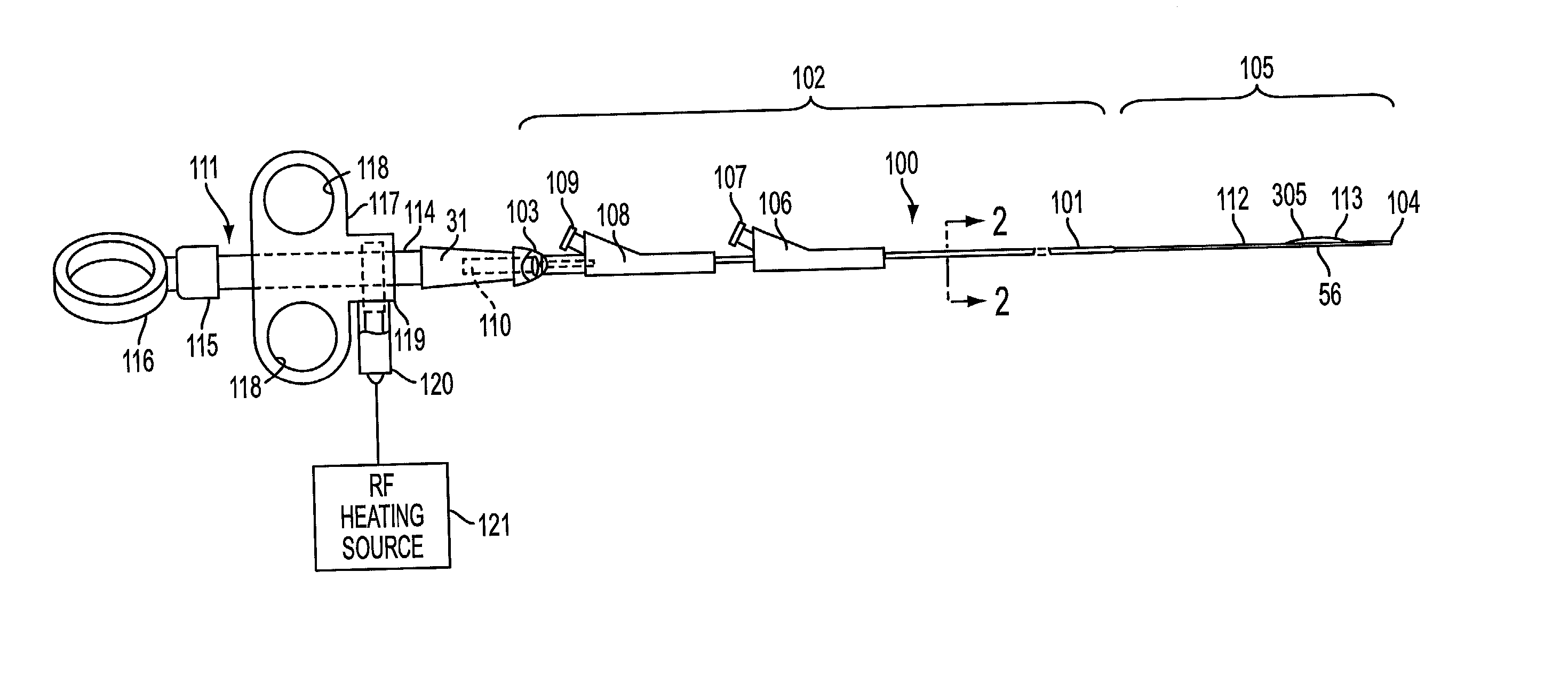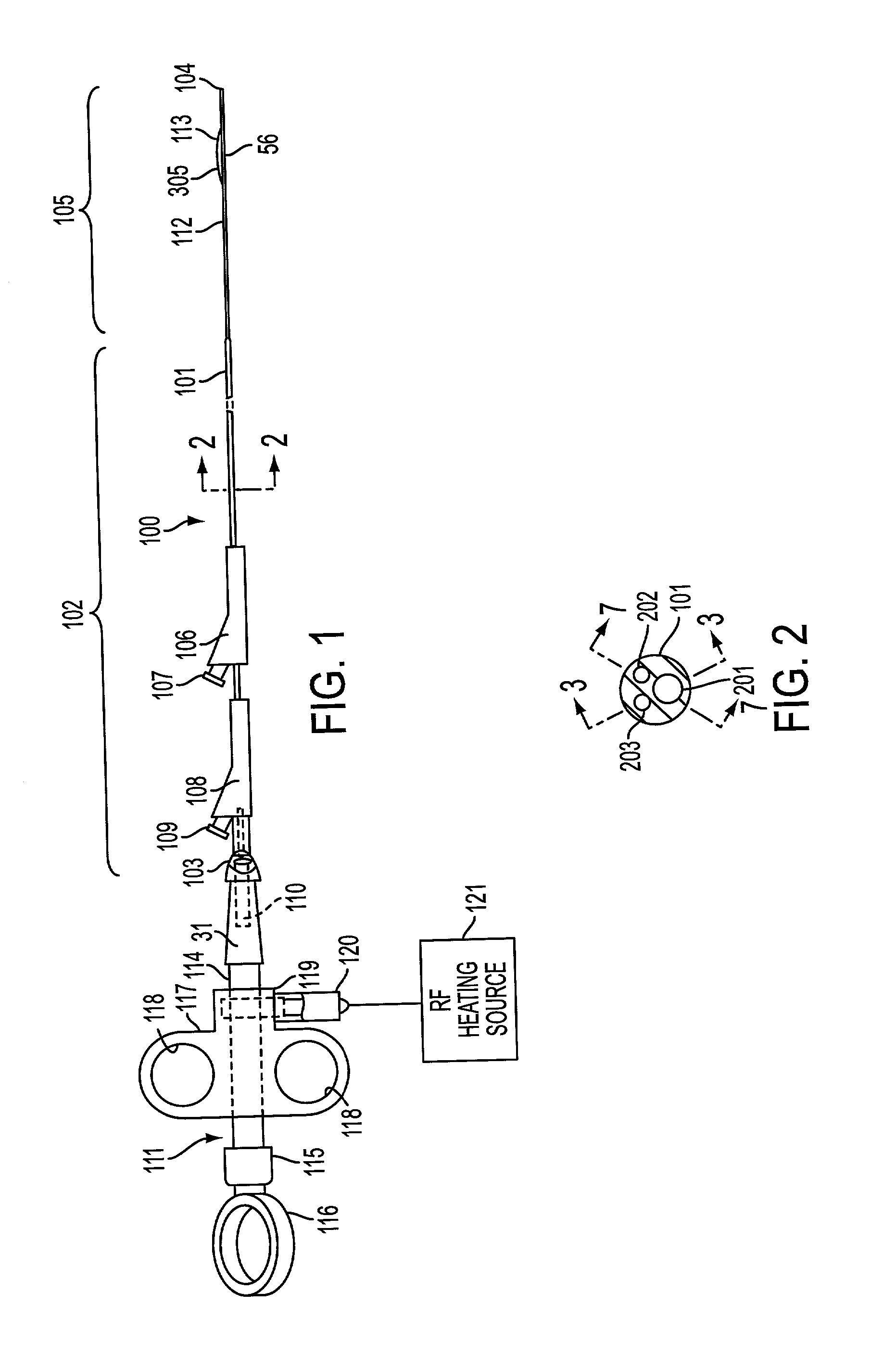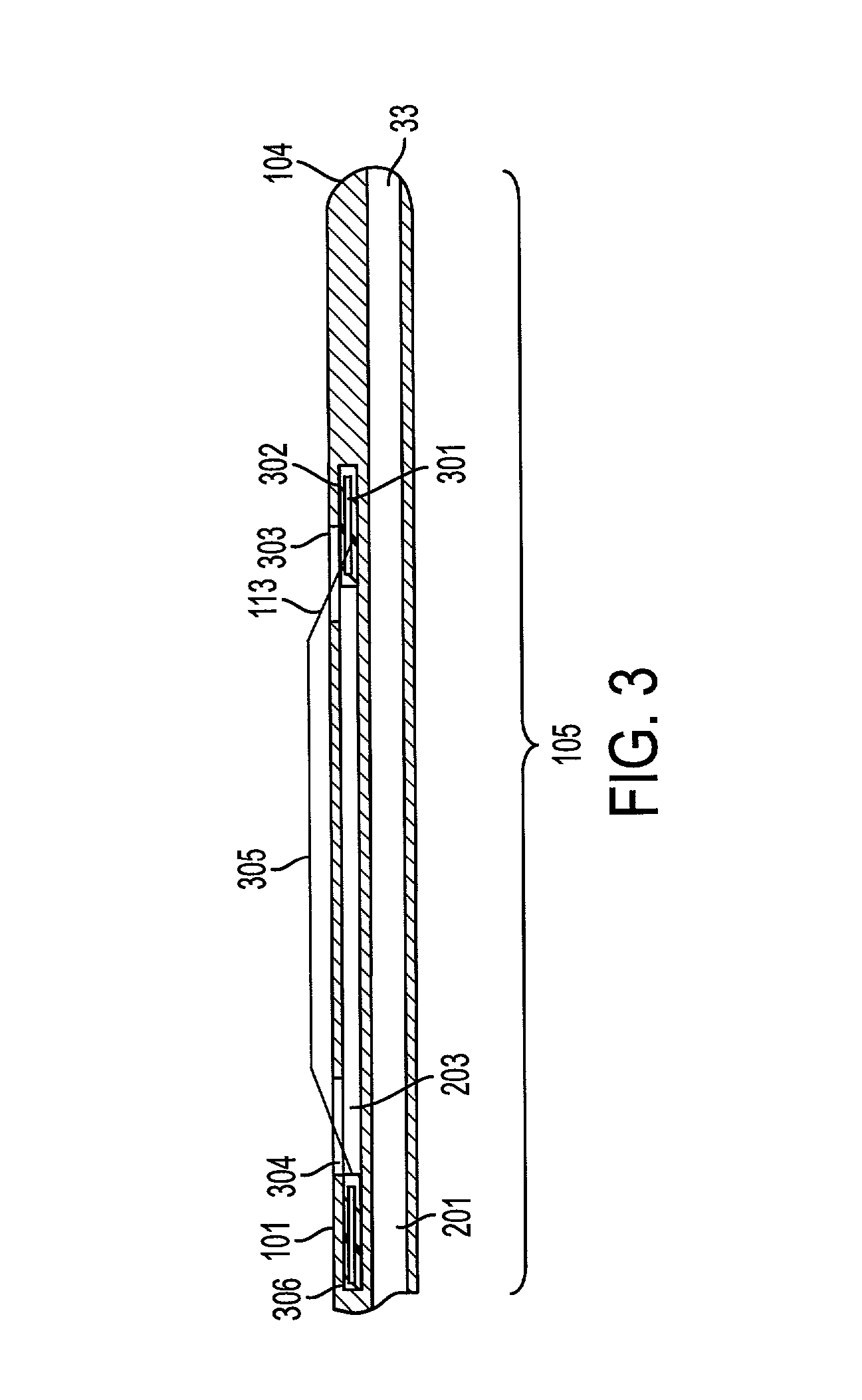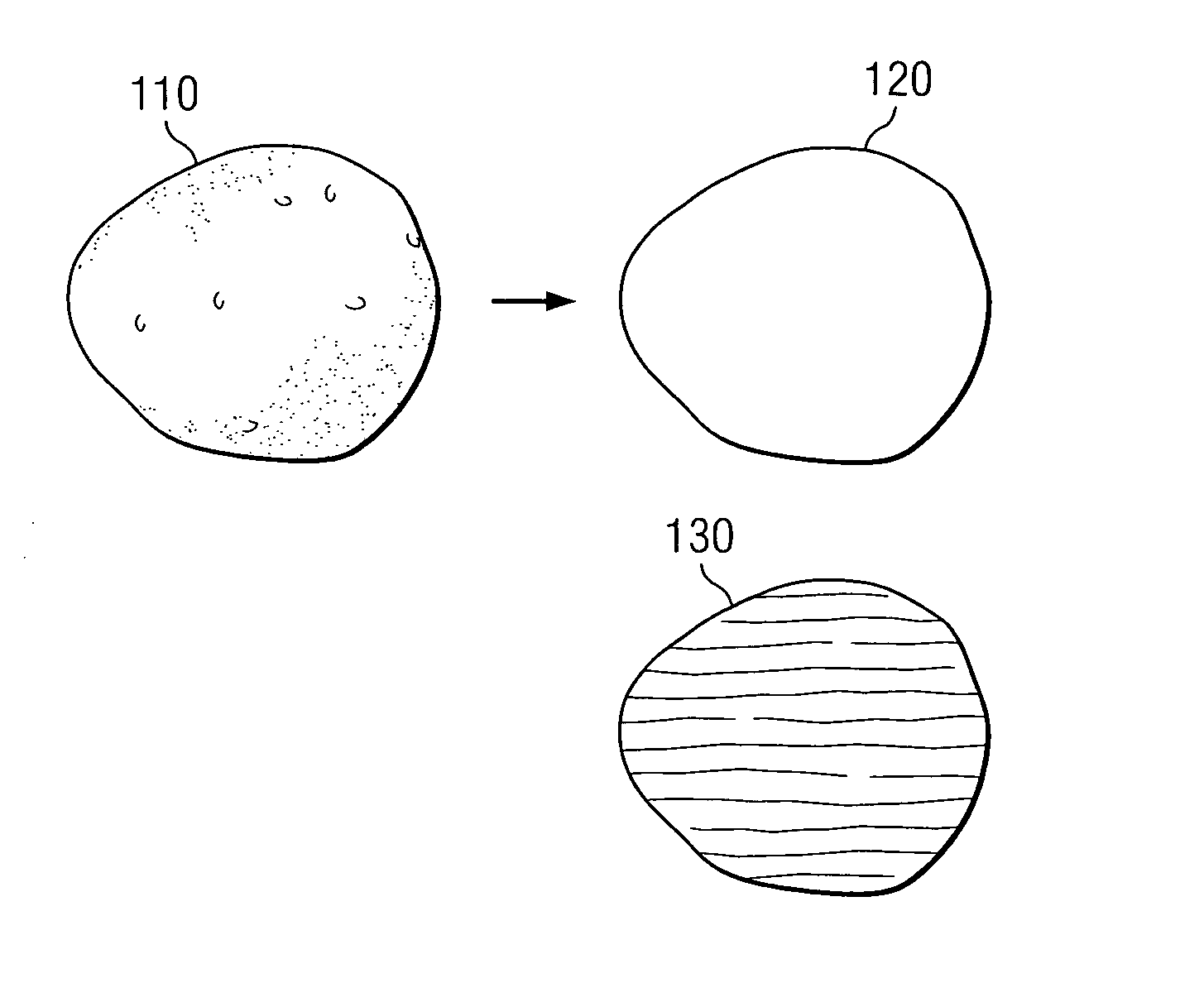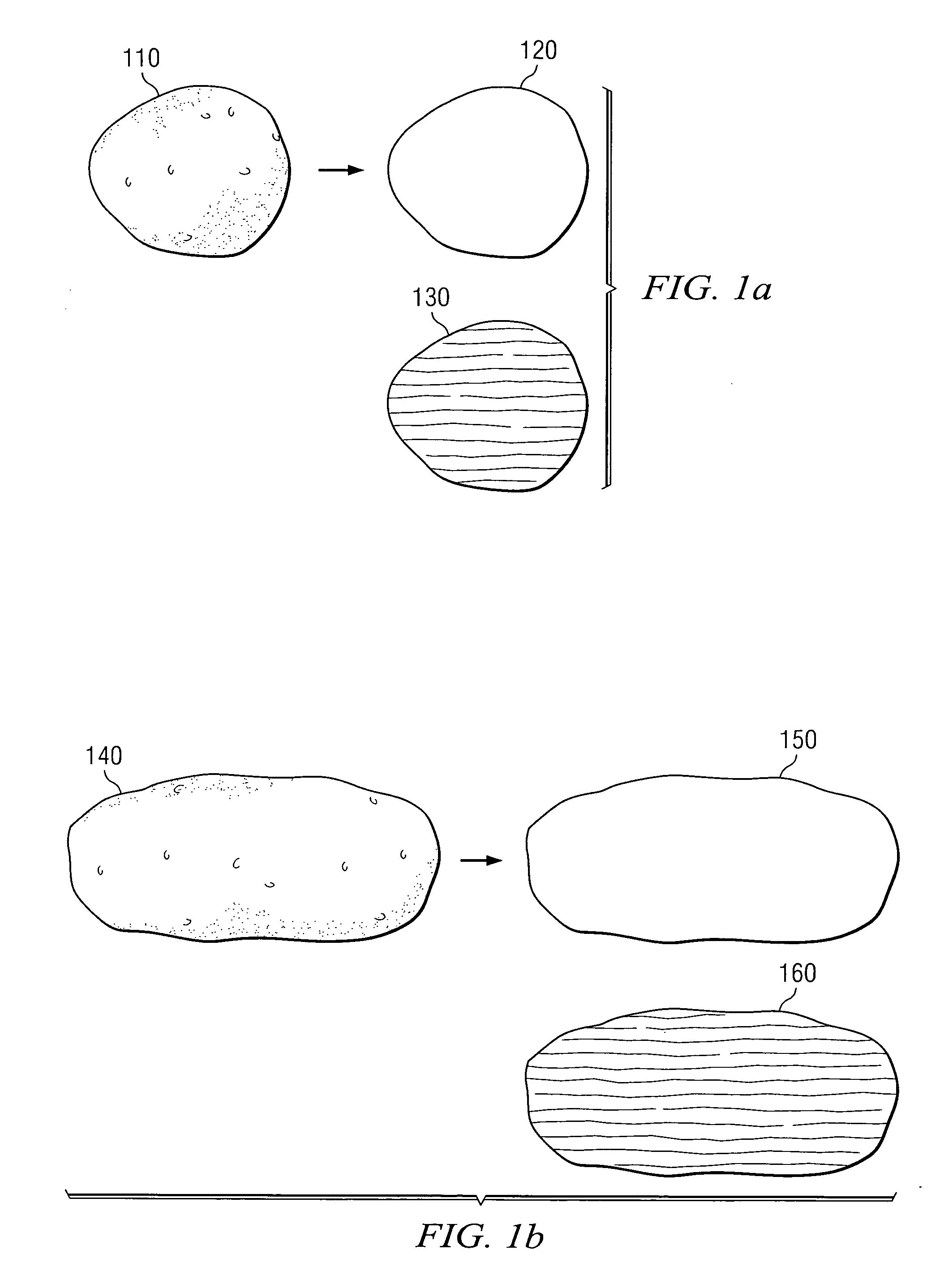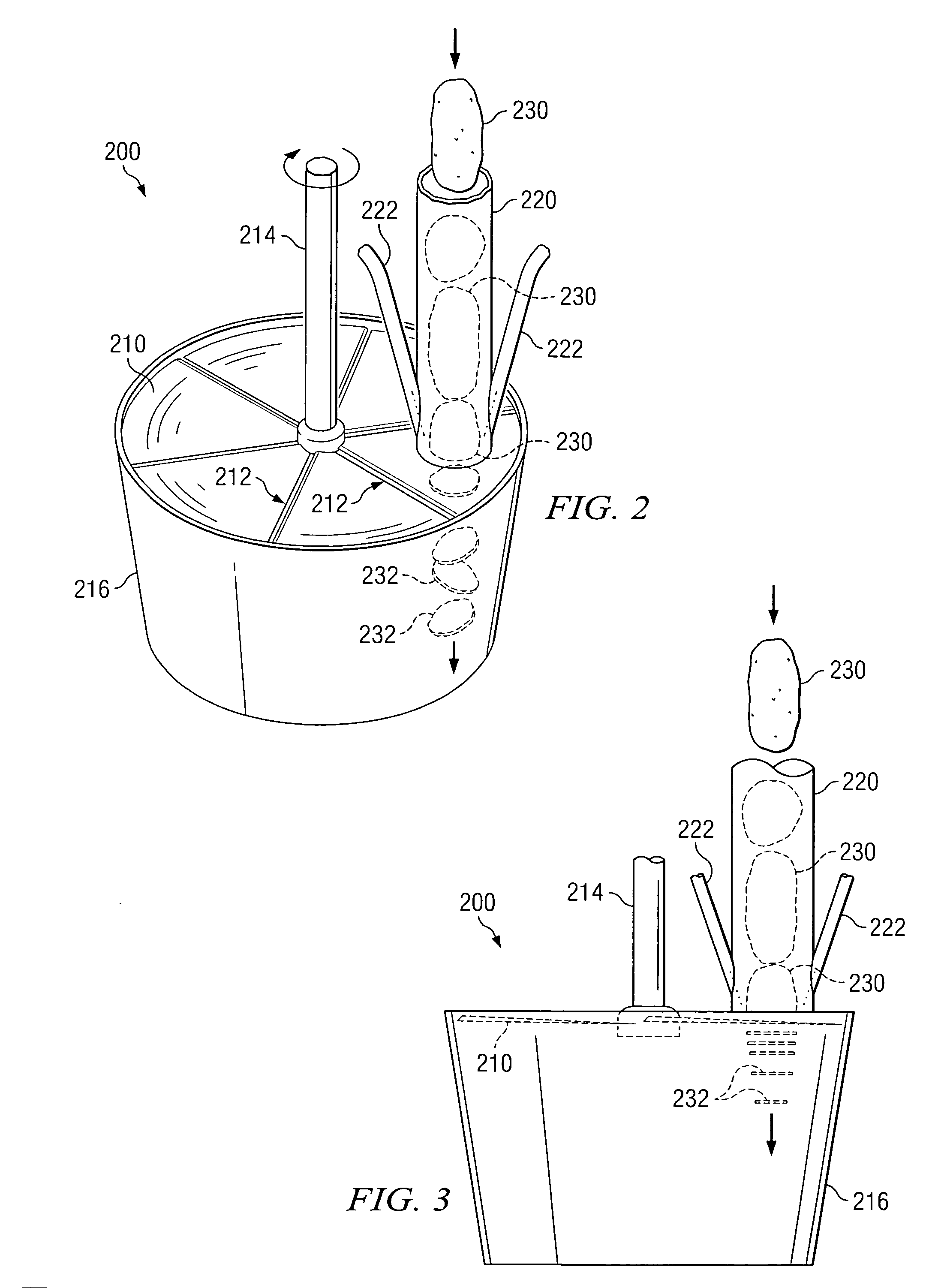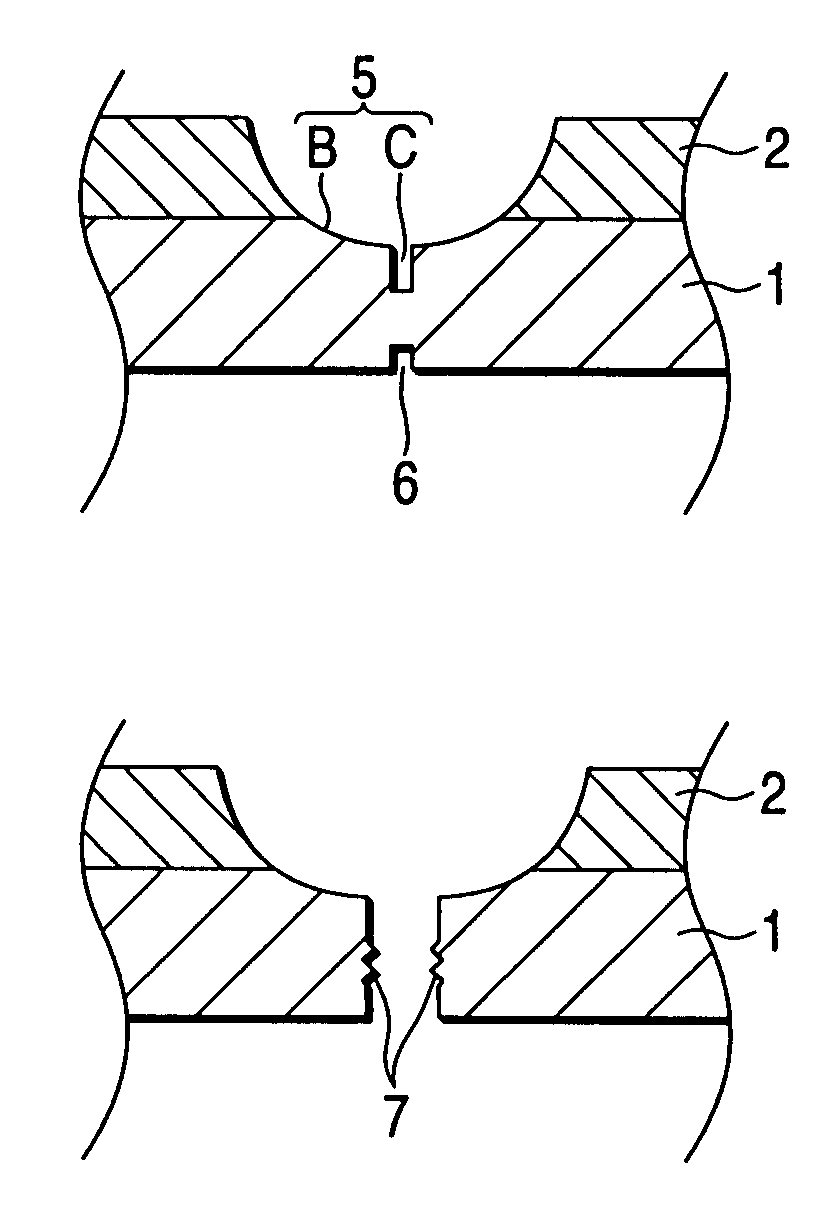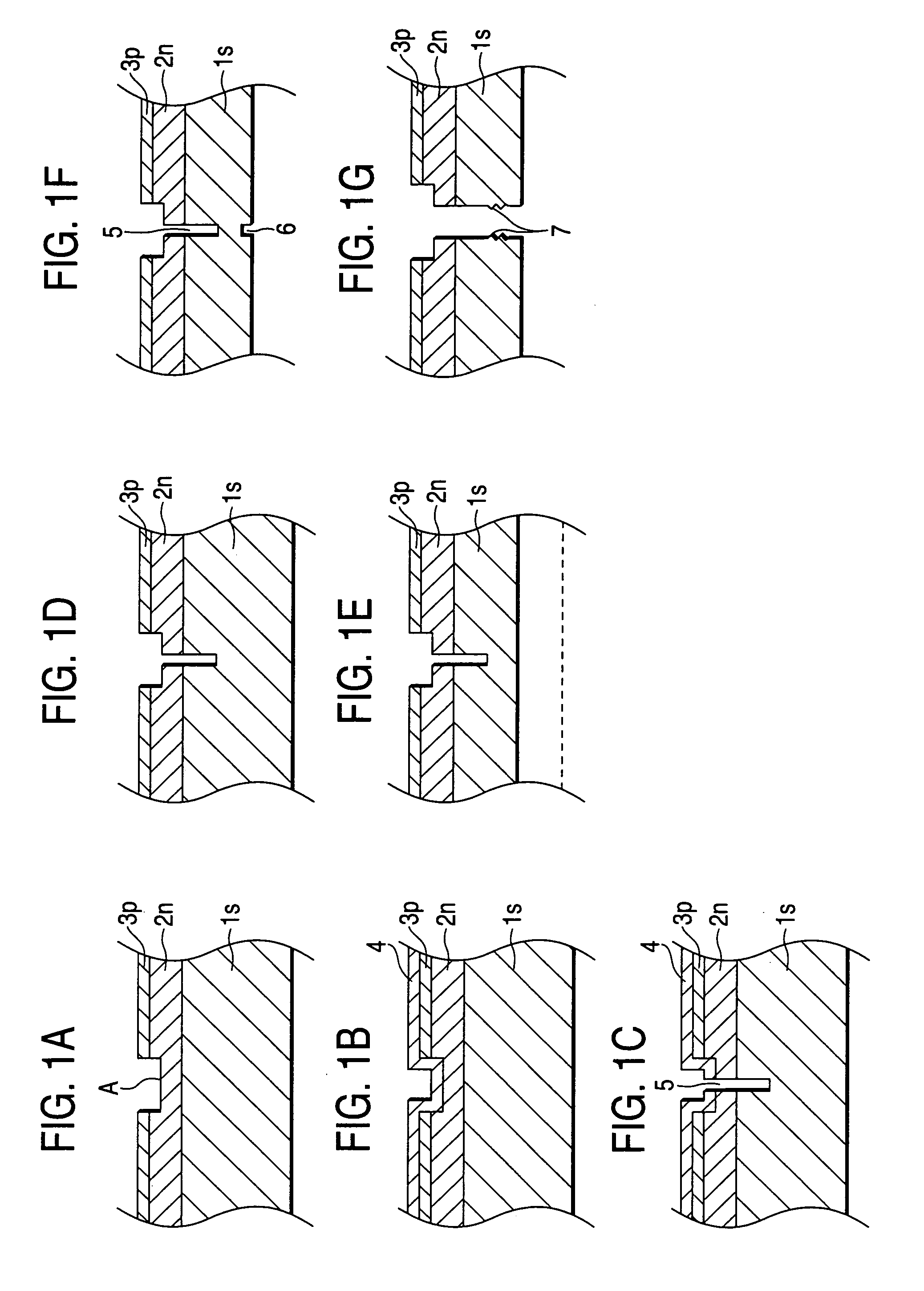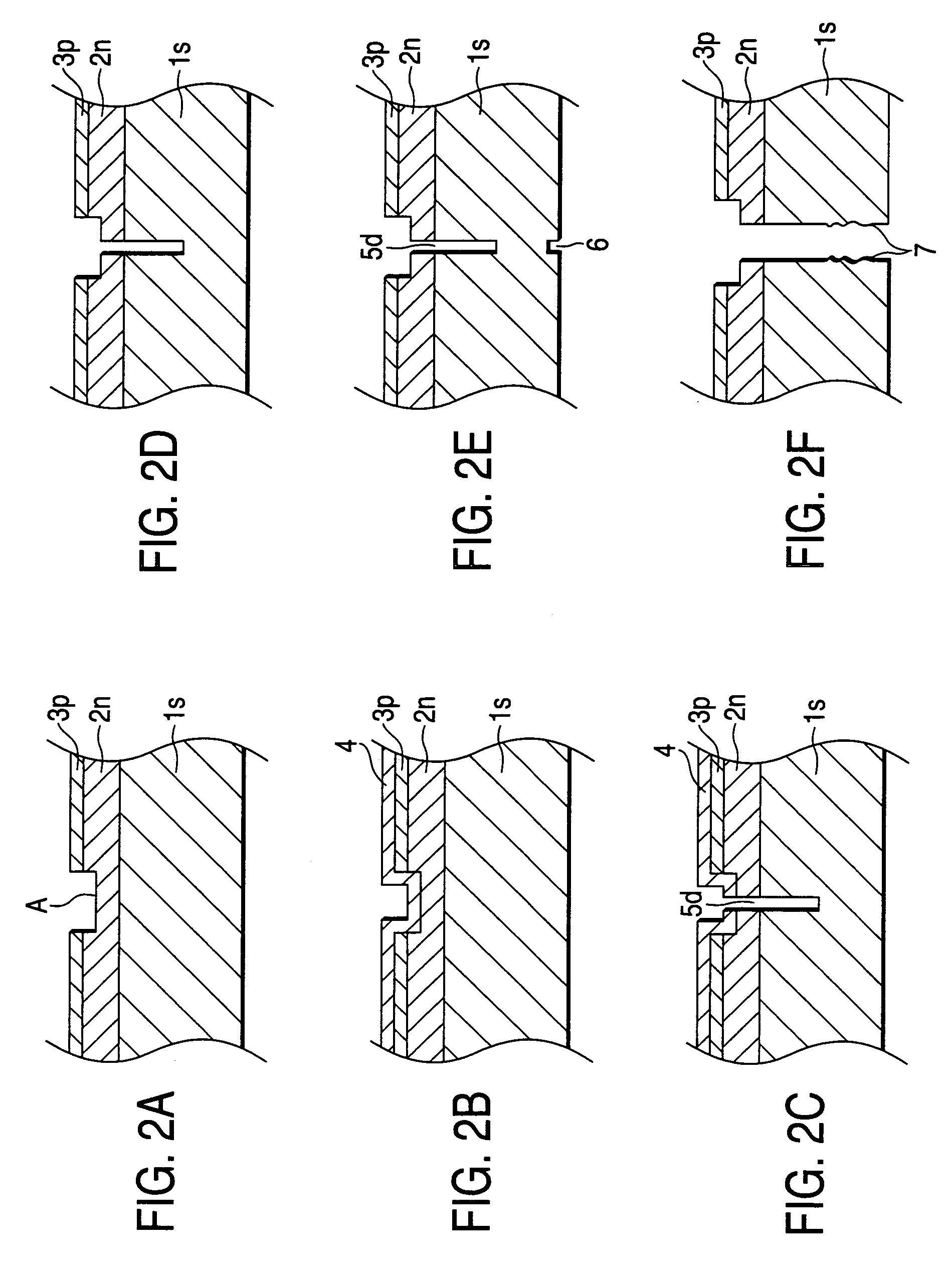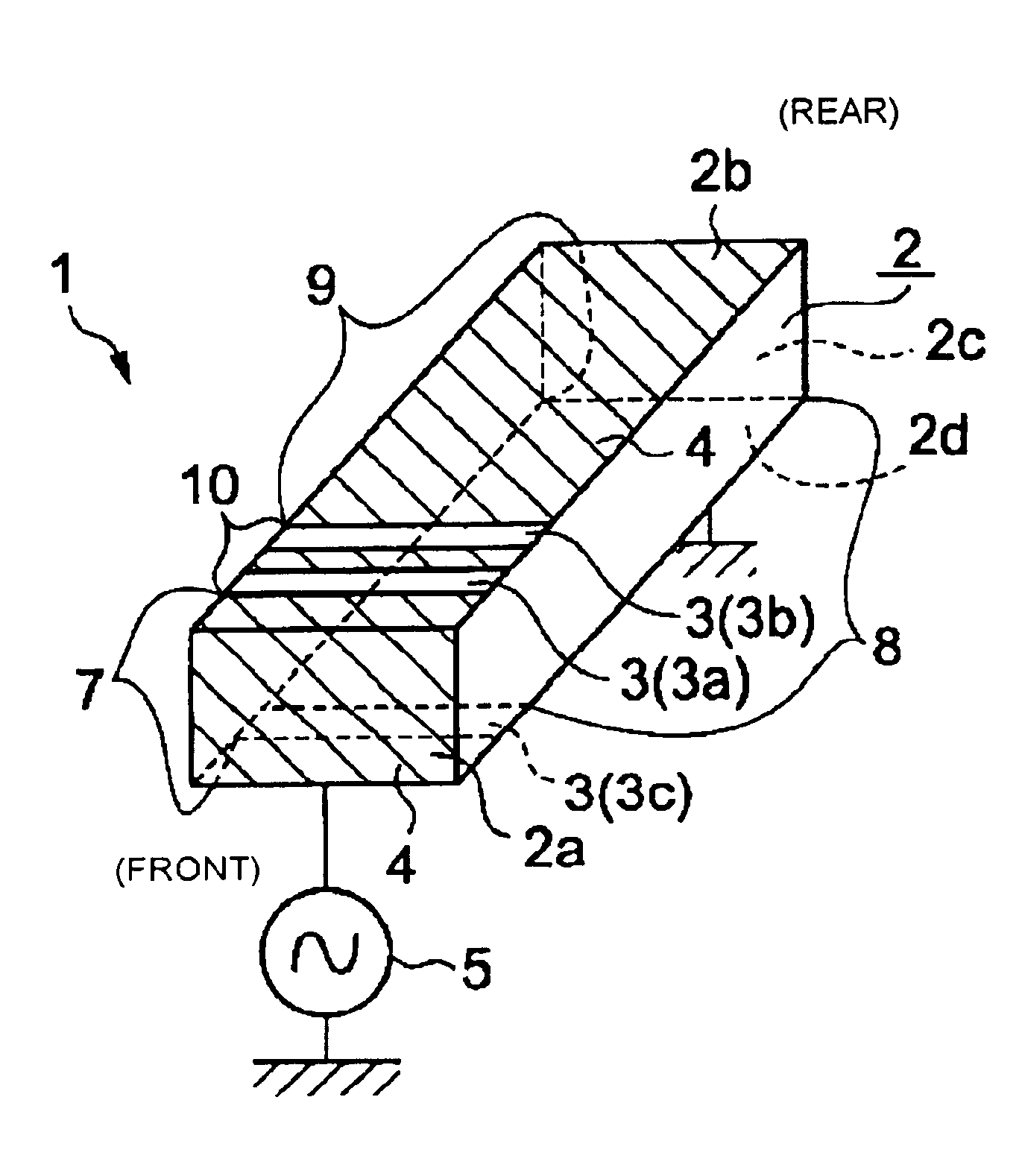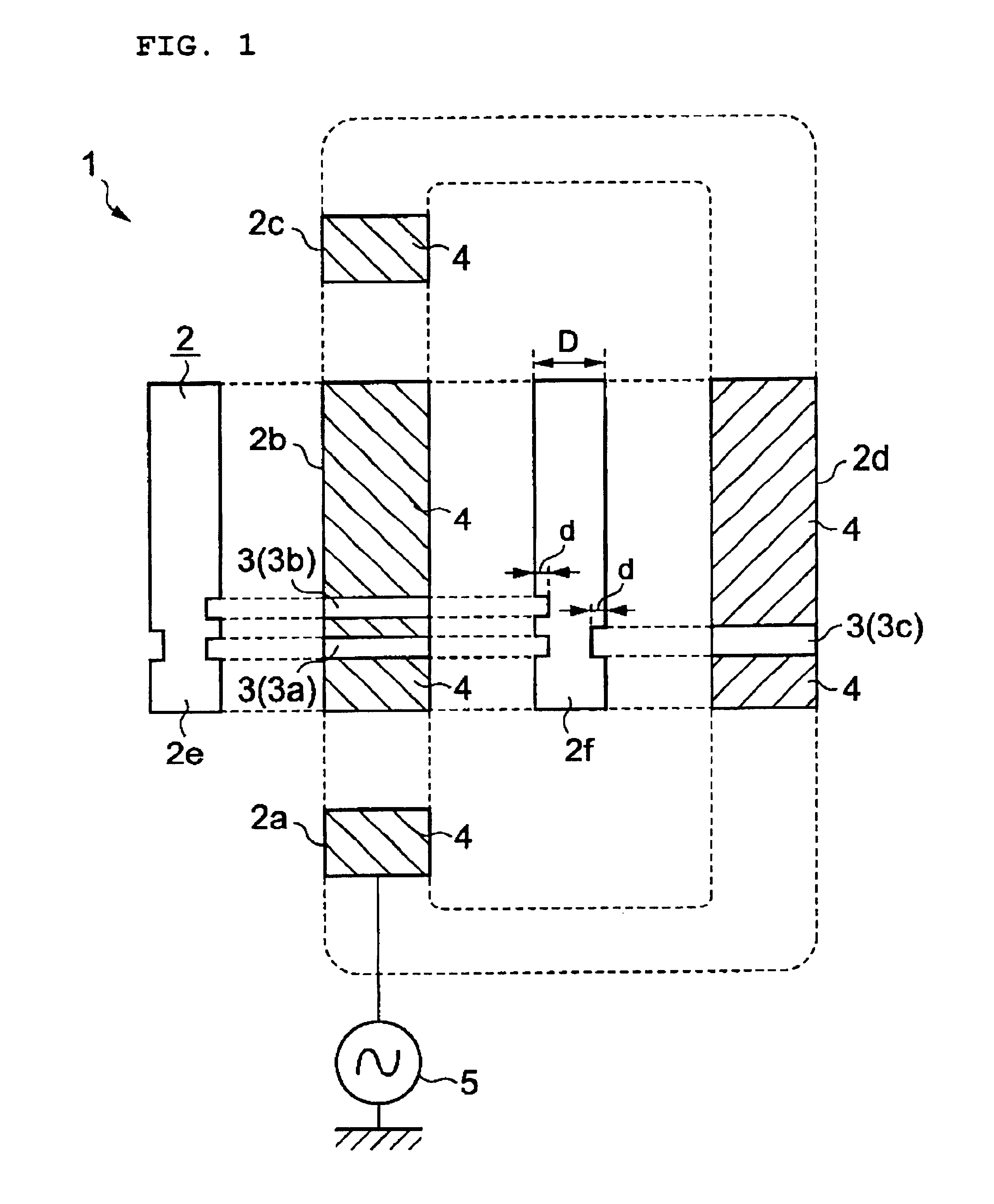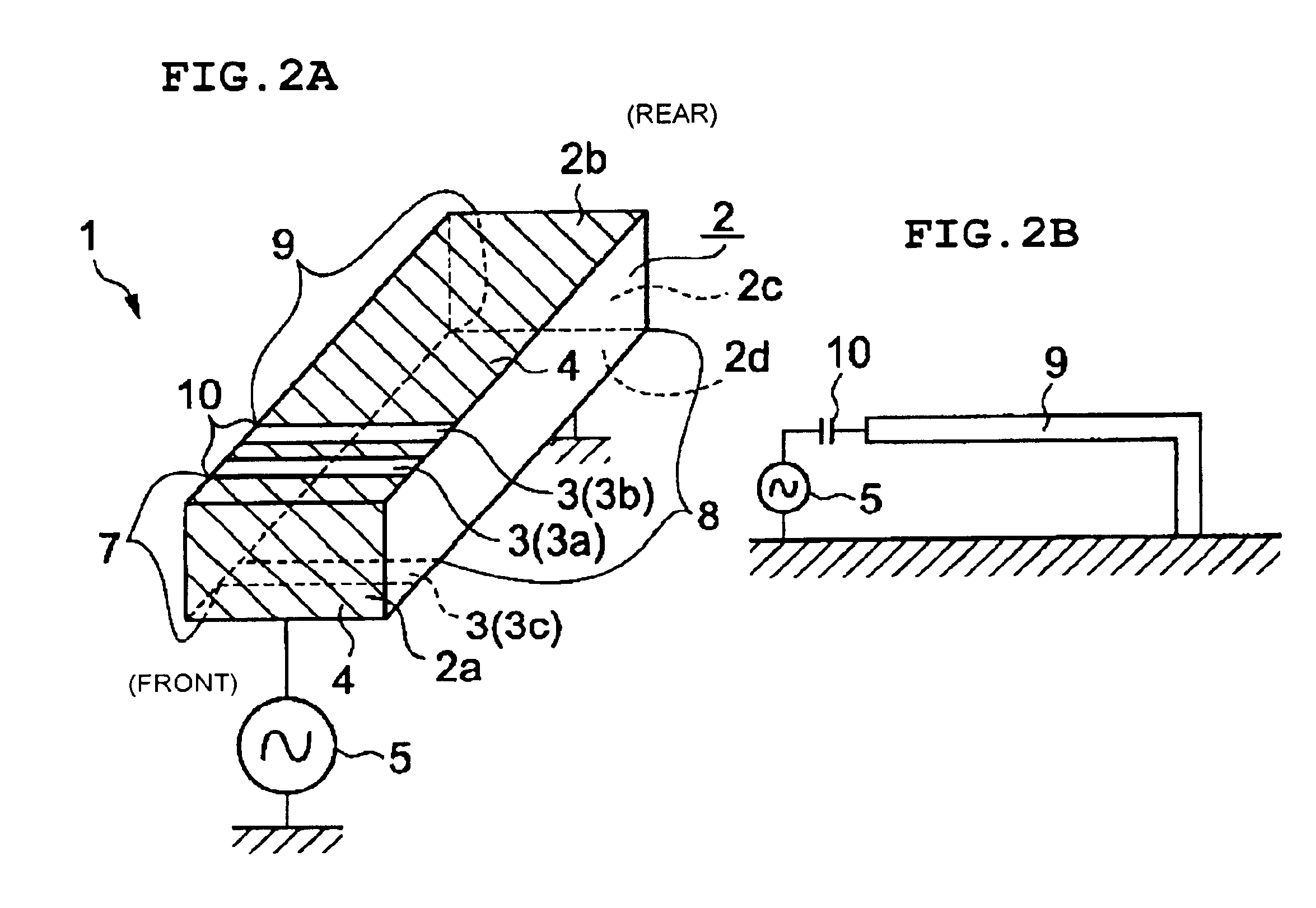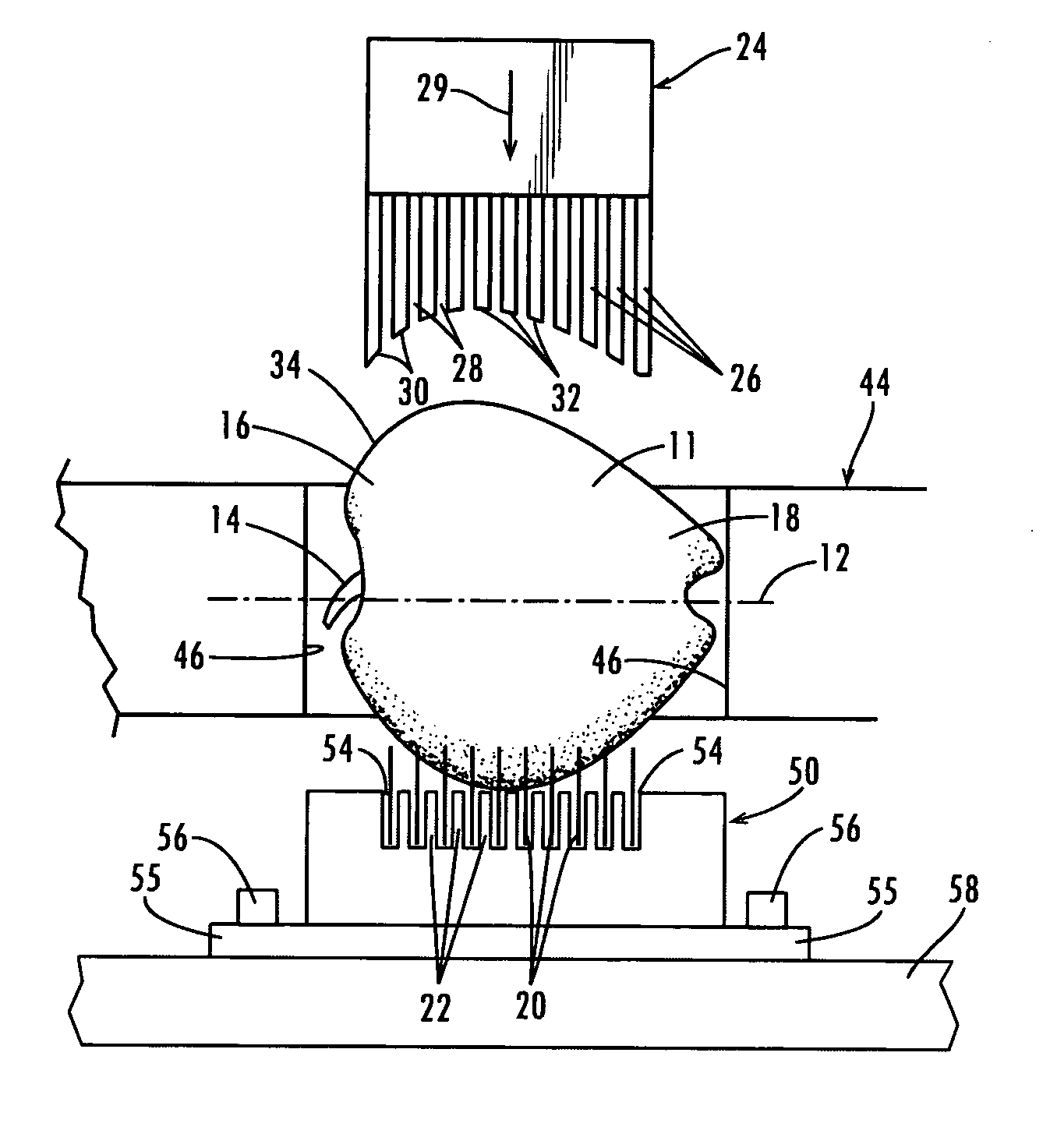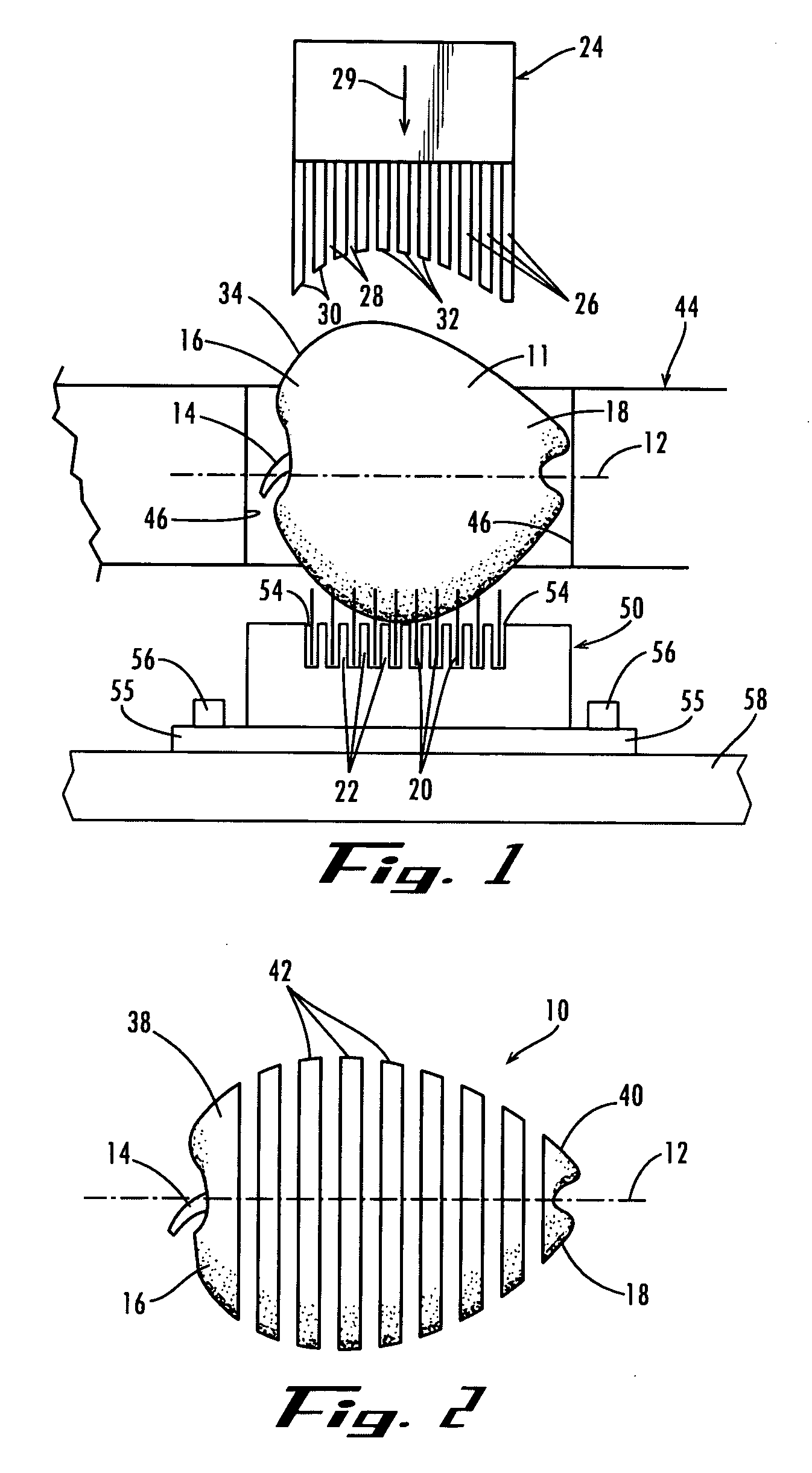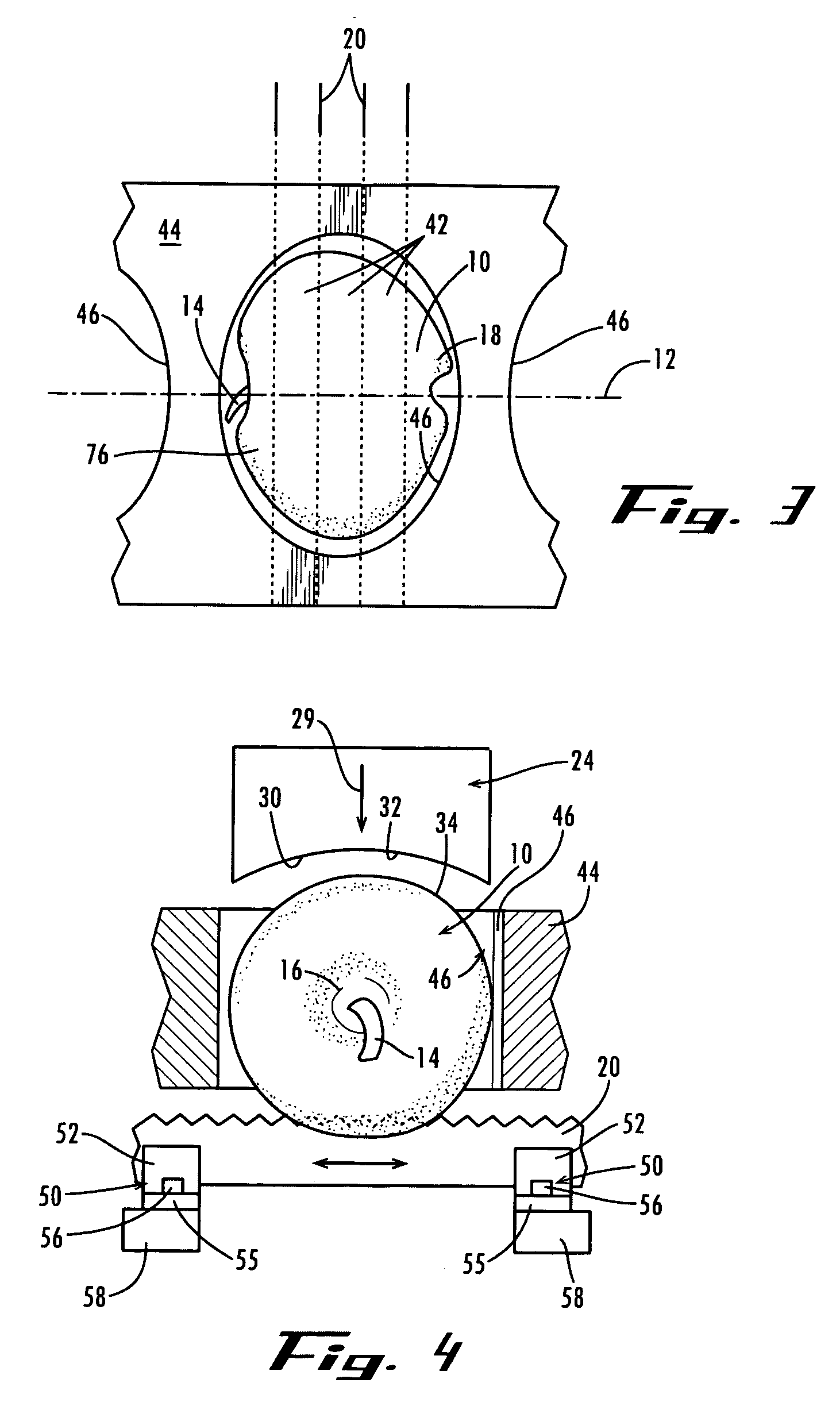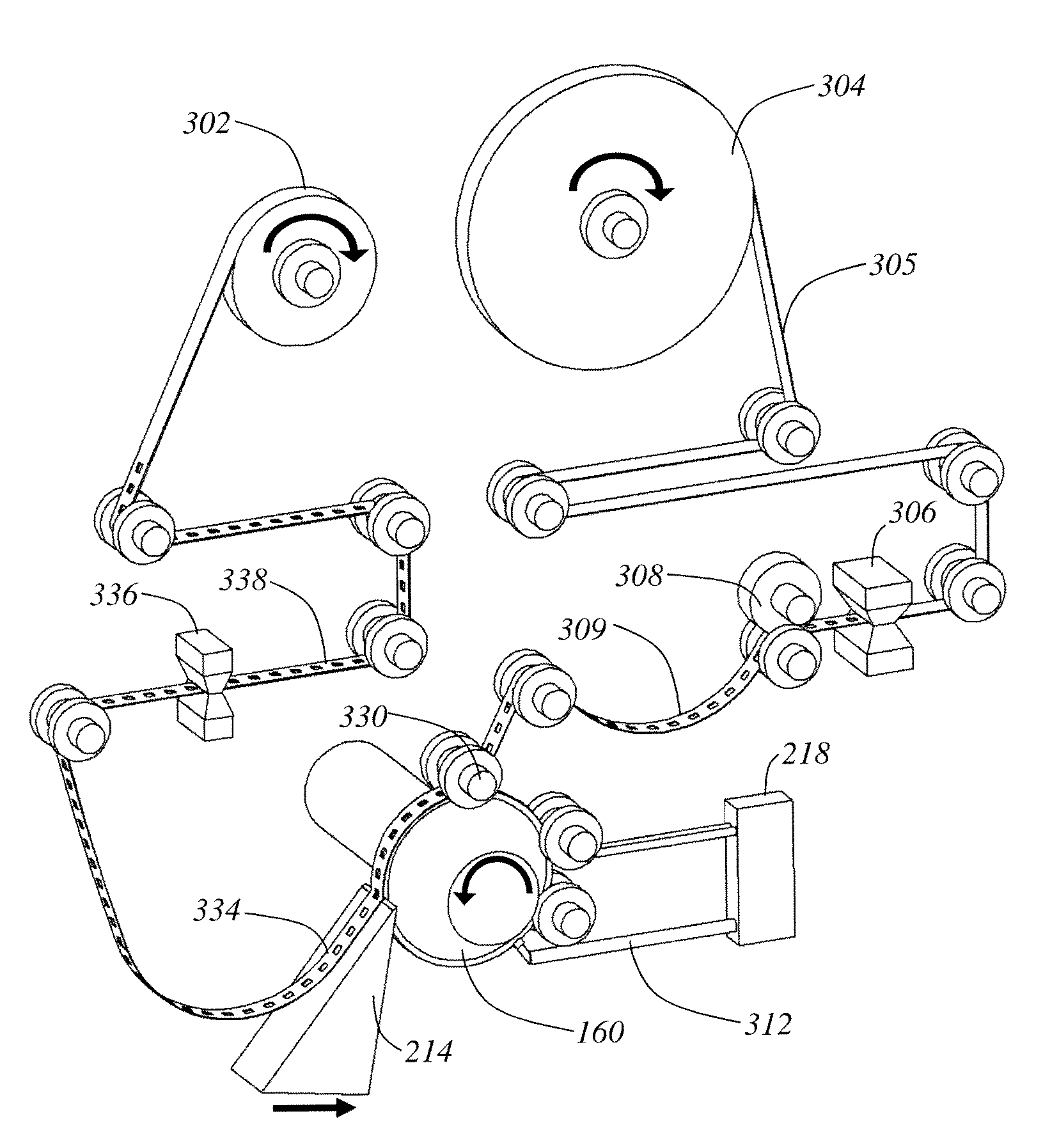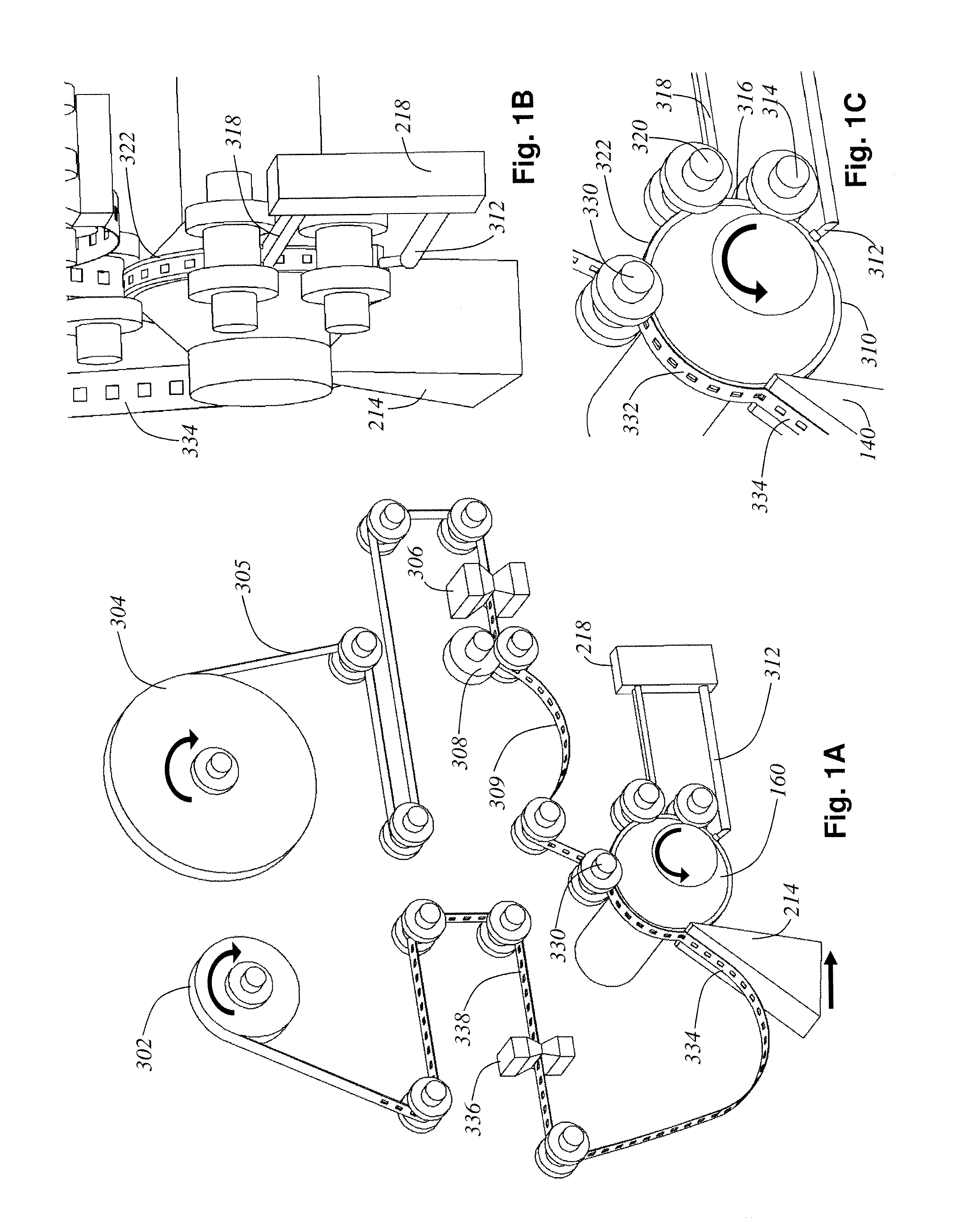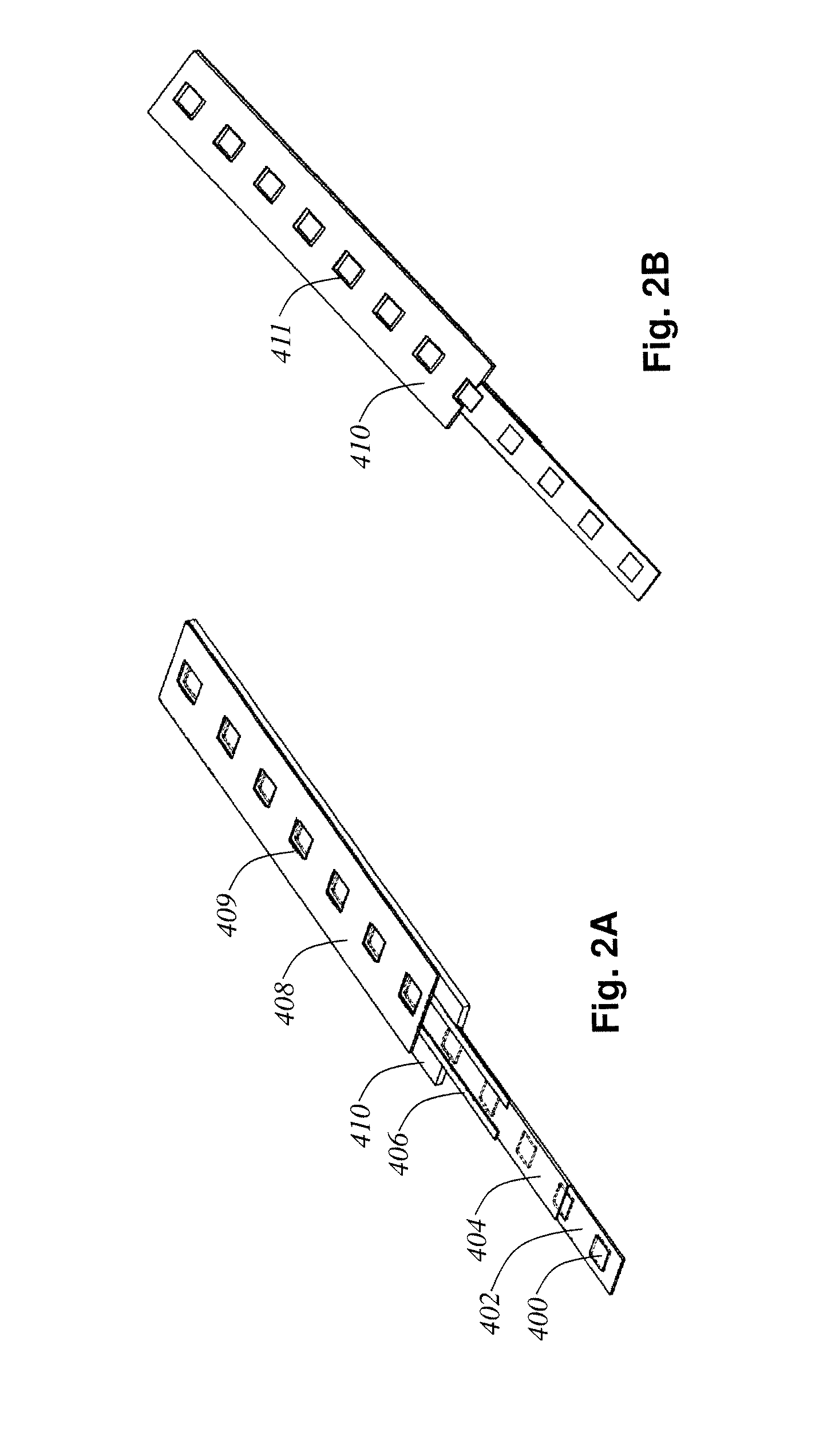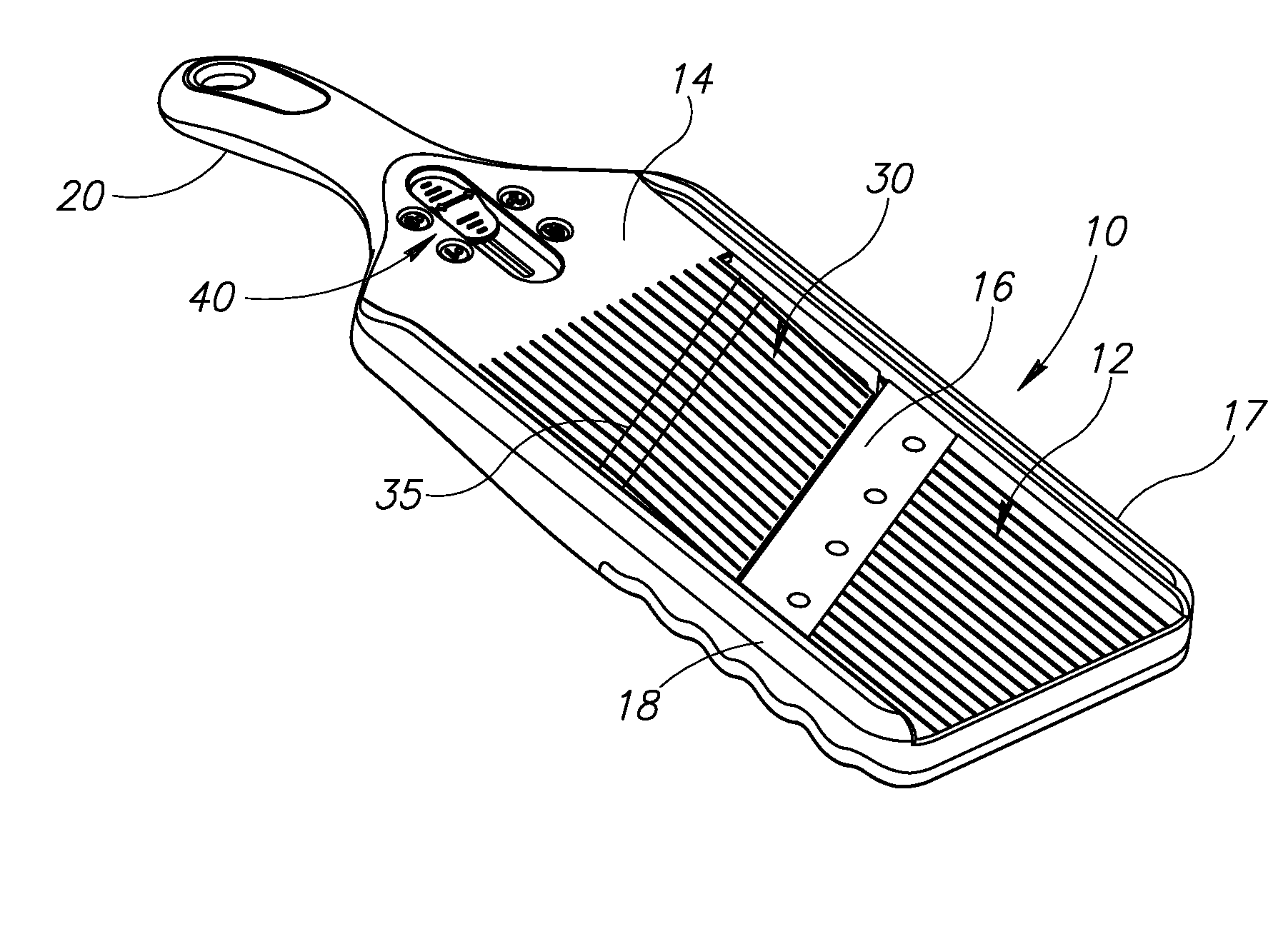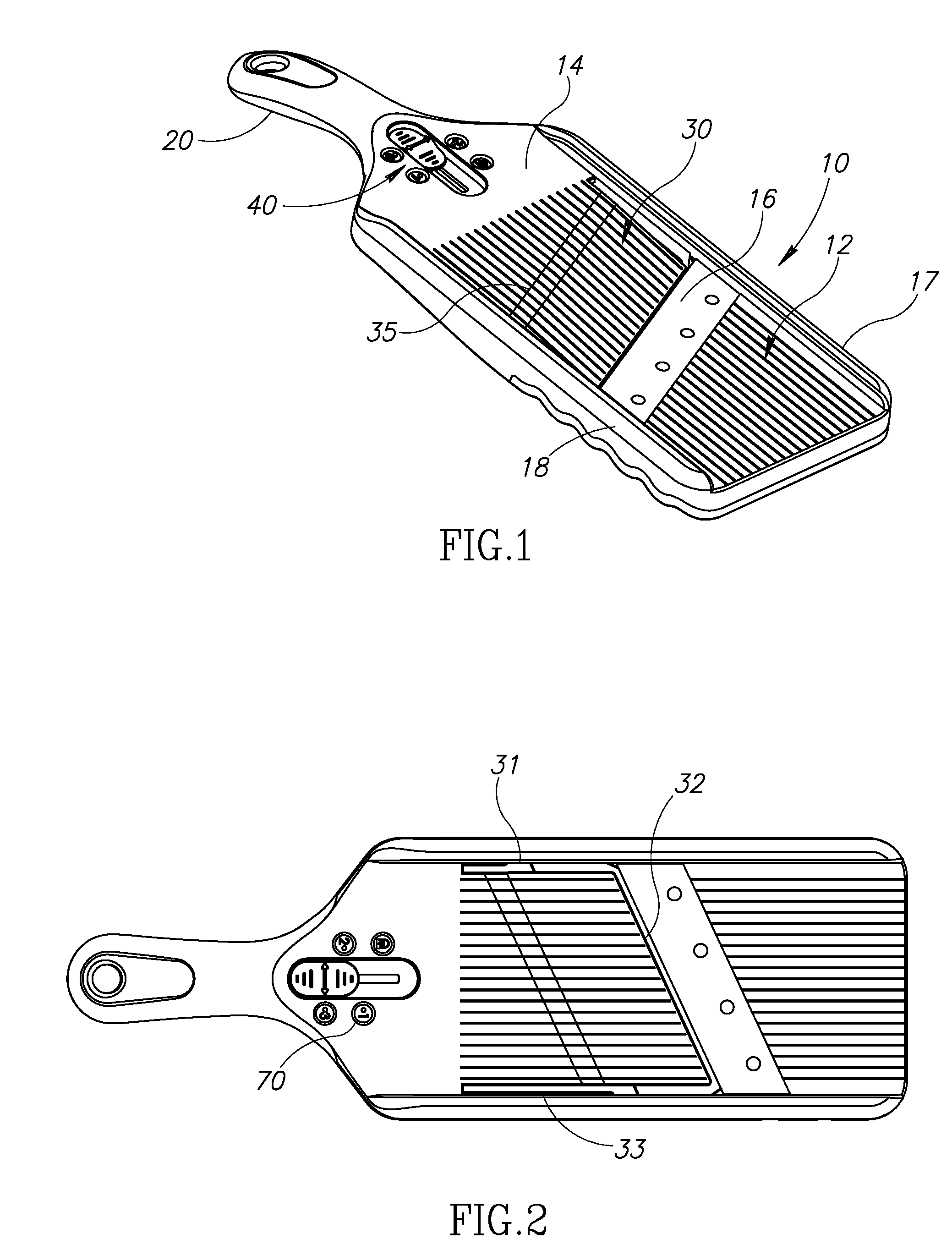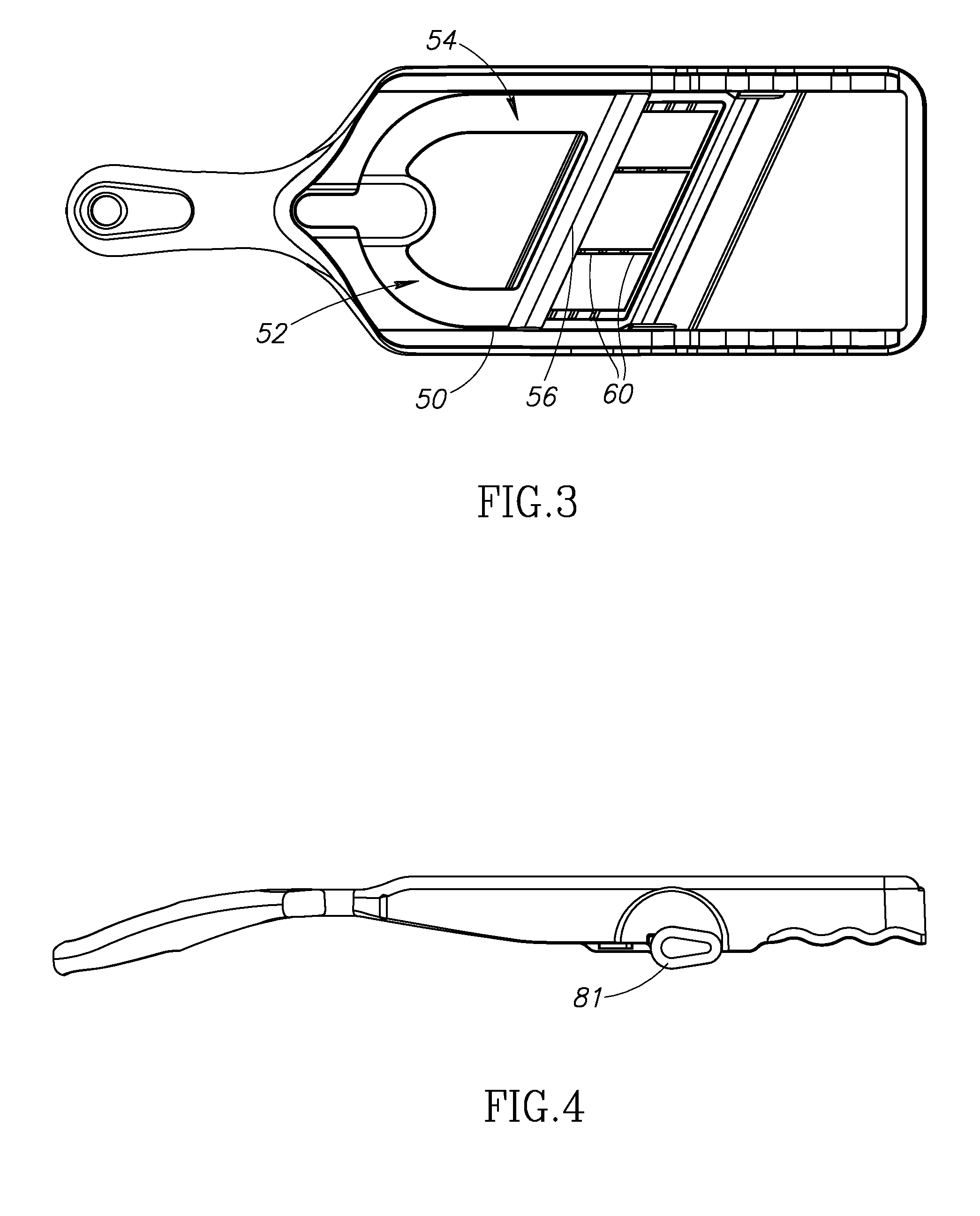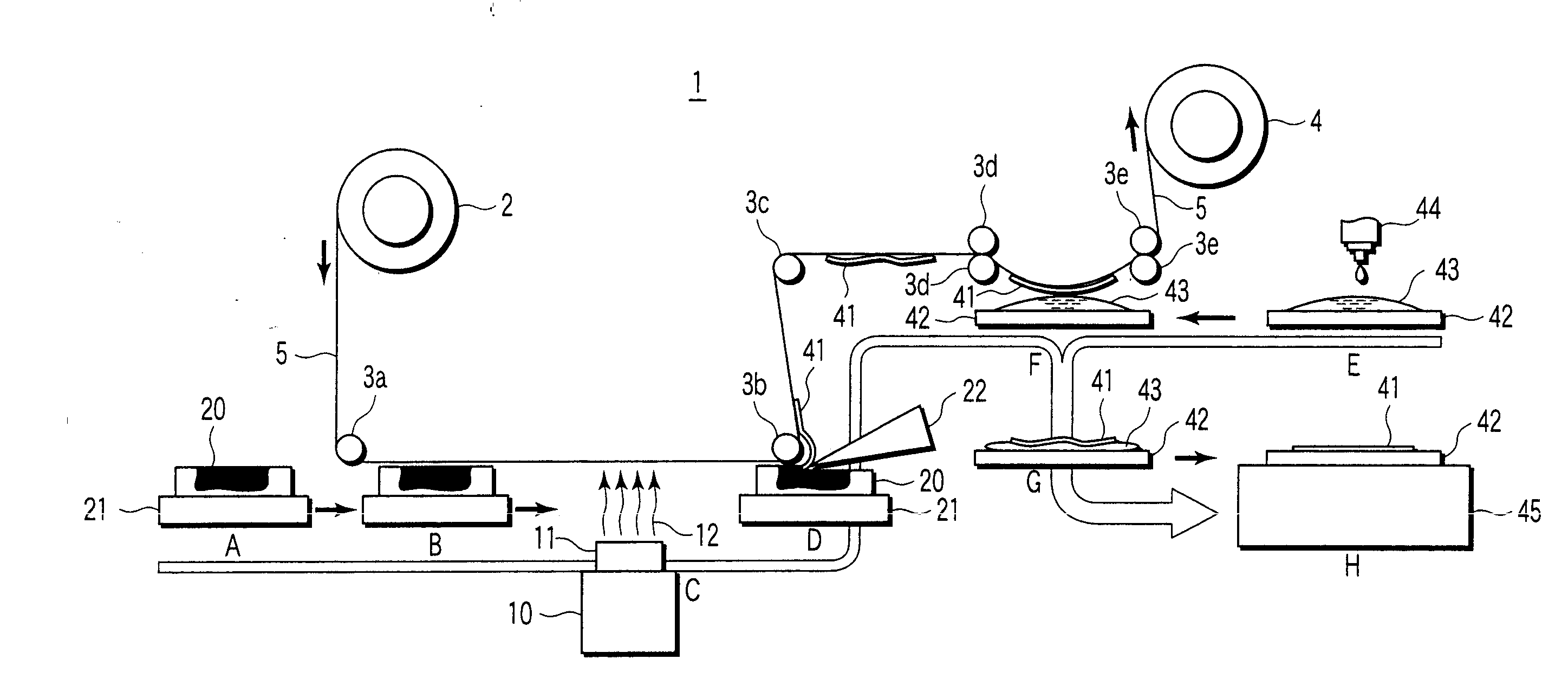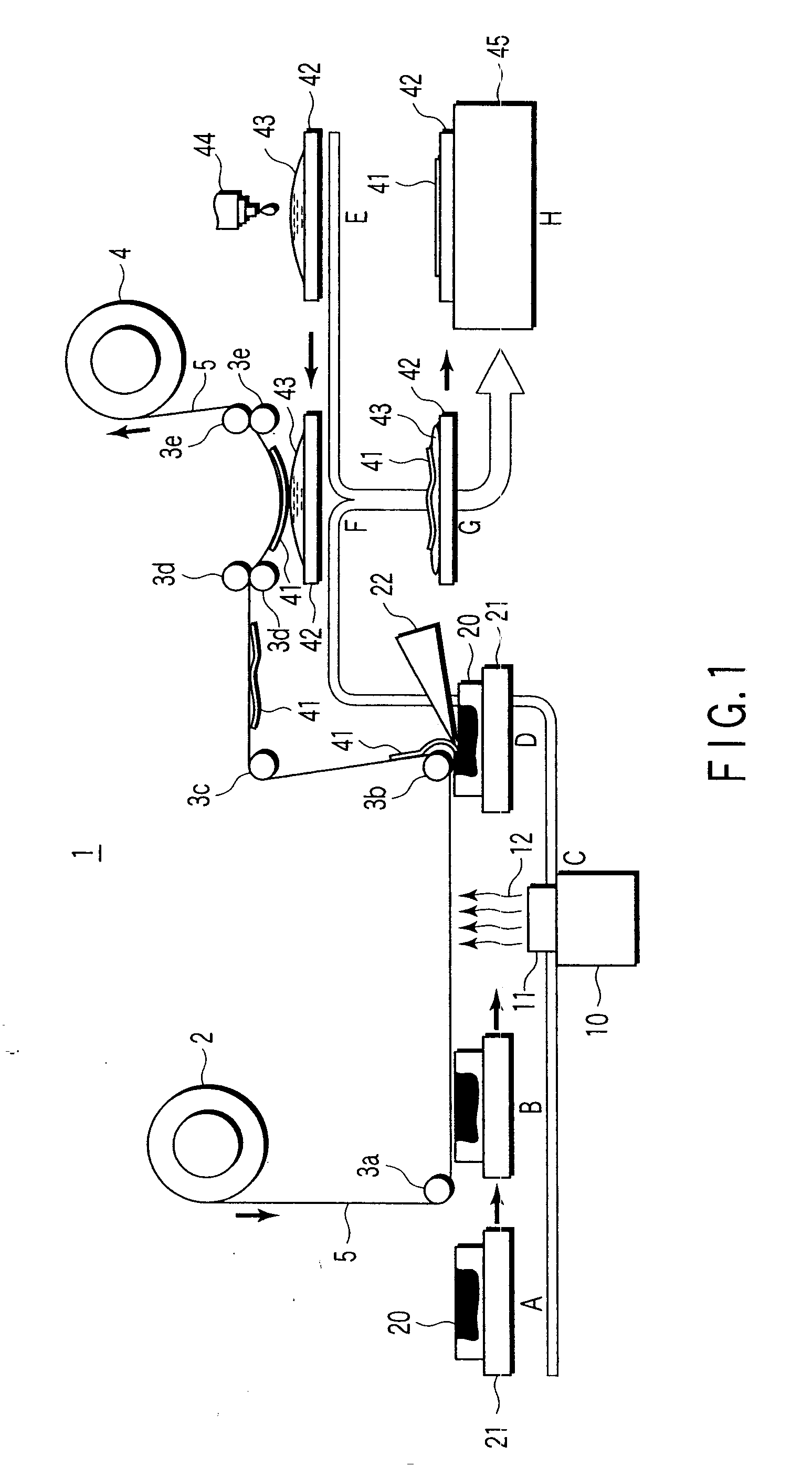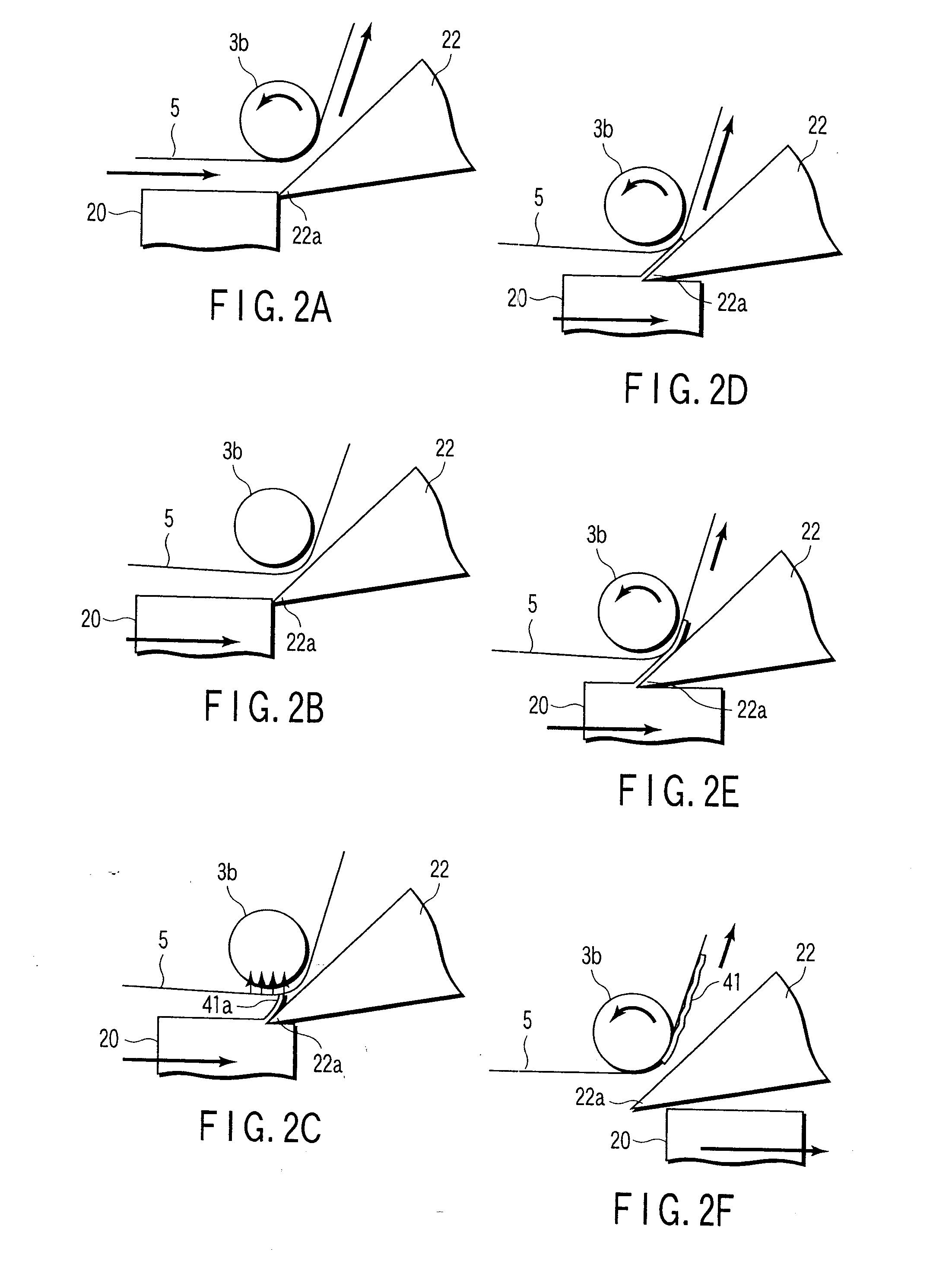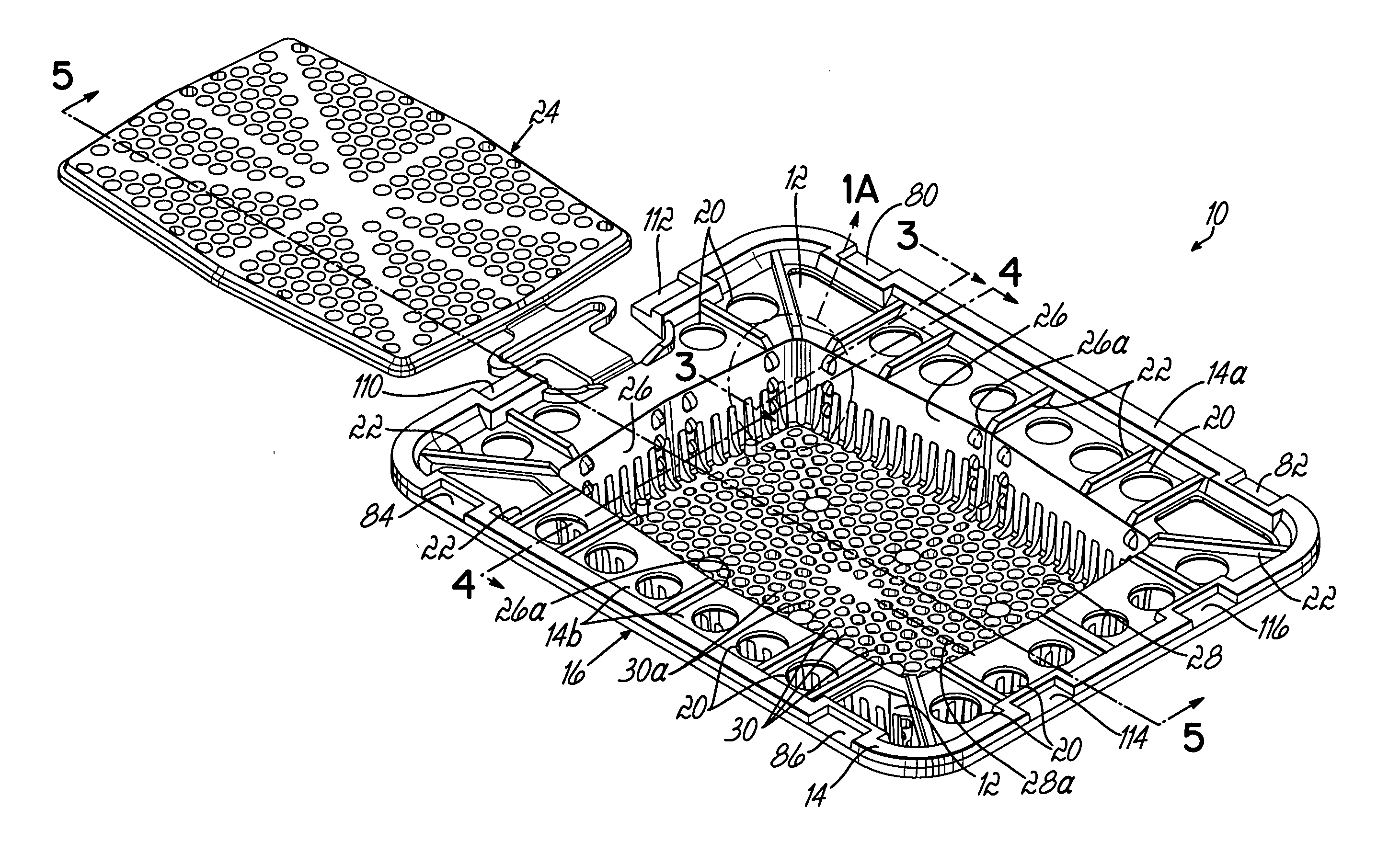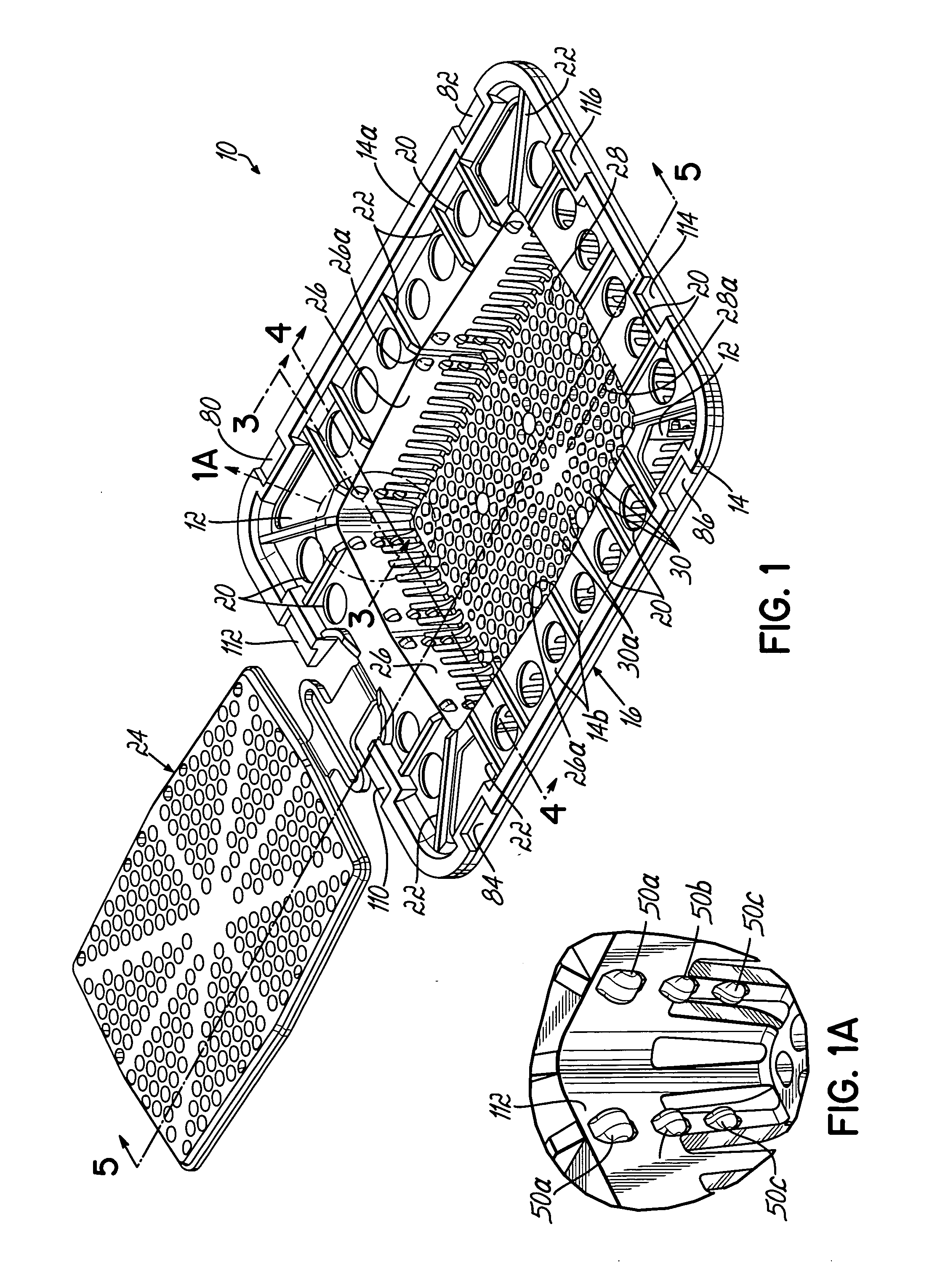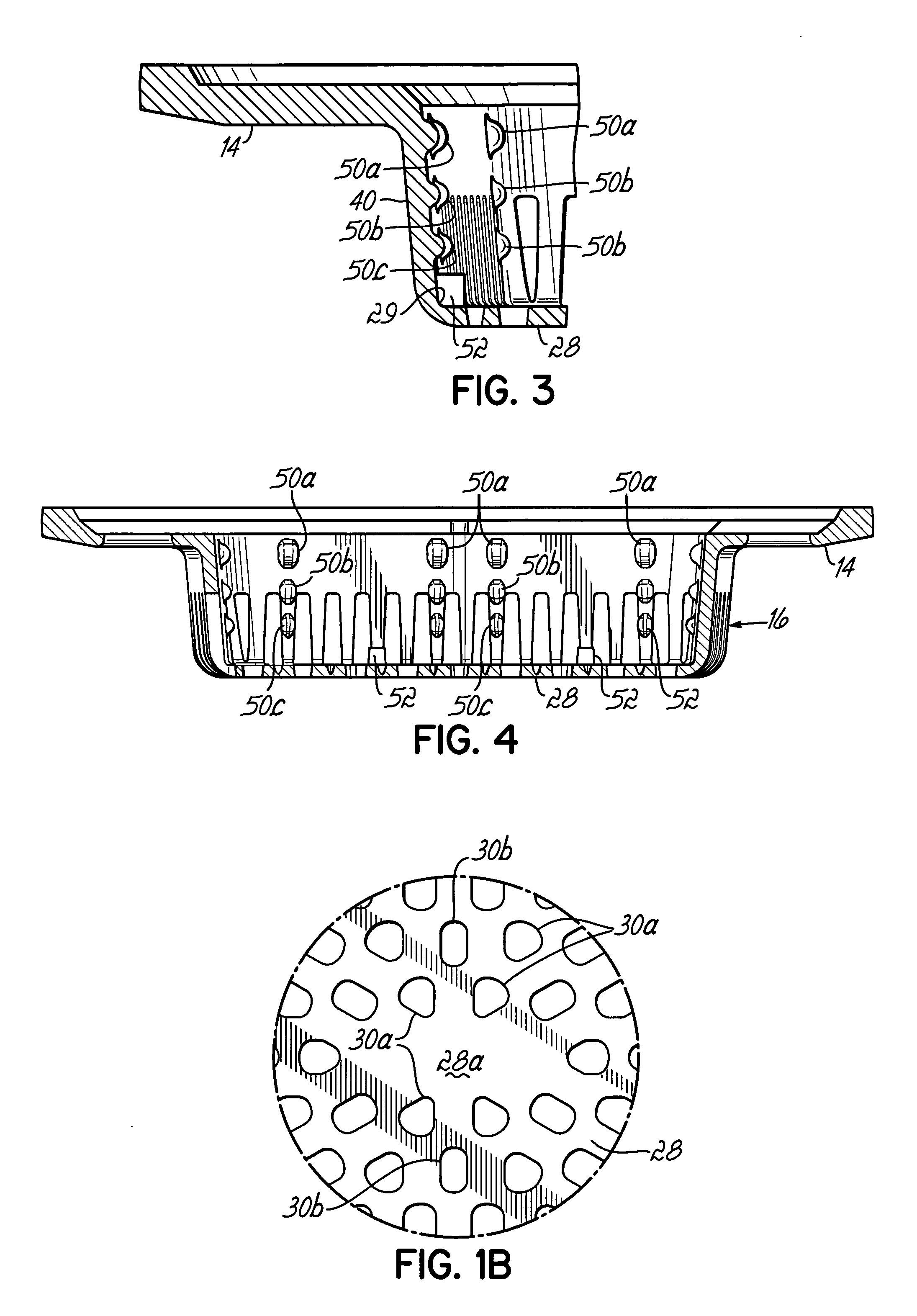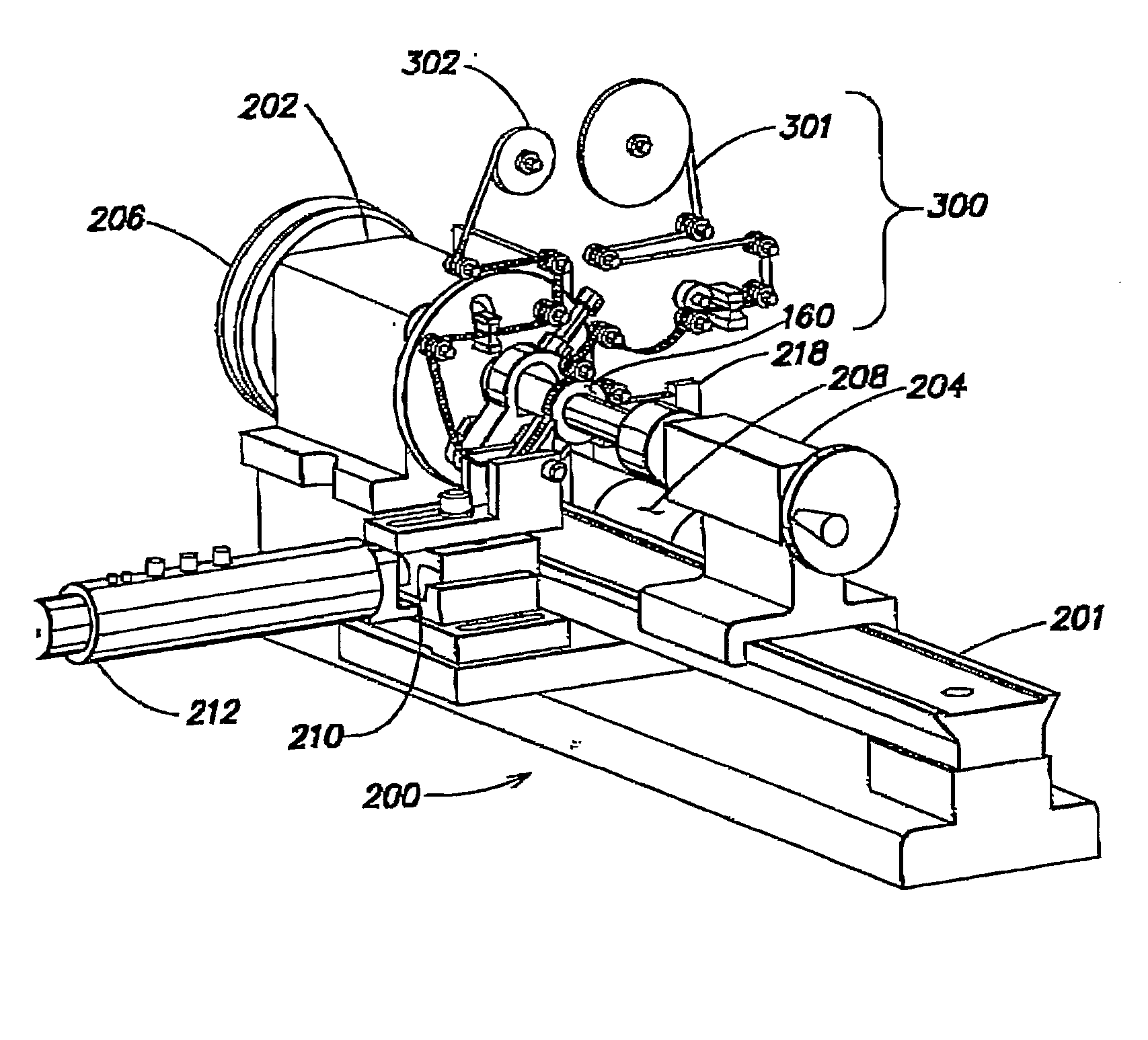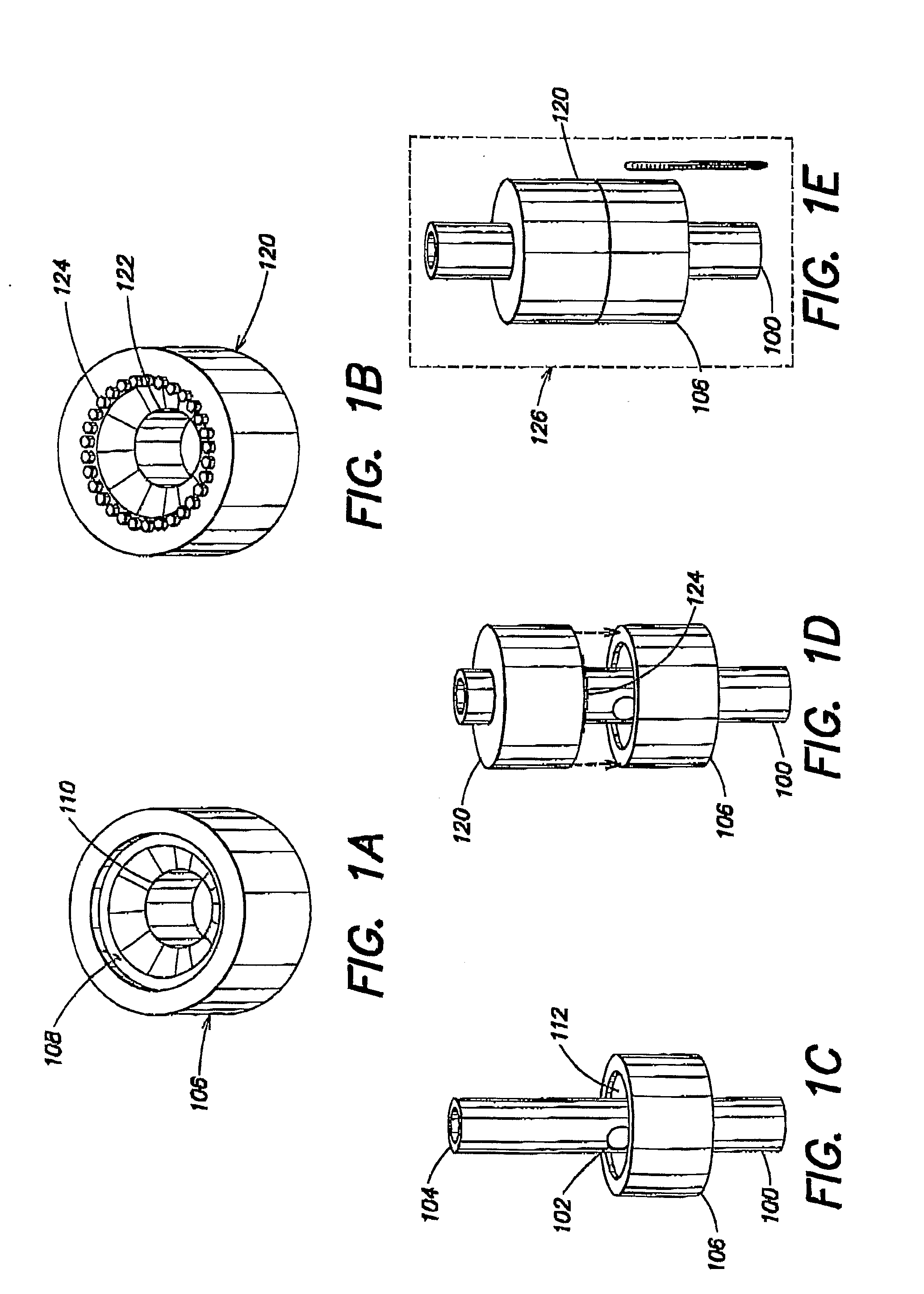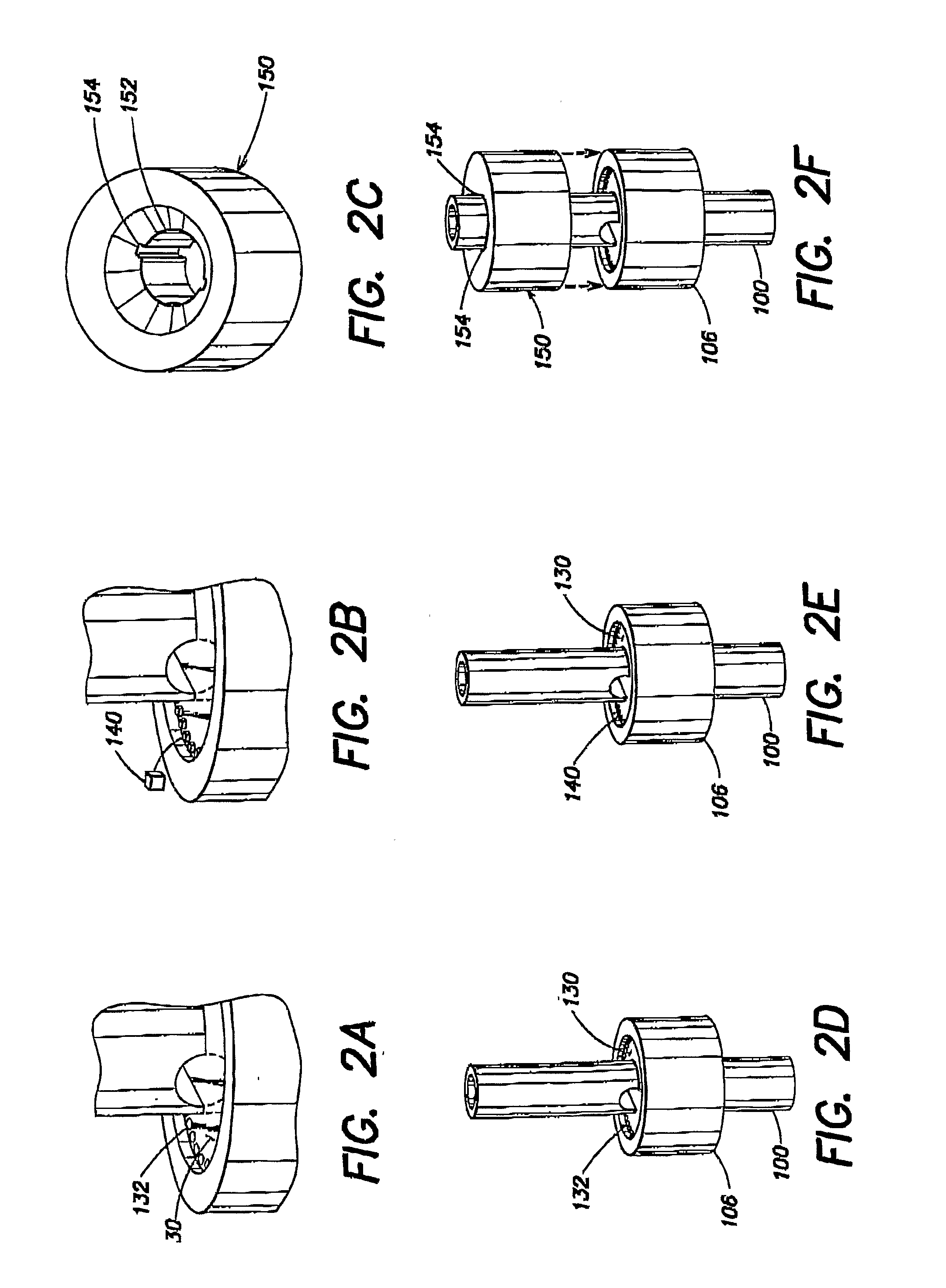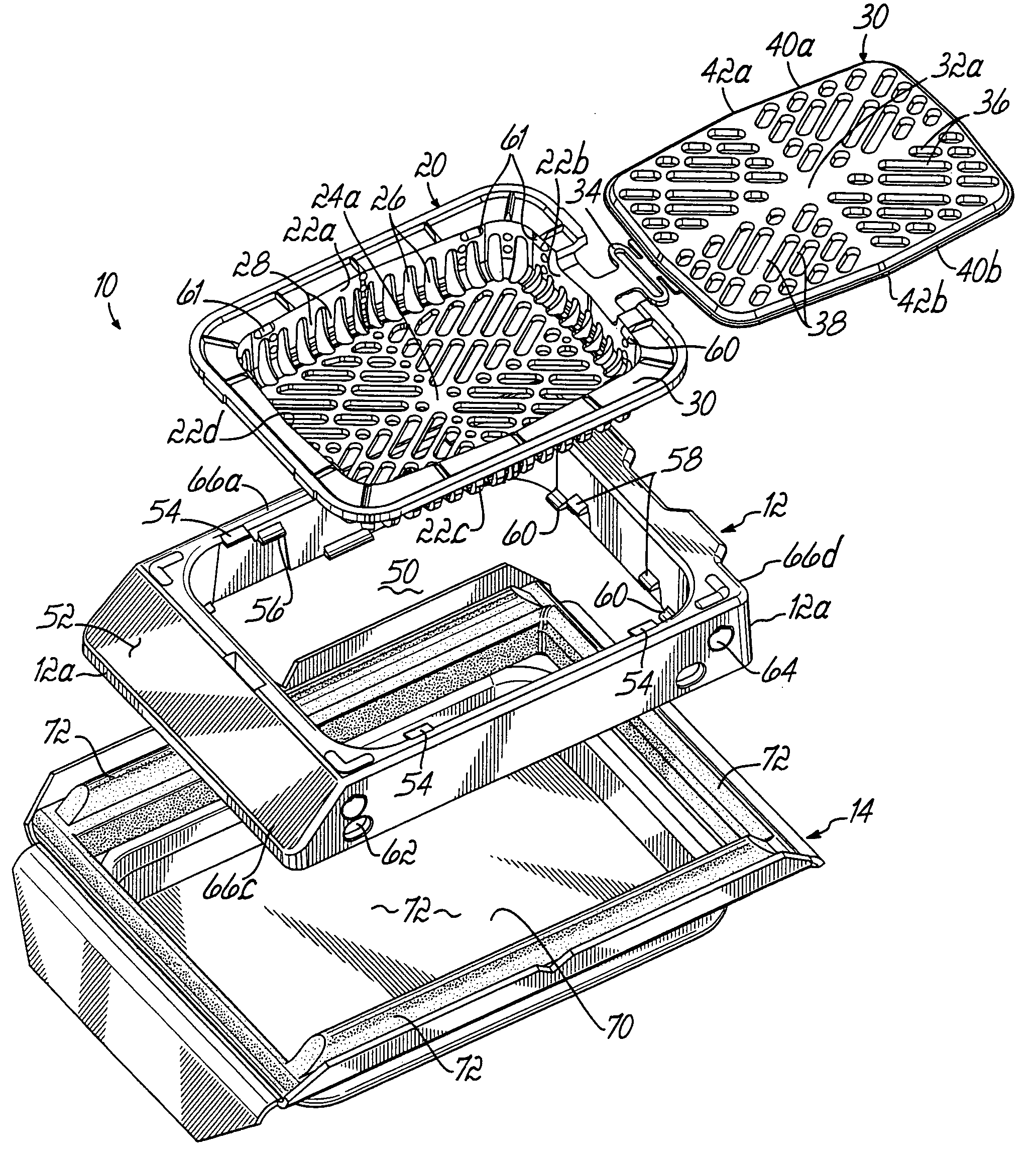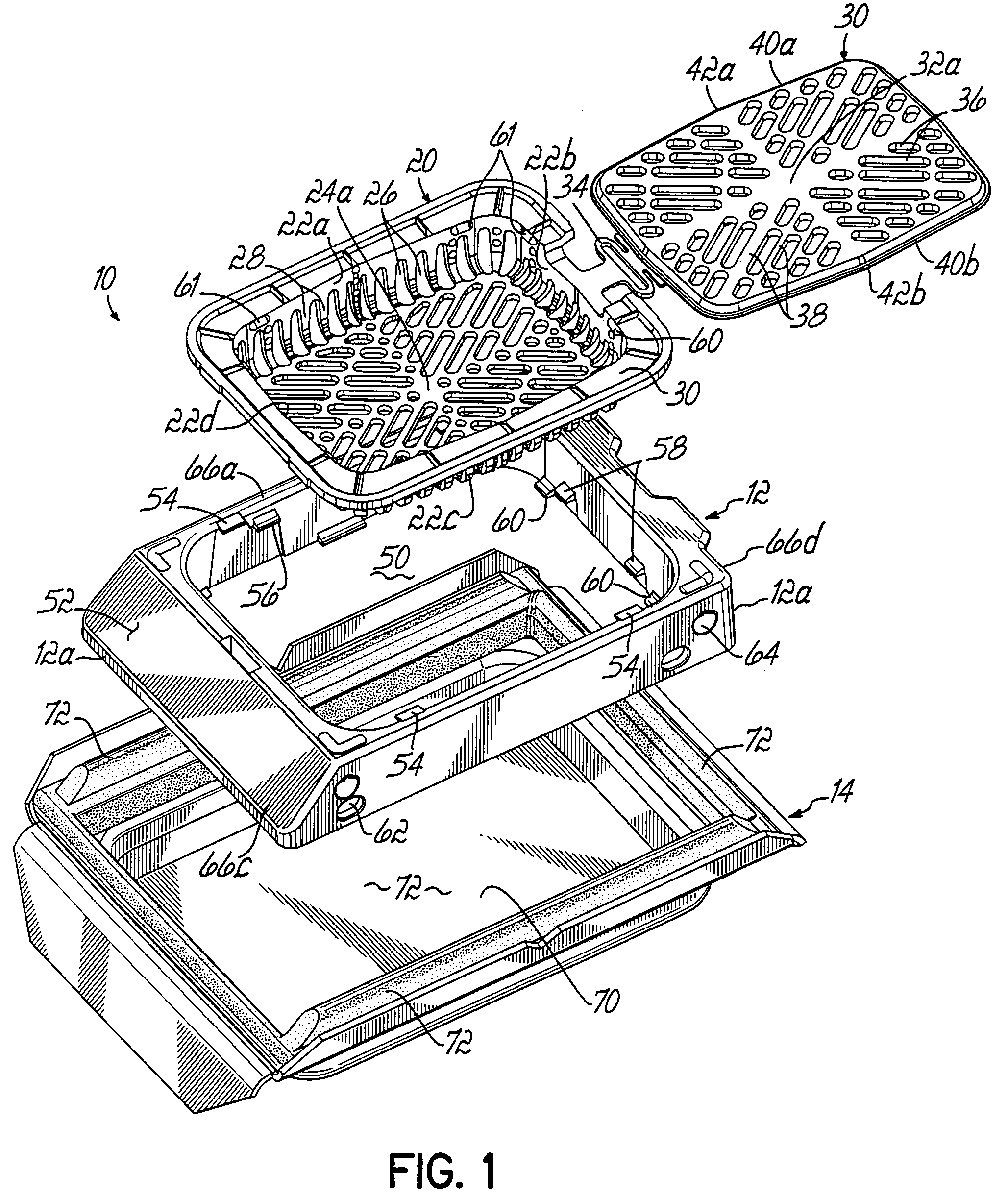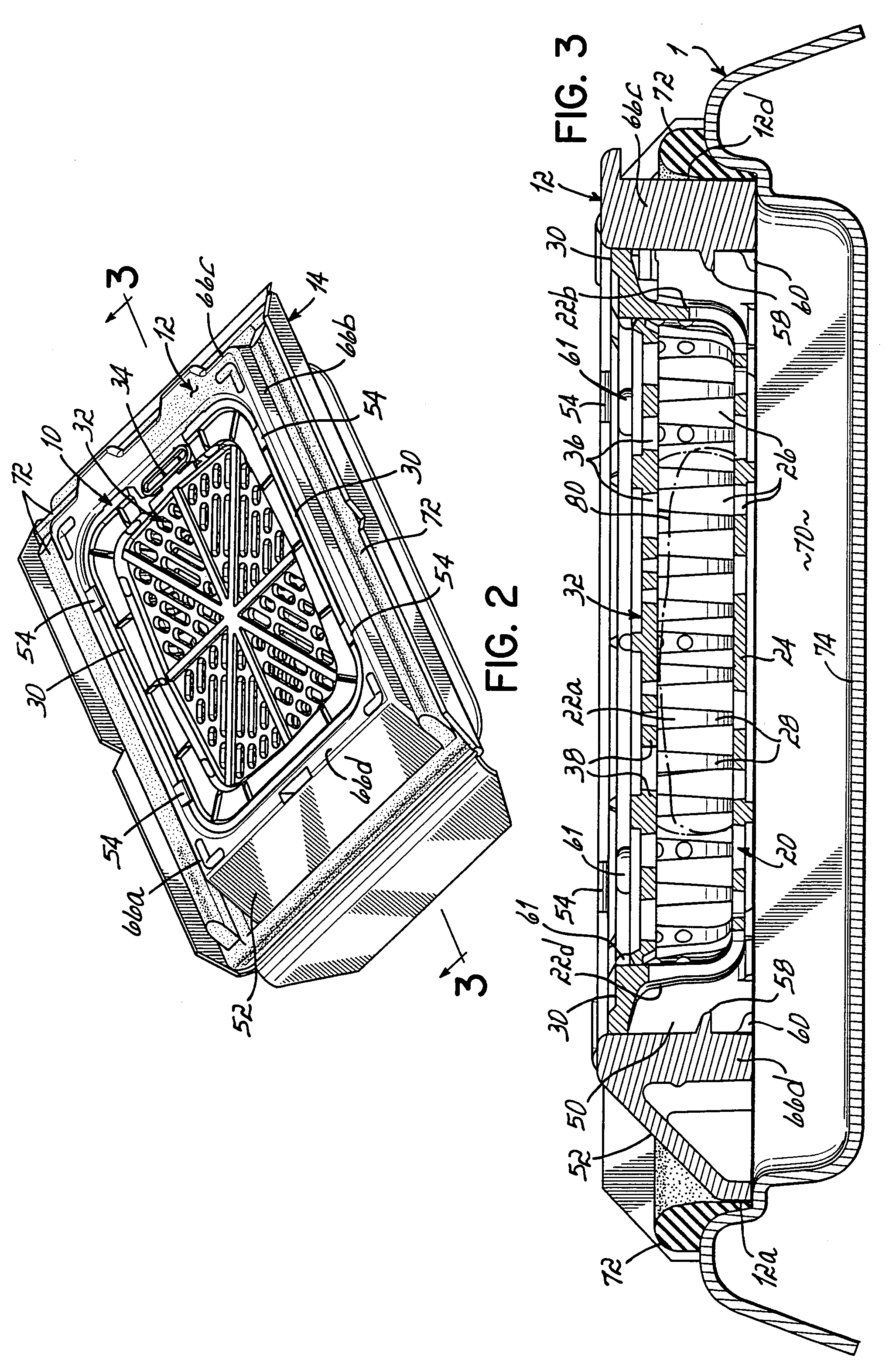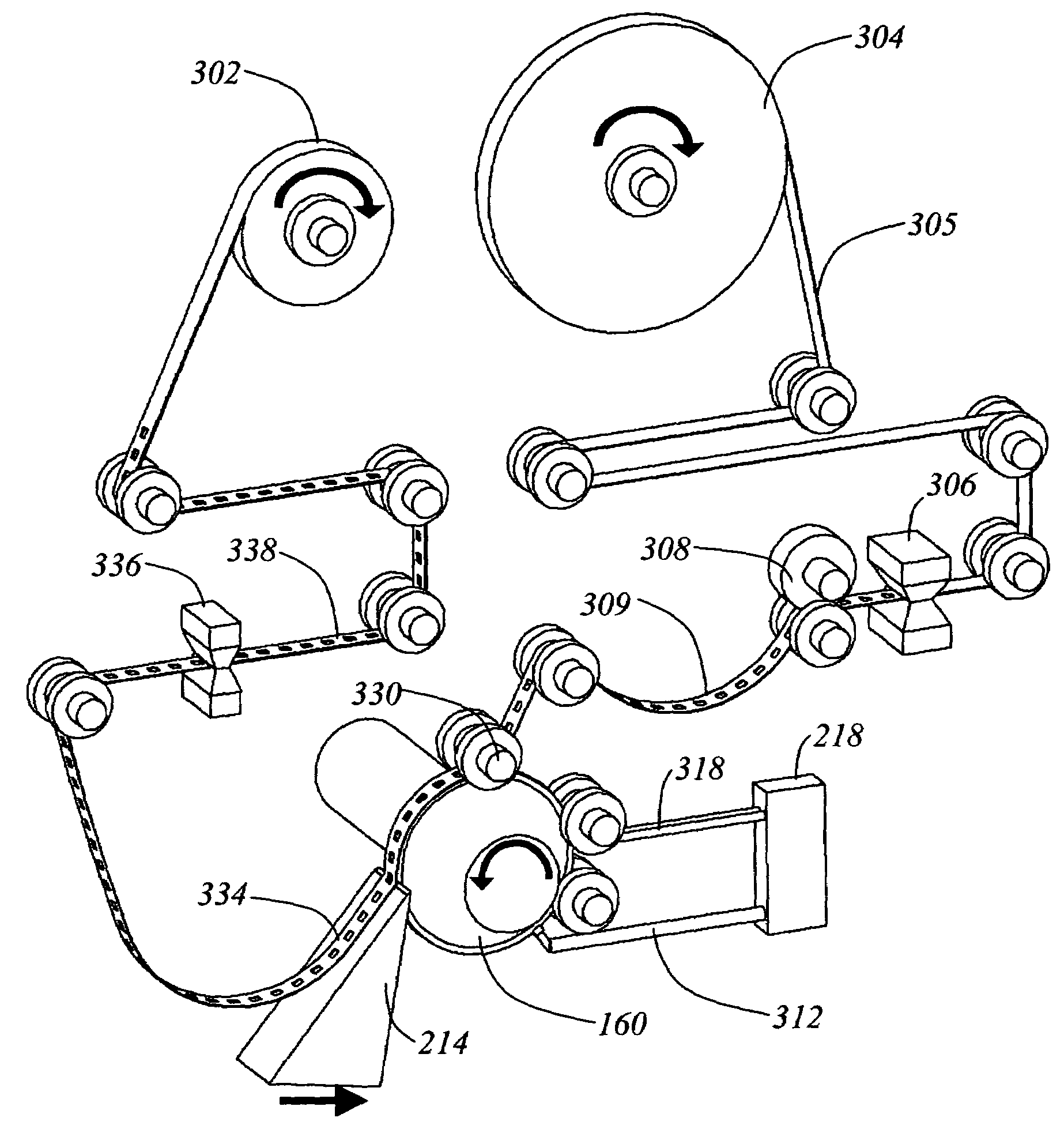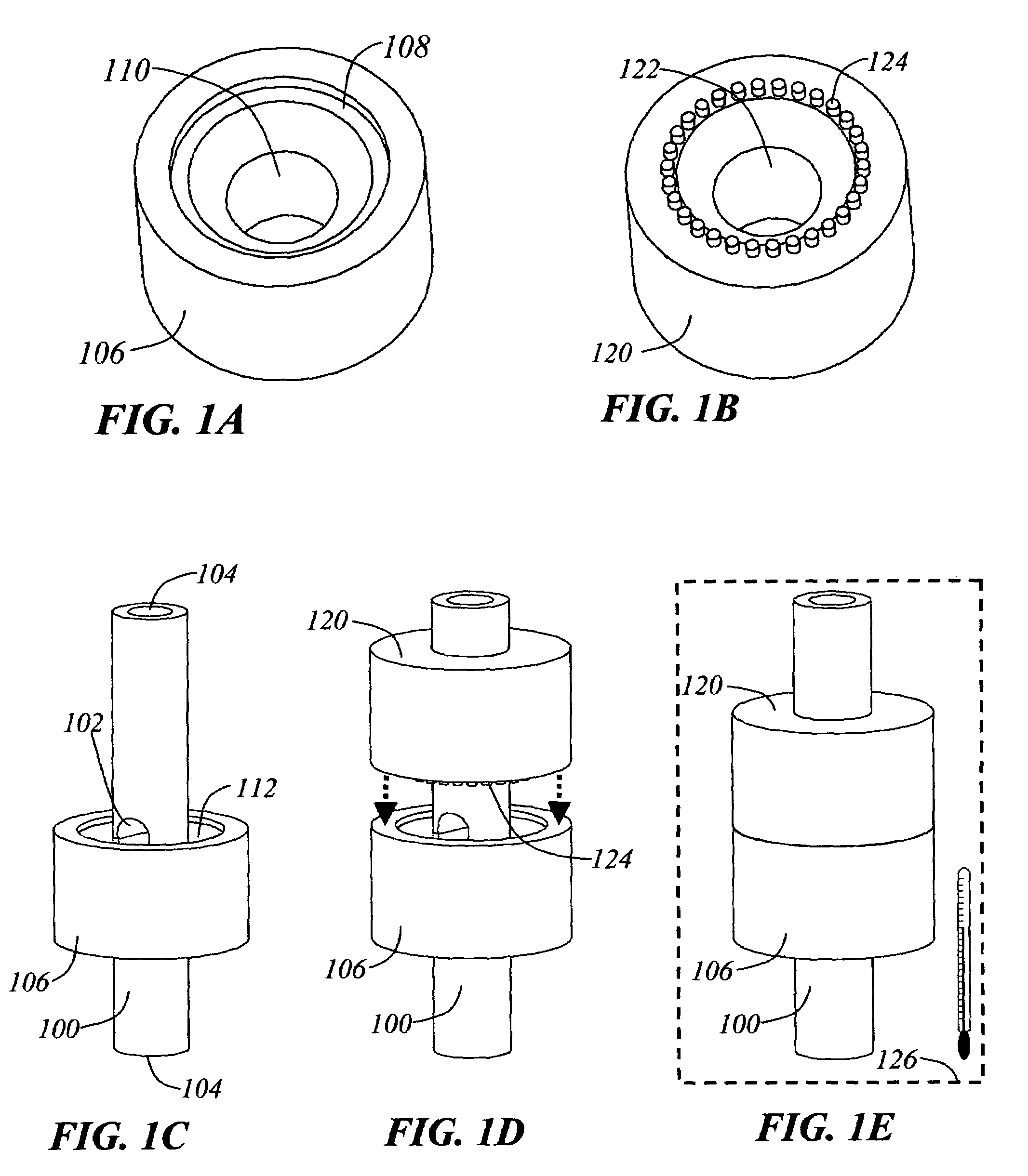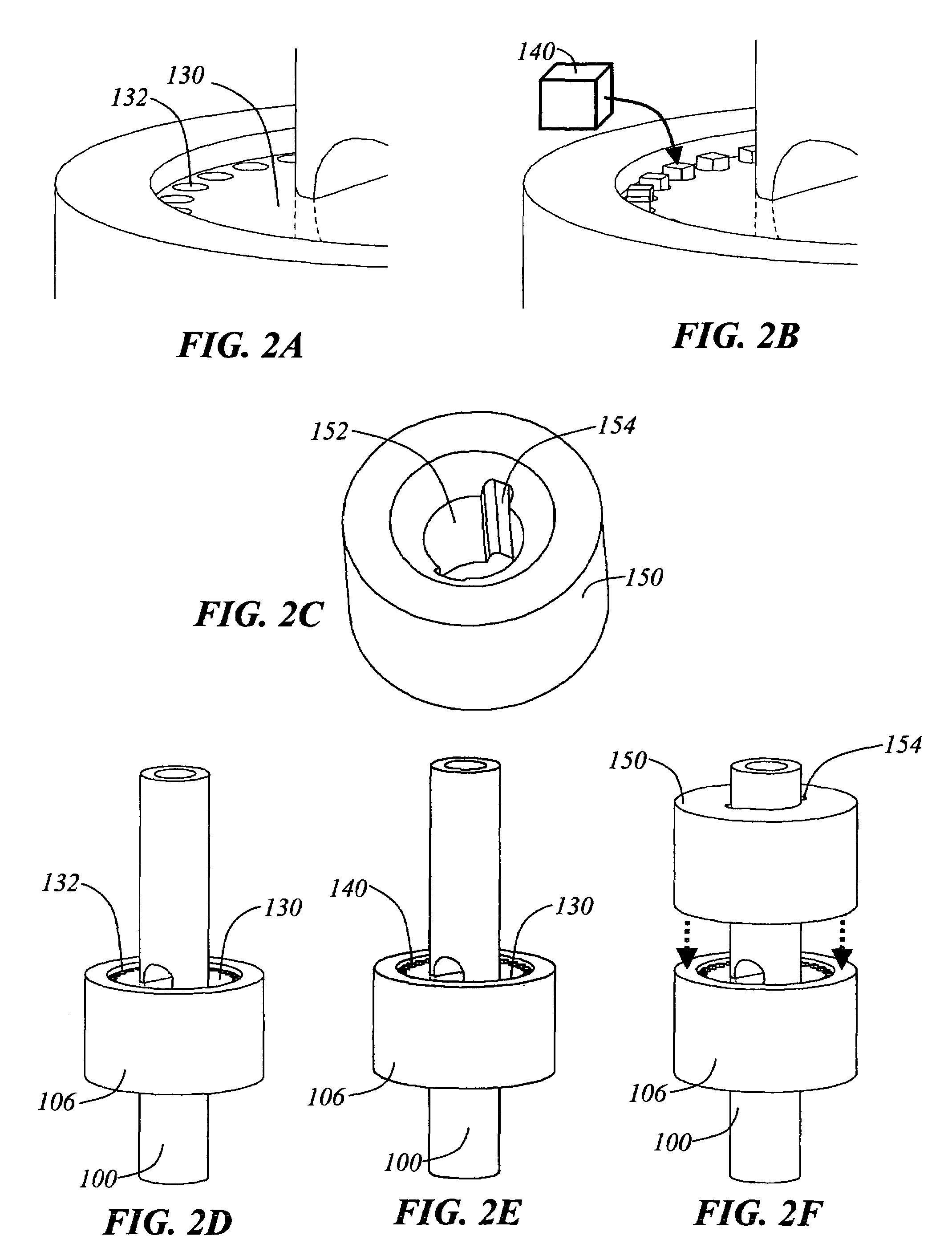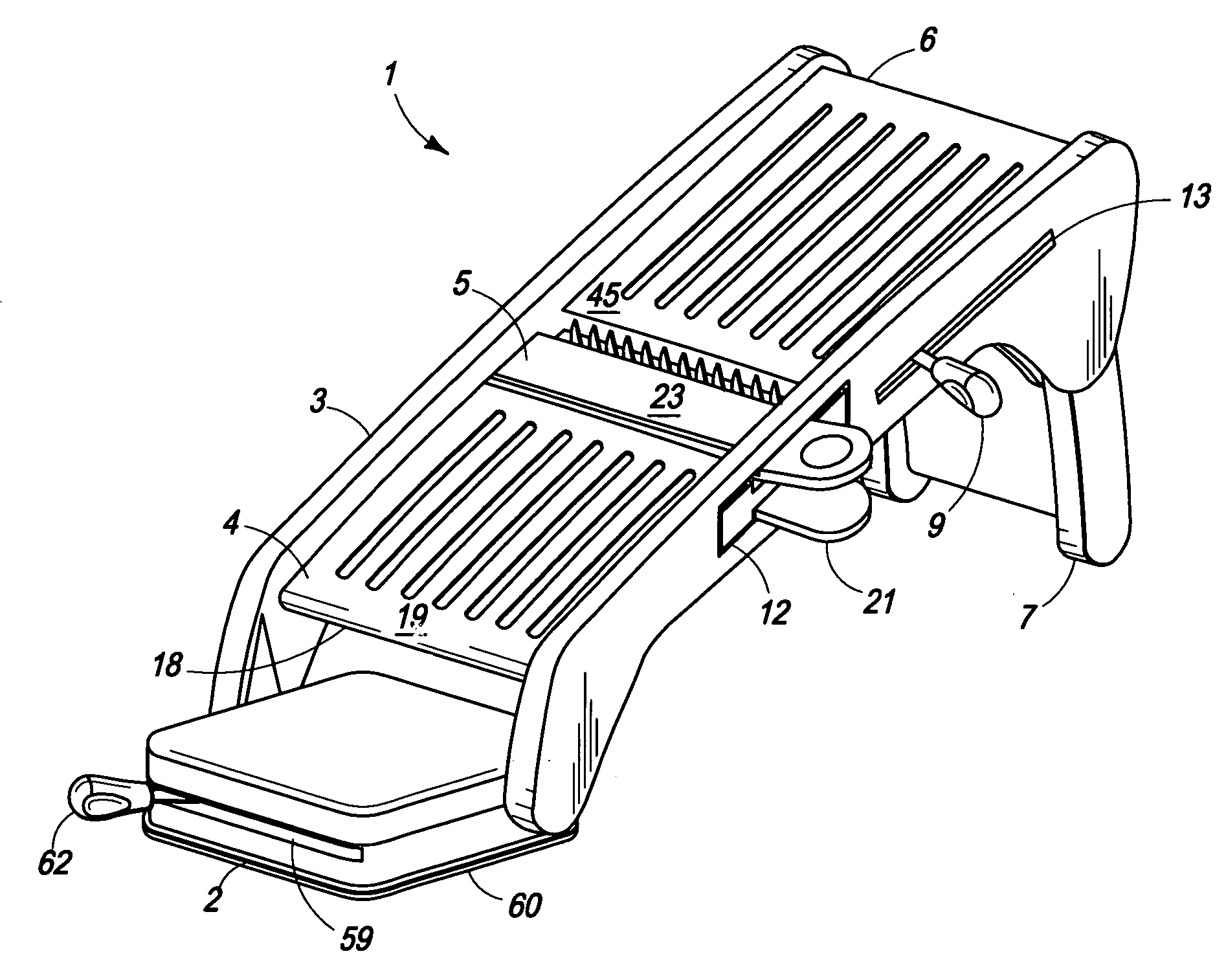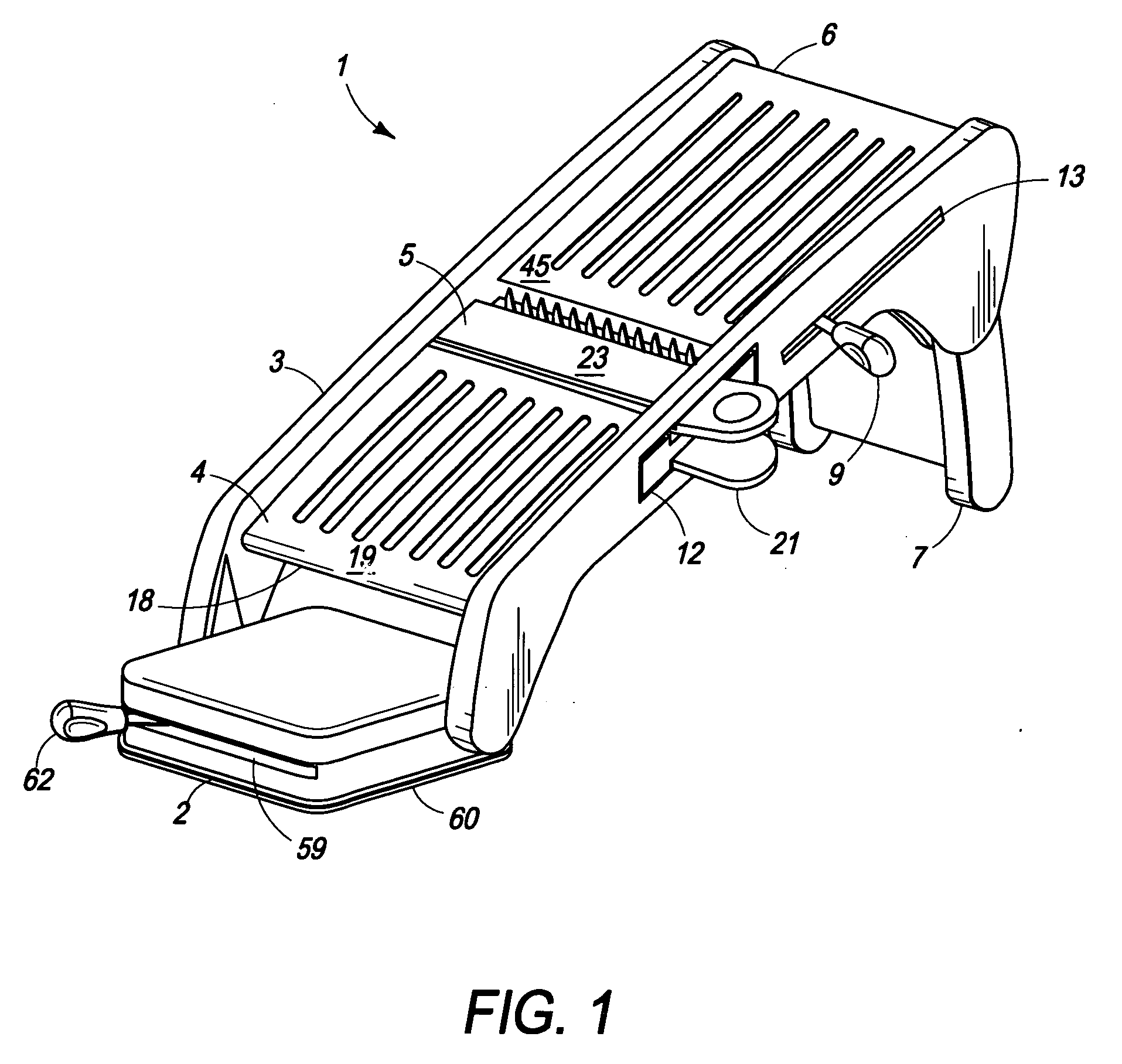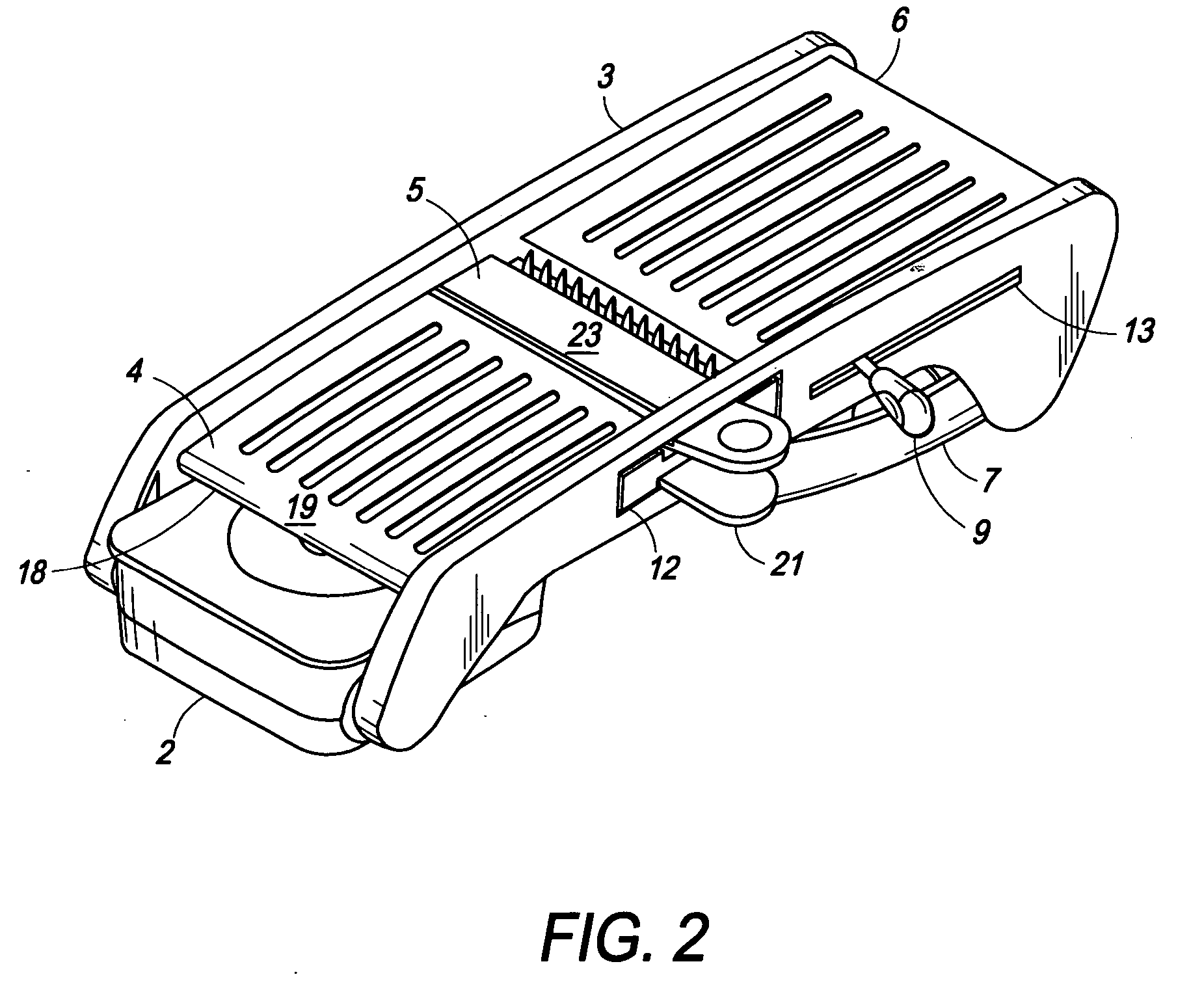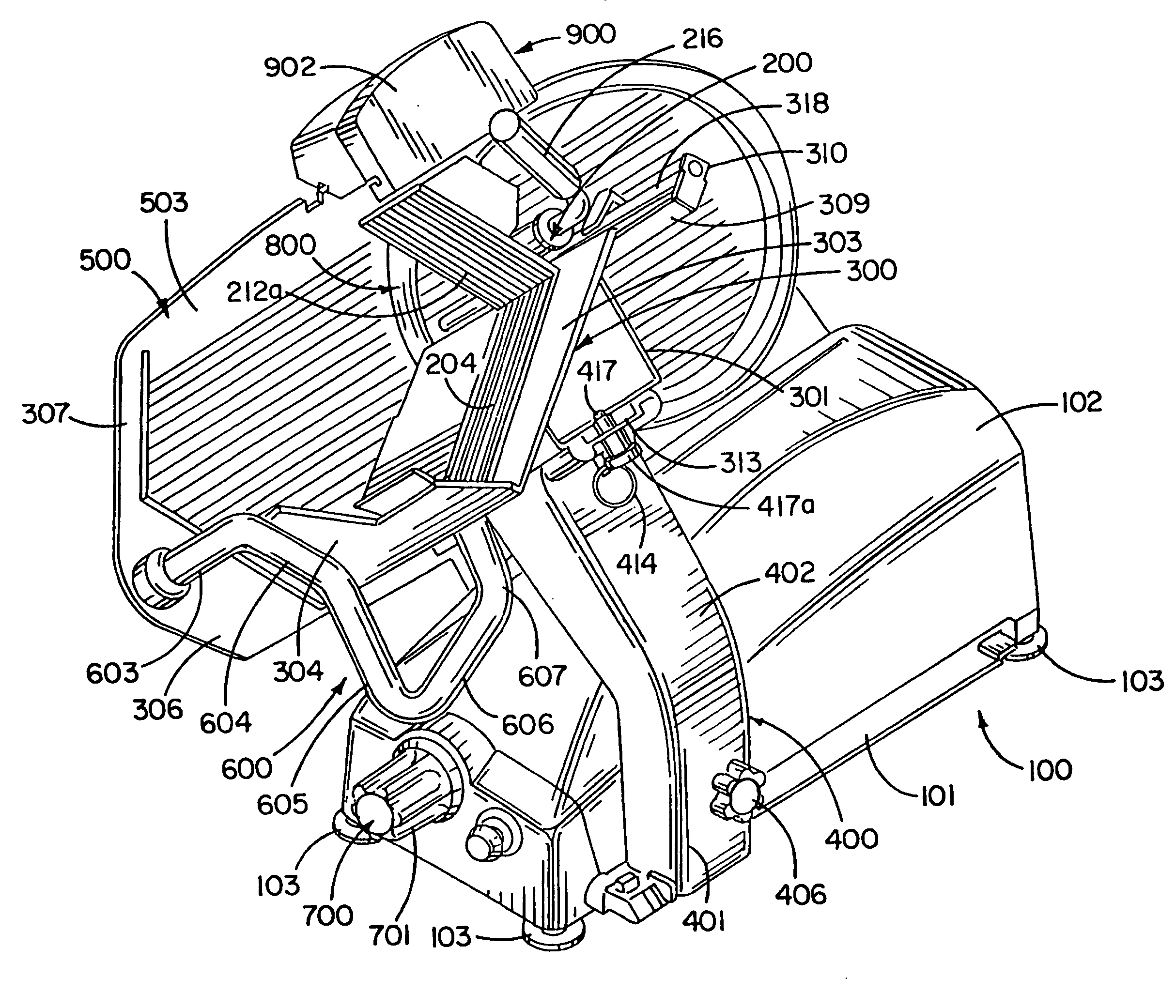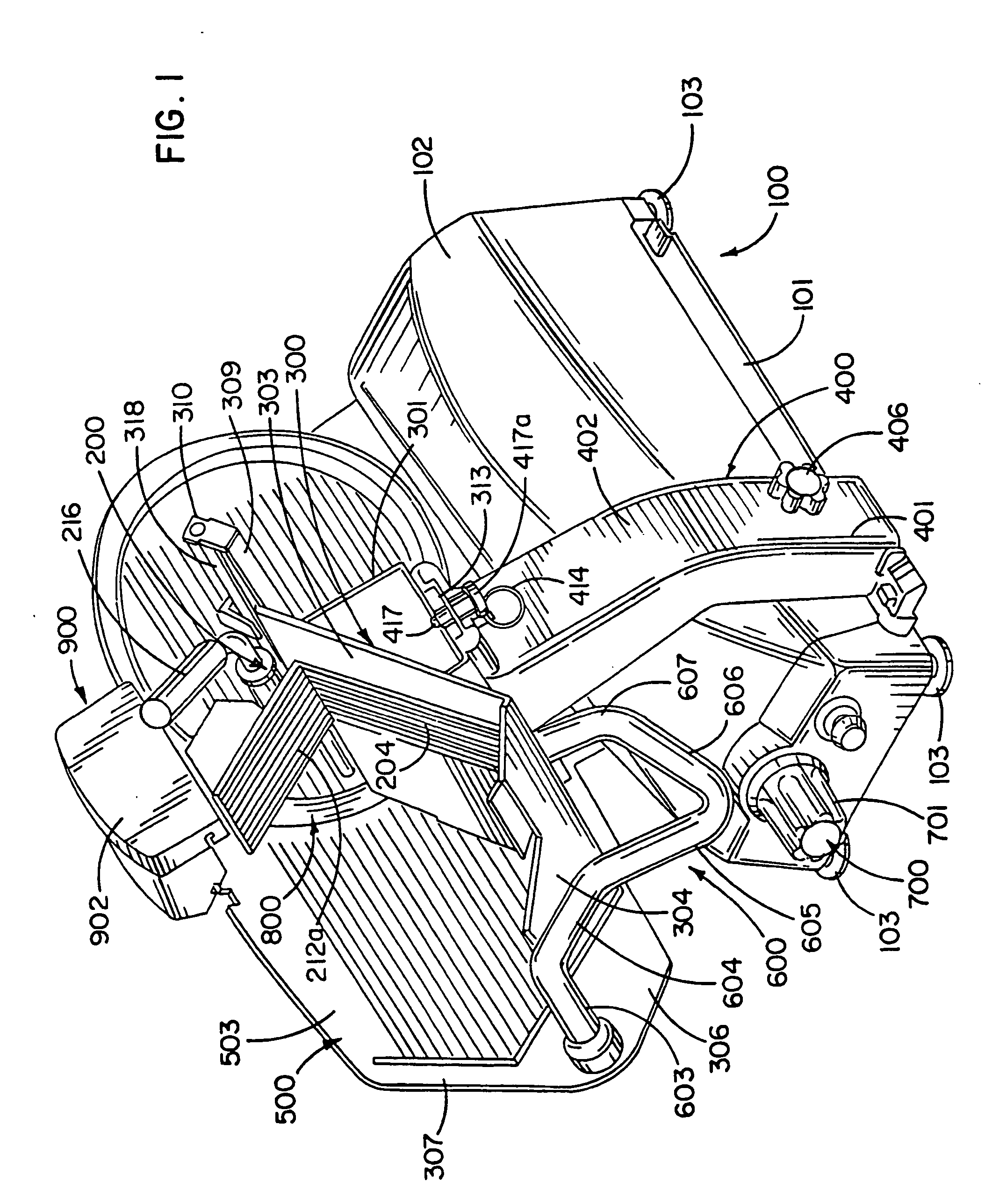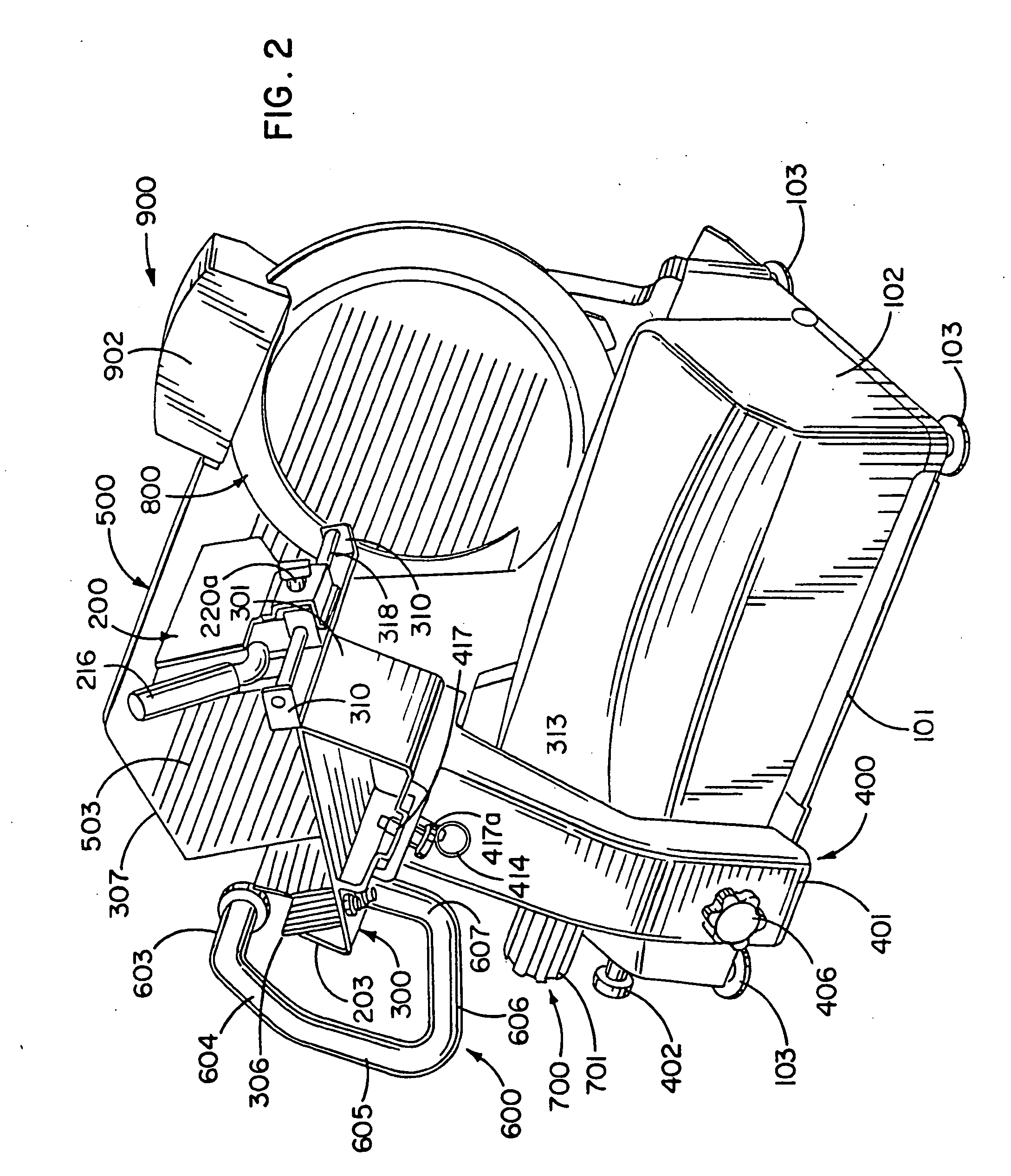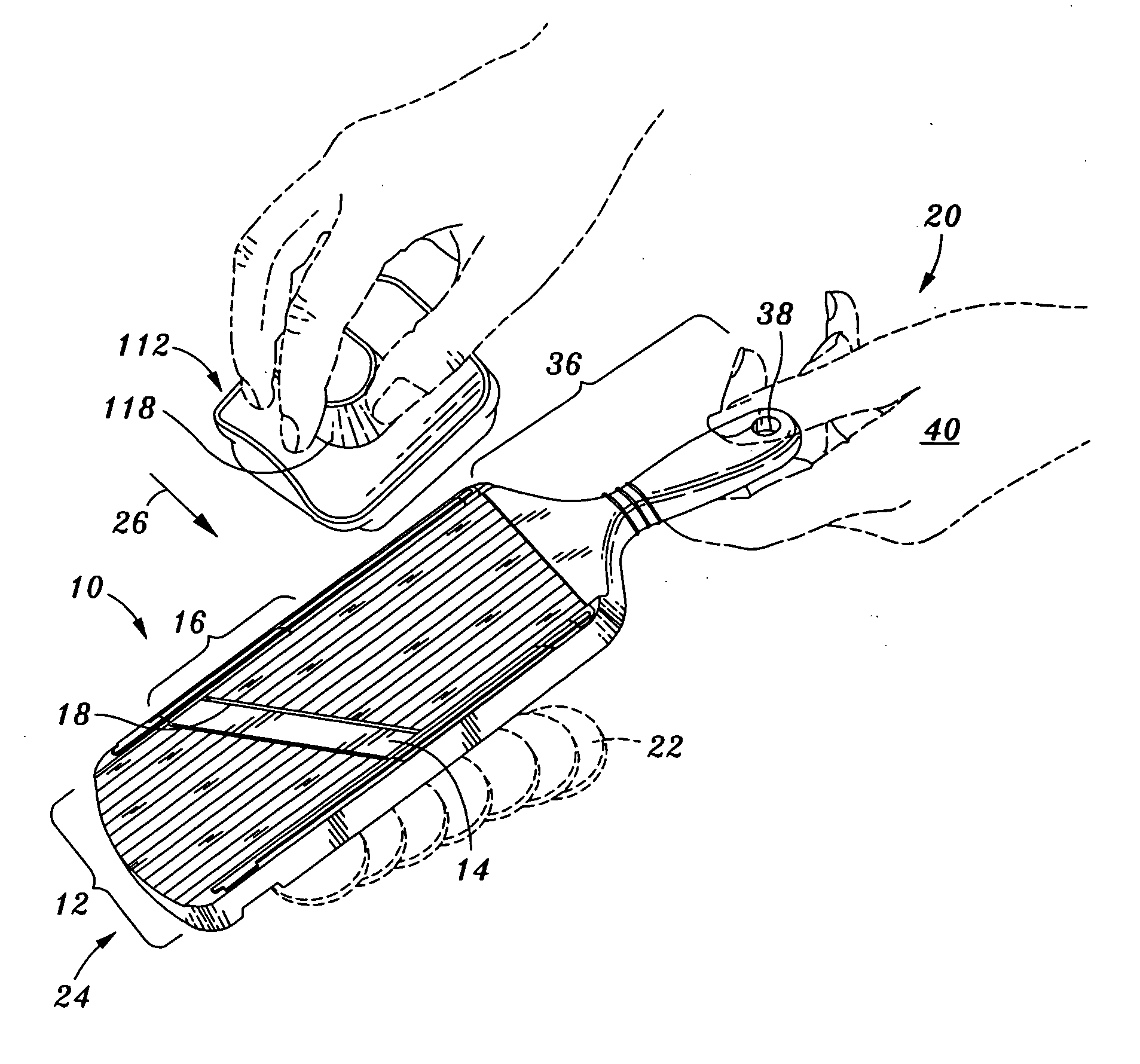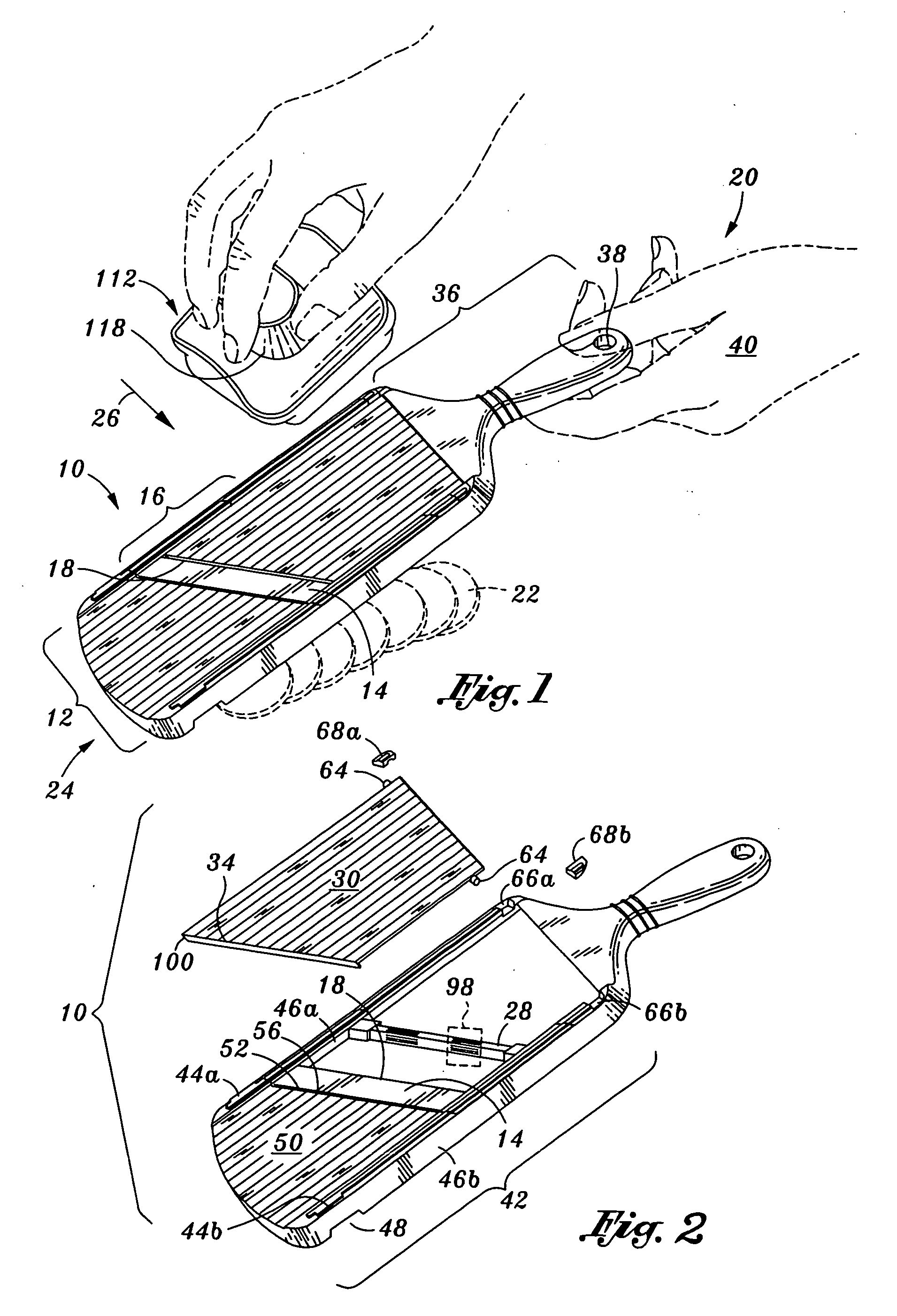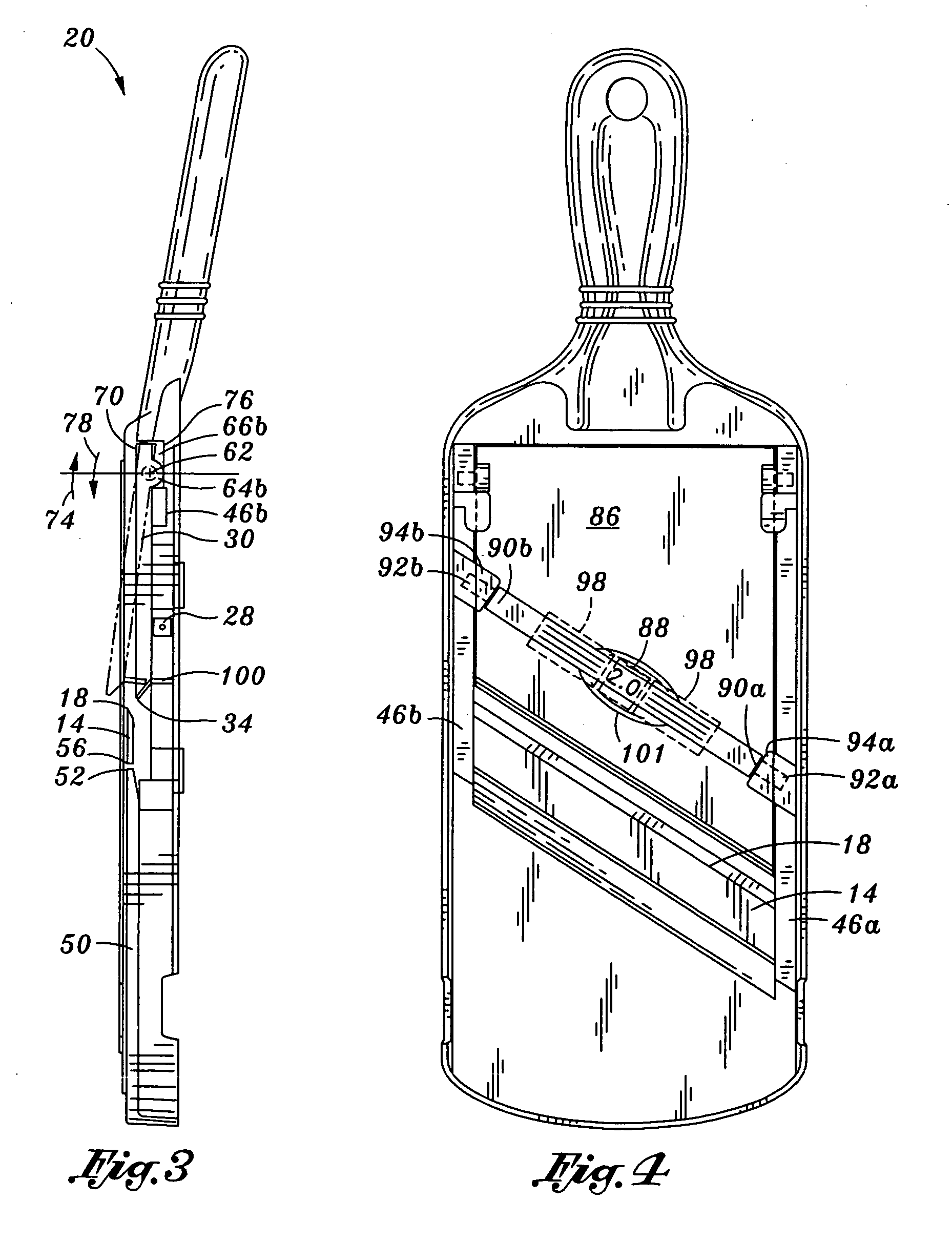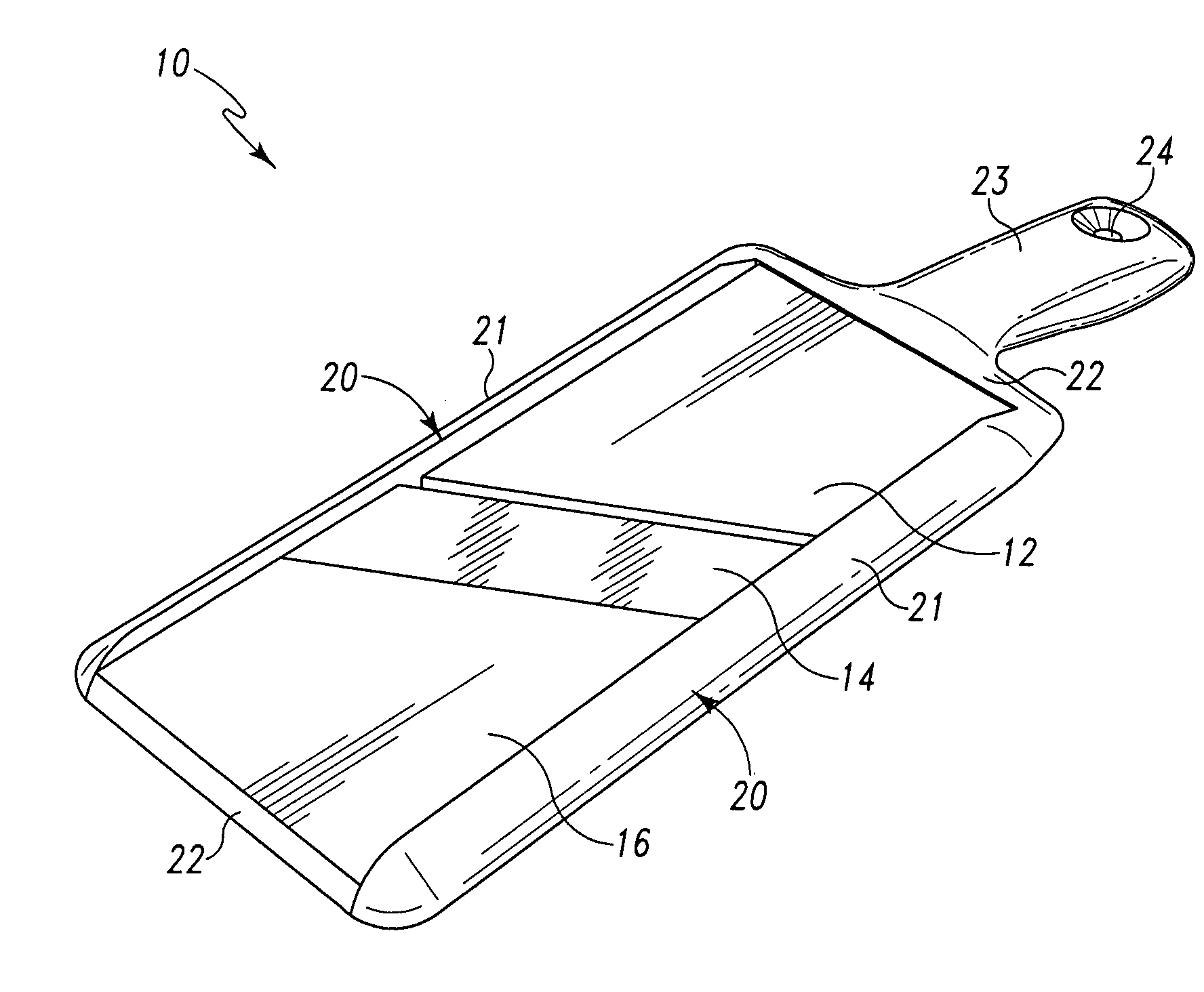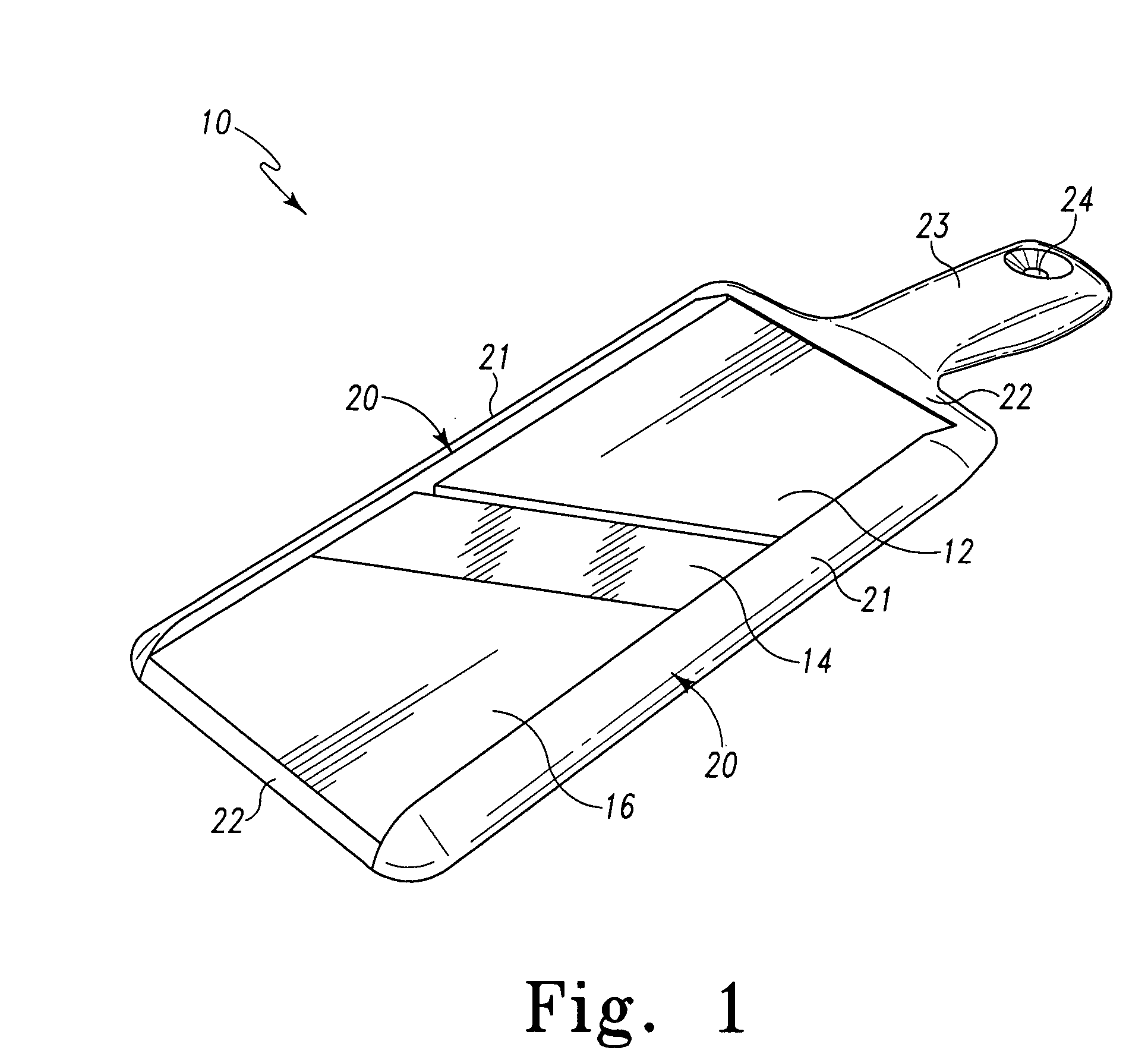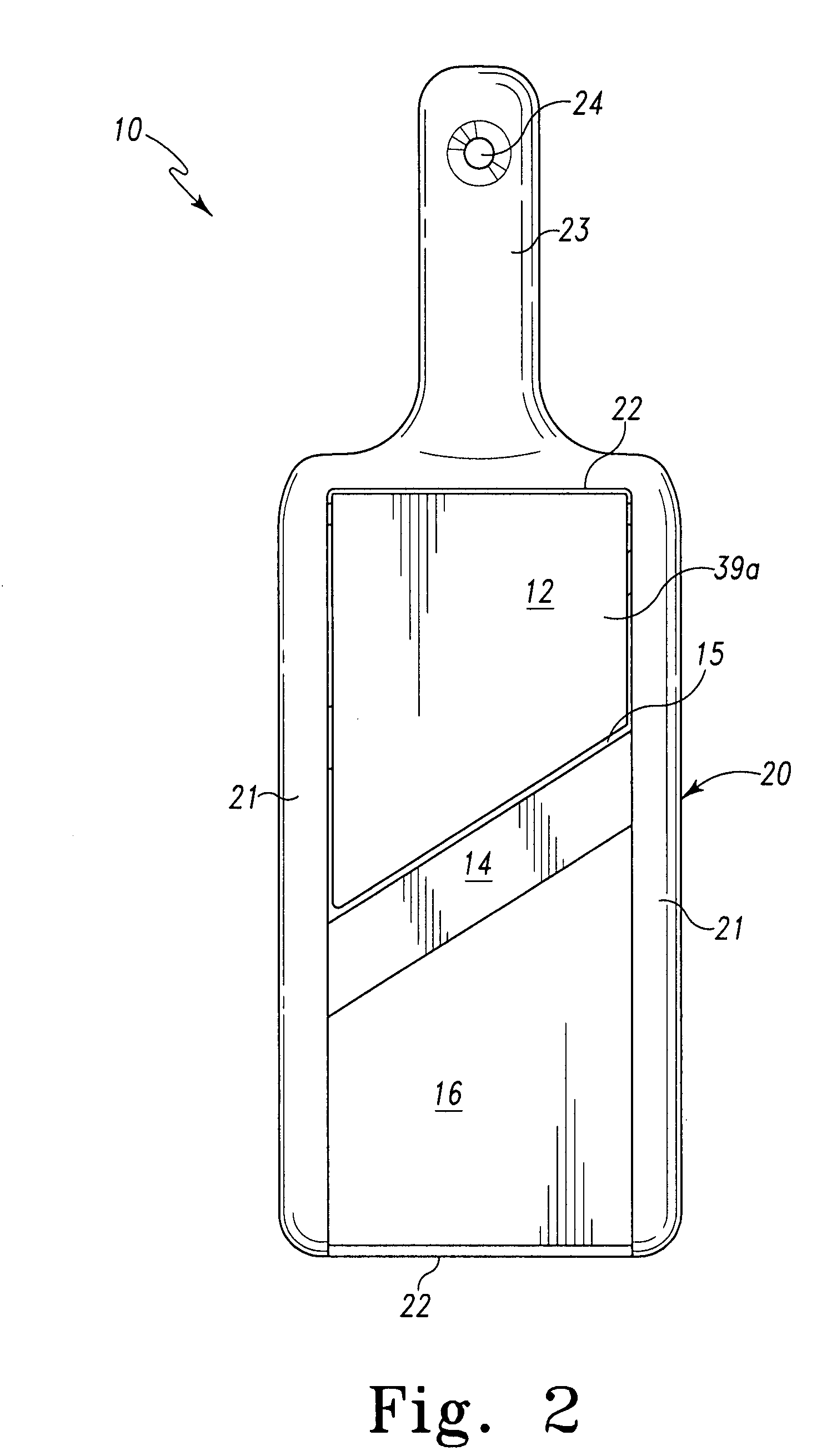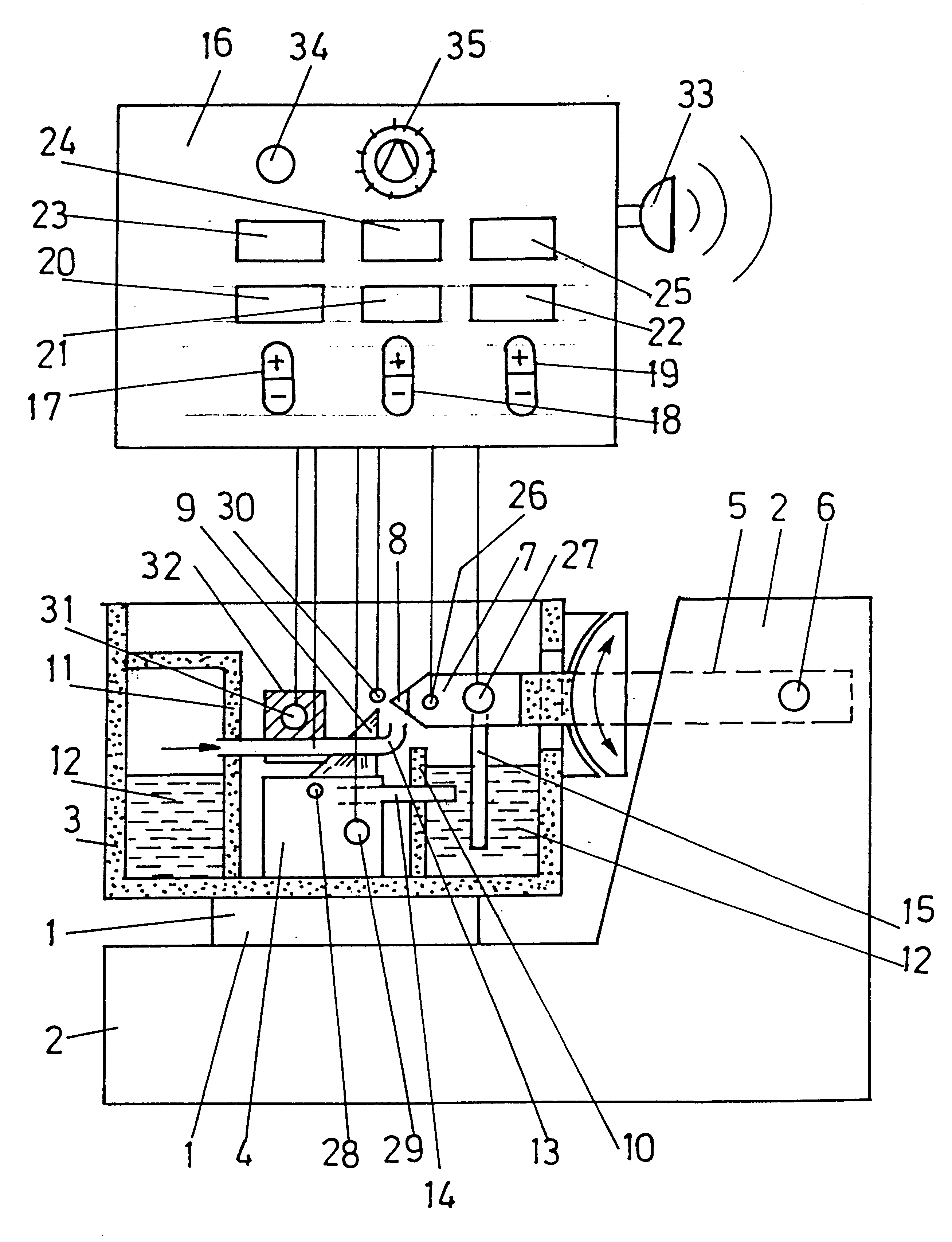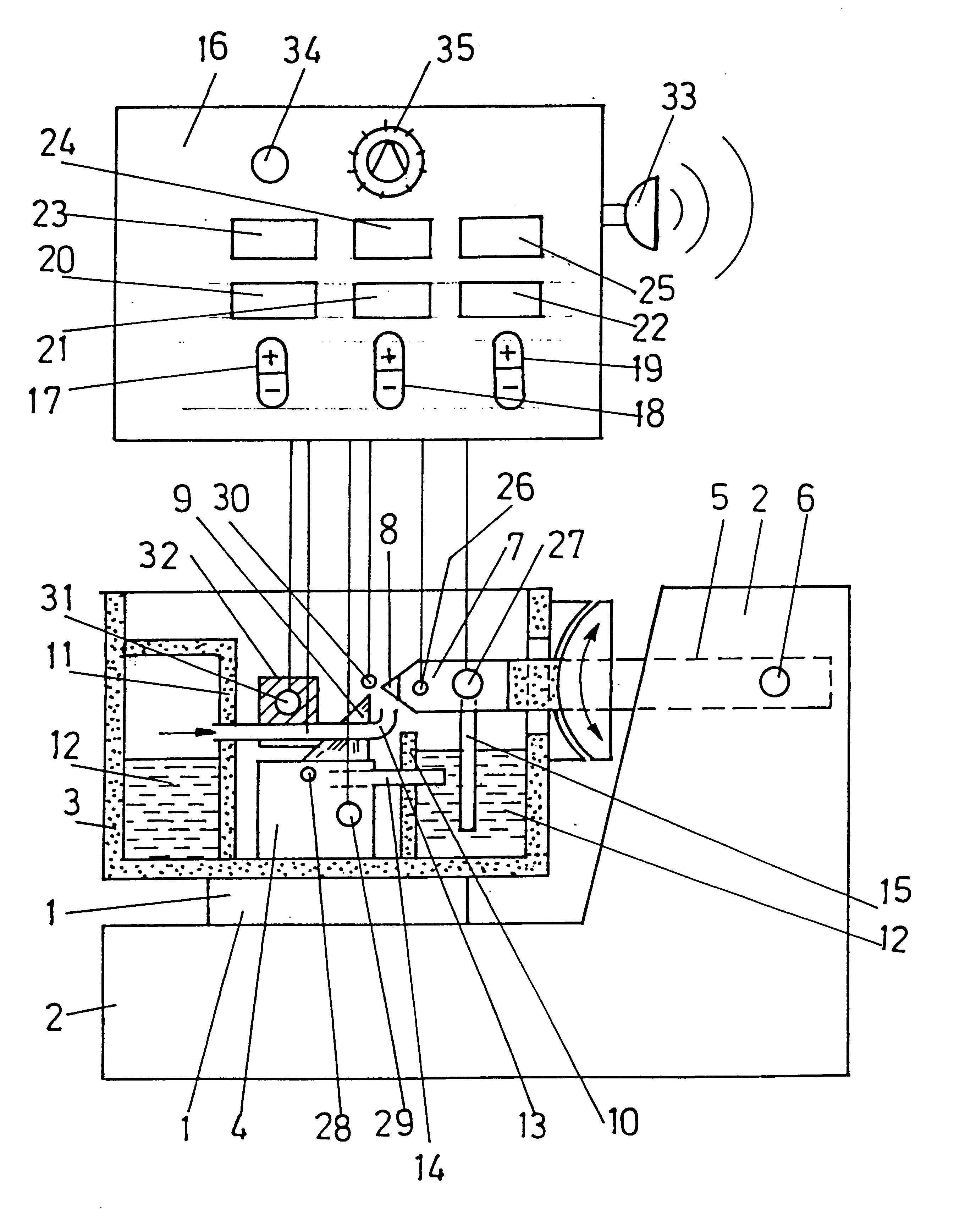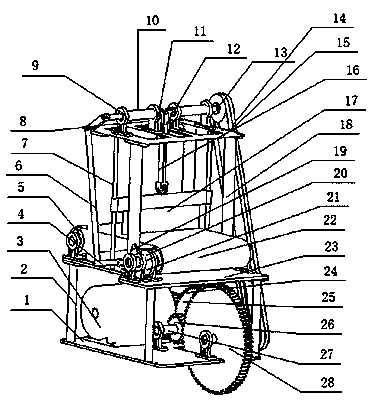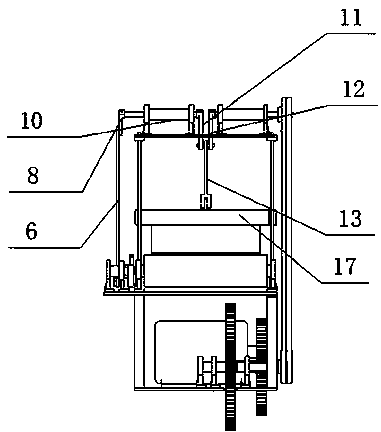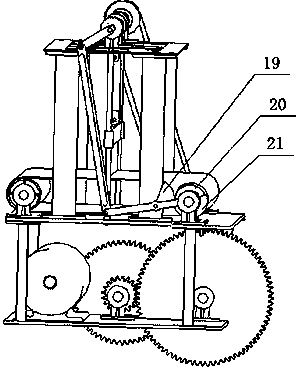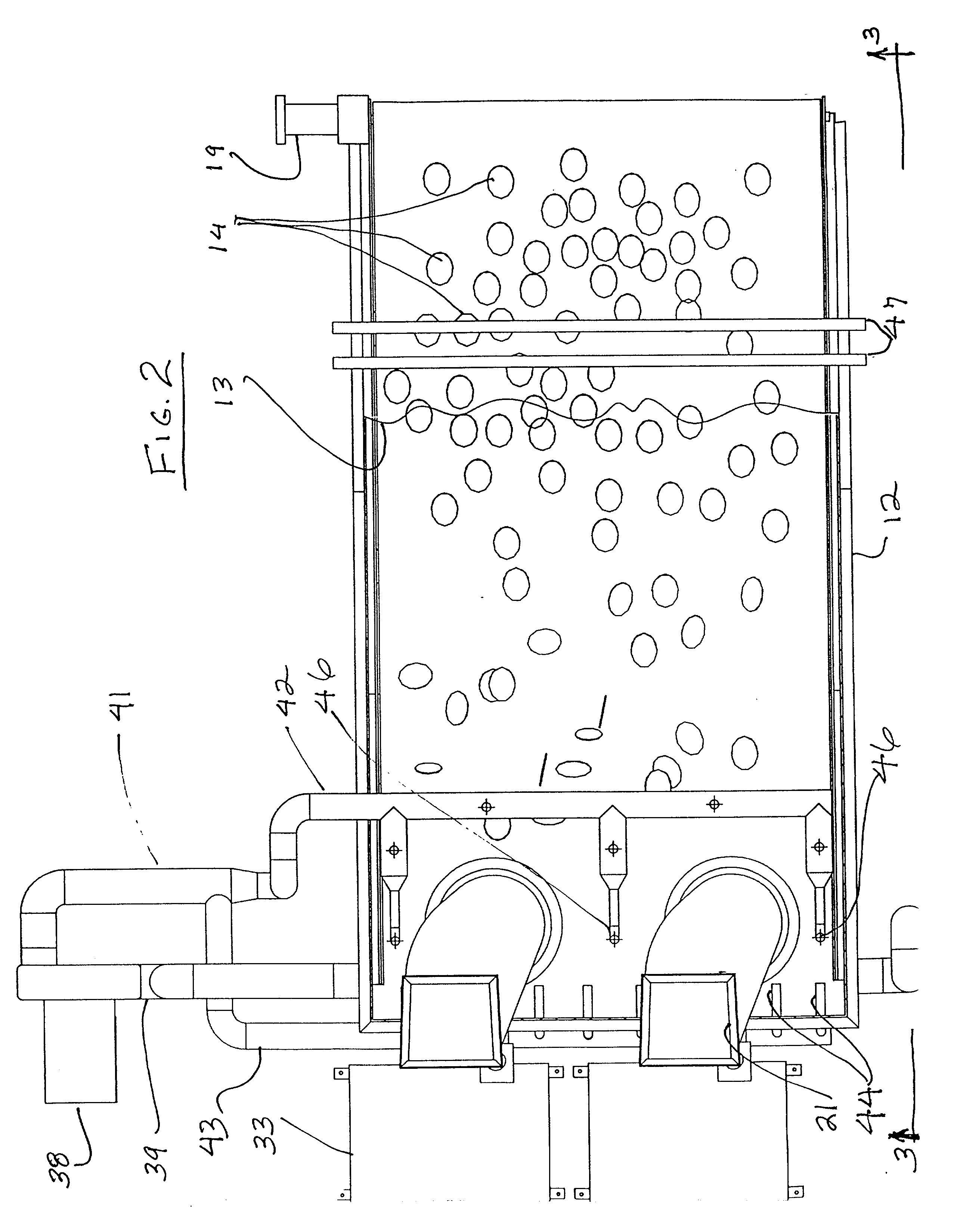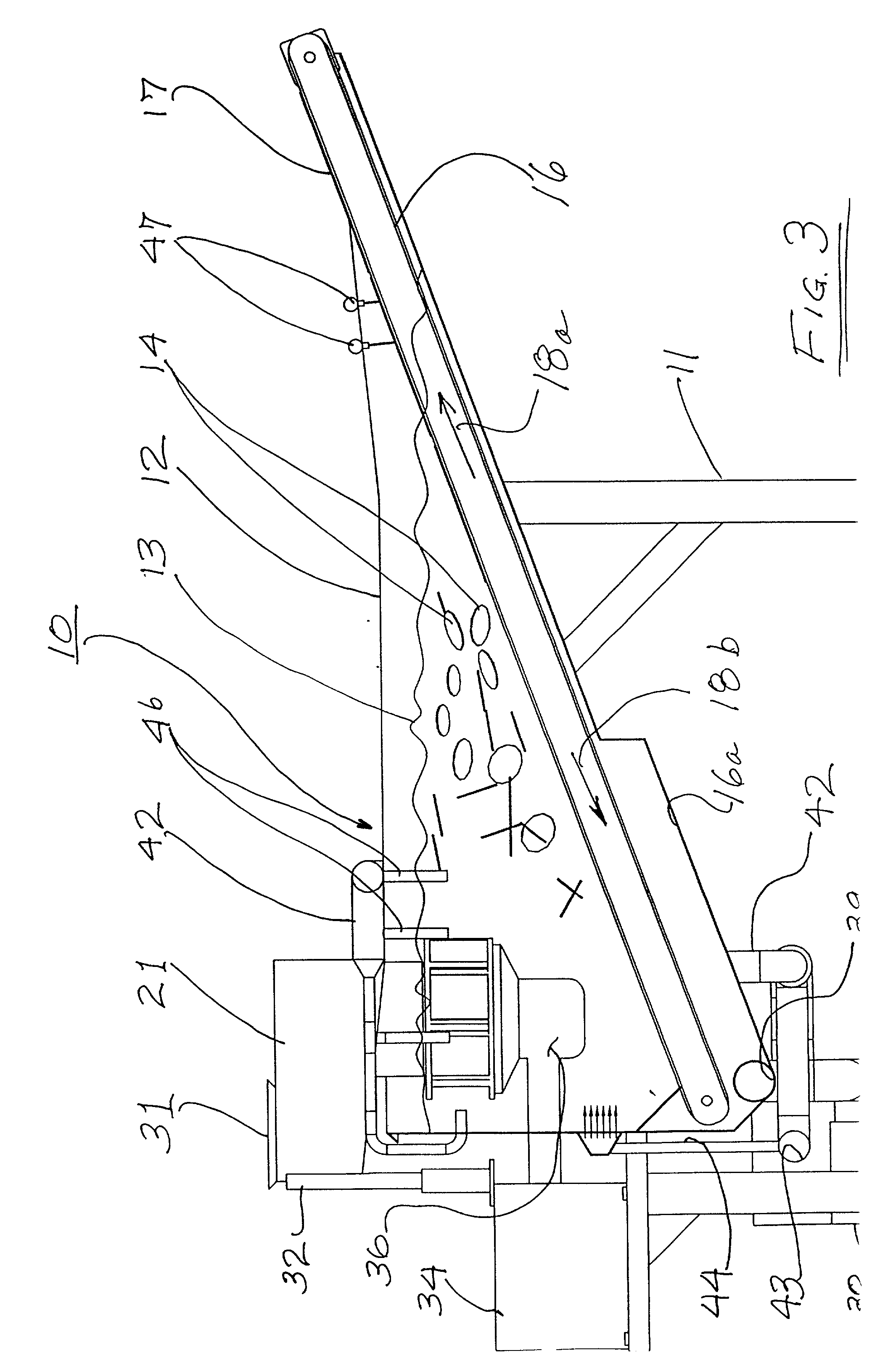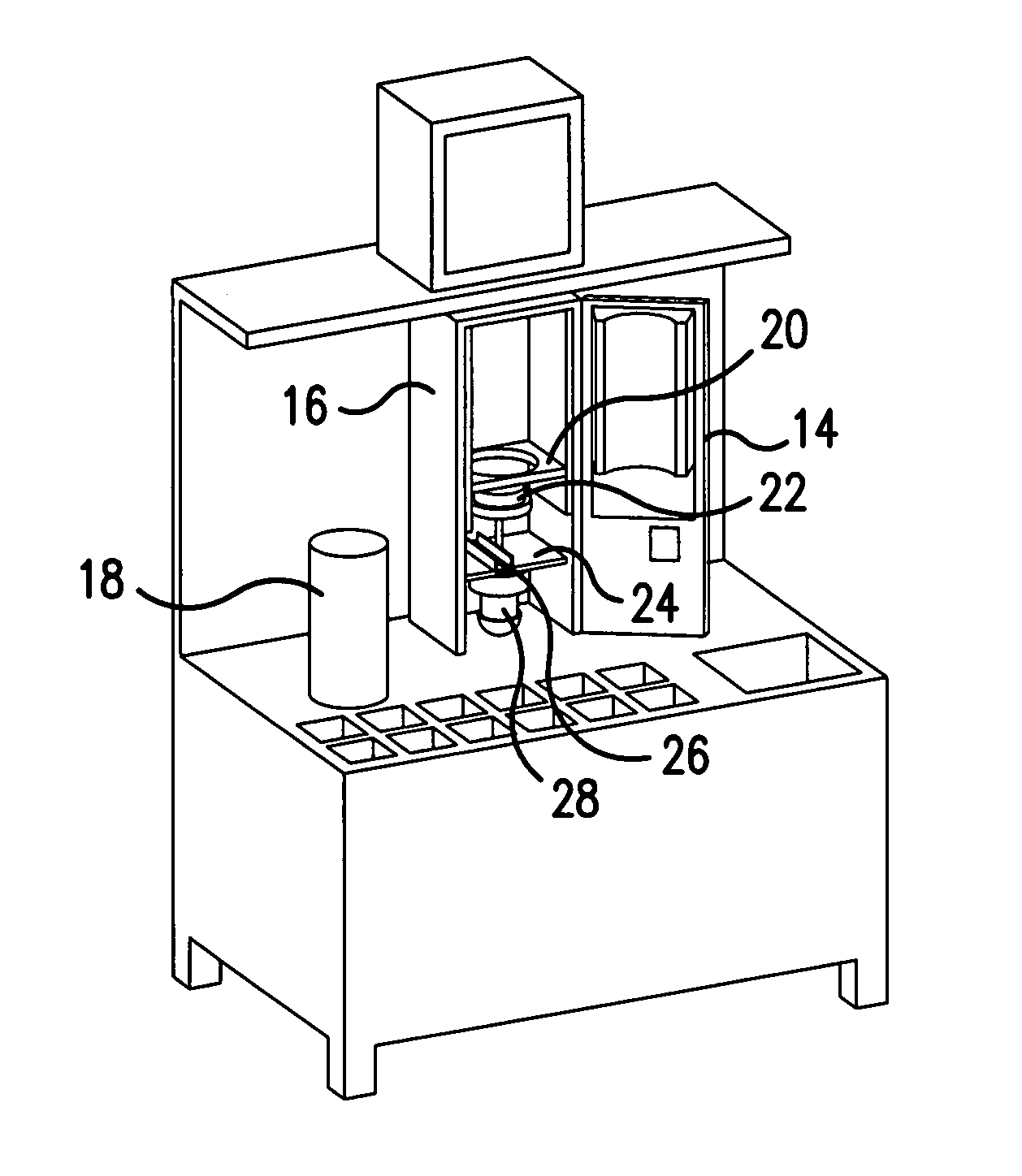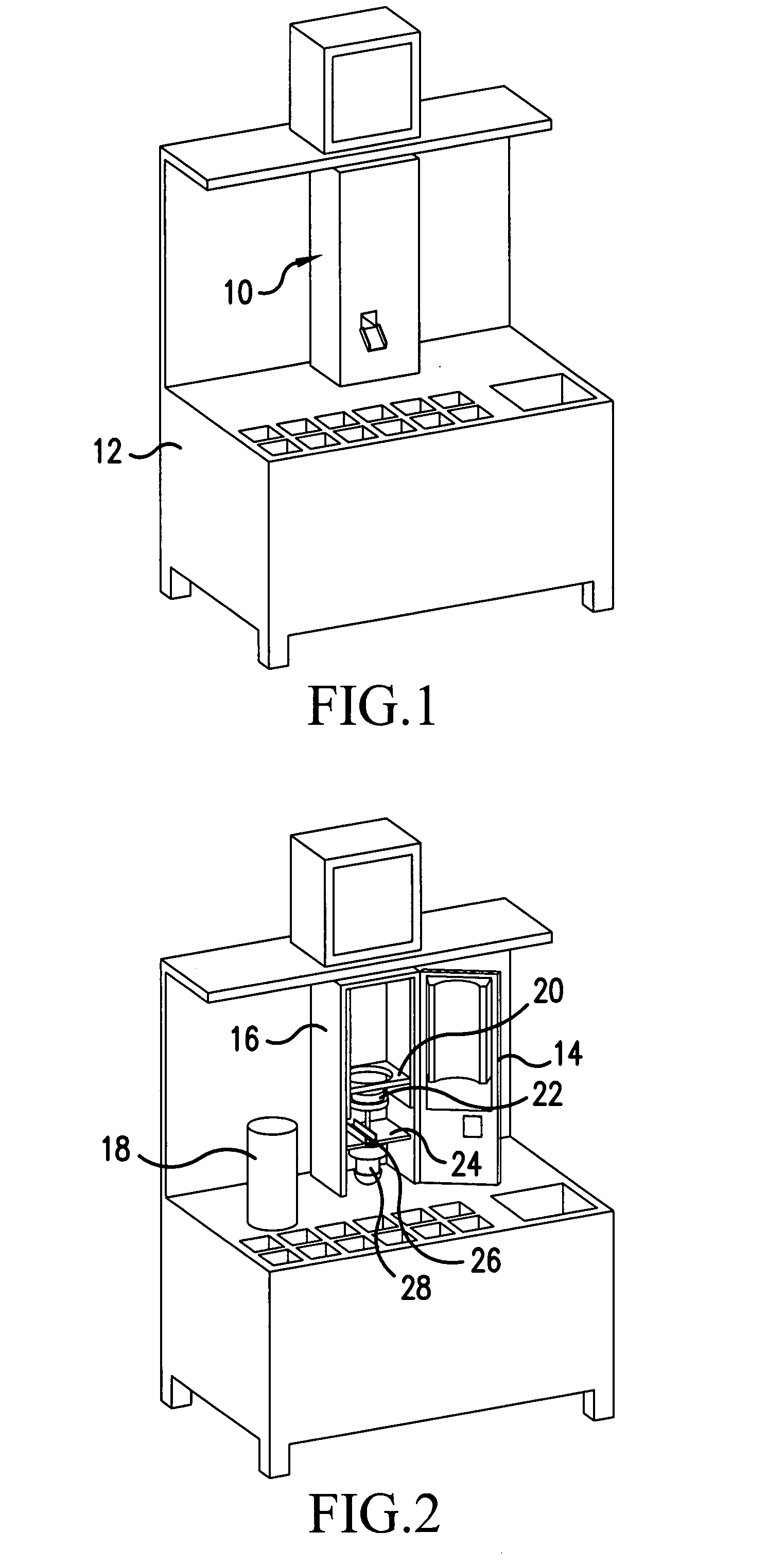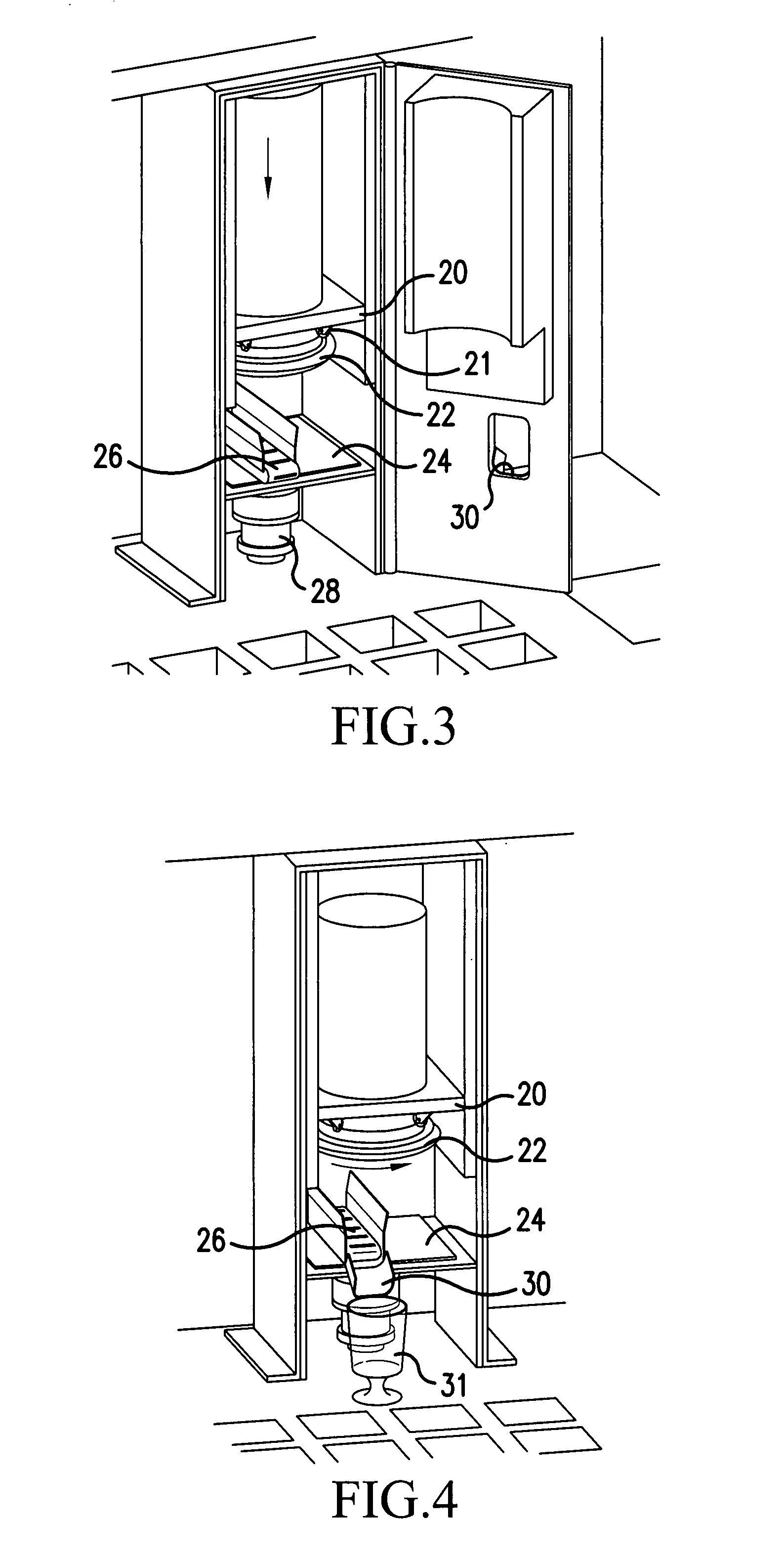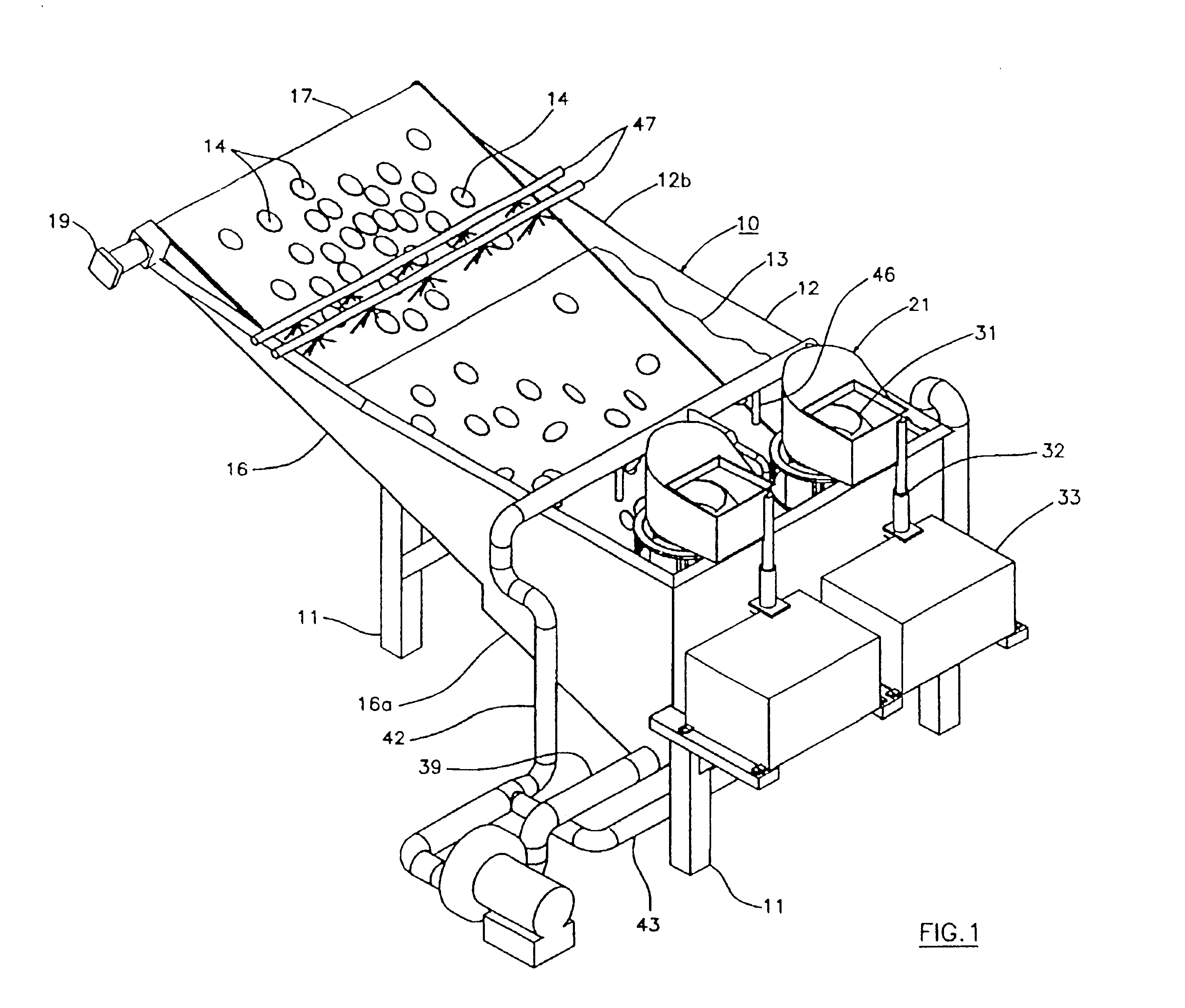Patents
Literature
Hiro is an intelligent assistant for R&D personnel, combined with Patent DNA, to facilitate innovative research.
1309 results about "Microtome" patented technology
Efficacy Topic
Property
Owner
Technical Advancement
Application Domain
Technology Topic
Technology Field Word
Patent Country/Region
Patent Type
Patent Status
Application Year
Inventor
A microtome (from the Greek mikros, meaning "small", and temnein, meaning "to cut") is a tool used to cut extremely thin slices of material, known as sections. Important in science, microtomes are used in microscopy, allowing for the preparation of samples for observation under transmitted light or electron radiation.
Apparatus and method for harvesting and handling tissue samples for biopsy analysis
InactiveUS7156814B1Exemption stepsReduce the numberBioreactor/fermenter combinationsBiological substance pretreatmentsTissue biopsyTissue fluid
A sectional cassette (10) for use in a process for harvesting and handling tissue samples for biopsy analysis is disclosed. In the procedure, a tissue biopsy sample is placed on a tissue trapping supporting material (A′) that can withstand tissue preparation procedures, and which can be cut with a microtome. The tissue is immobilized on the material, and the material and the tissue are held in the cassette (10) subjected to a process for replacing tissue fluids with wax. The tissue and supporting material are sliced for mounting on slides using a microtome. Harvesting devices and containers (200) using the filter material (202) are disclosed. An automated process is also disclosed.
Owner:BIOPATH AUTOMATION
Method and apparatus for measurement of microtome performance
A method and apparatus for monitoring and evaluating the performance and condition of histology laboratory microtomes and microtome accessories including knives, motor drives, and illumination devices. Irregularities in an image of the surface of a block mounted on the microtome are detected and characterized, the block having been subjected to mechanical sectioning by the microtome to produce a cut block face. The image of light reflected from the surface of the block, either specular or non-specular, is recorded and subjected to graphical analysis to extract, quantify, and interpret patterned features, including those indicating anomalies in the function of the microtome, its accessories, or the tissue block itself.
Owner:MICROSCI GROUP
Apparatus and method for harvesting and handling tissue samples for biopsy analysis
InactiveUS20070166834A1Exemption stepsReduce the numberPreparing sample for investigationBiological testingWaxTissue biopsy
A sectionable cassette for use in a process for harvesting and handling tissue samples for biopsy analysis is disclosed. In the procedure, a tissue biopsy sample is placed on a tissue trapping and supporting material that can withstand tissue preparation procedures and which can be cut with a microtome. The tissue is immobilized on the material and the material and the tissue are held in the cassette and are subjected to a process for replacing tissue fluids with wax, and then the tissue and the supporting material are sliced for mounting on slides using a microtome. Harvesting devices and containers using the filter material are disclosed. An automated process is also disclosed. One embodiment has the tissue trapping and supporting material porous and another embodiment includes a tissue supporting material that is not easily microtomed.
Owner:BIOPATH AUTOMATION
Rapid cell block embedding method and apparatus
ActiveUS6913921B2Maximize efficiencyReduce amountBioreactor/fermenter combinationsBiological substance pretreatmentsEngineeringReagent
A method and apparatus for embedding cells that utilizes a flow-through embedding technique maximizes the efficiency of extractions and decreases time for embedding the cell fragments, minimizes cell loss, and automatically positions cell samples at the position in which a microtome blade will section them. The apparatus includes a cell flow pathway defined by an inflow tube for delivering cell fragments from a cell sample to a sample port. The sample port is in fluid communication with a tissue cassette having attached thereto a filter. The cell flow pathway is in communication with a reagent flow pathway for delivering the reagents through the sample port to the cassette. The apparatus is configured such that the application of pressure directs the cell fragments from the cell sample through the cell flow pathway, and effects delivery of the reagents through the reagent flow pathway. The apparatus produces an embedded cell block having concentrated cells near the plane of the block to be sectioned in a quick and efficient manner.
Owner:MASSACHUSETTS UNIV OF
Easily adjustable mandolin type food slicer
An easily adjustable food slicer for cutting various foods having a frame with a sloped cutting surface that is equipped with interchangeable cutting blades that face a selectively positioned primary ramp that is pivotally joined to the frame opposite the location of the blades. The ramp is removable and has a non-abrasive, smooth surface that can be raised or lowered by the use of an infinitely-adjustable cam. The cam has a knob located on a side surface of the frame and can be adjusted at anytime before and during a process allowing a user to vary the thickness of the slice of food. Also provided is an alternative secondary ramp with an abrasive, grating surface for grating food that can be installed after removal of the primary ramp.
Owner:WANGLER ERIC J
Food Article Feed Apparatus for a Food Article Slicing Machine
ActiveUS20090120256A1Easy to controlHigh yieldMeat packaging/handling/transportingEngineering safety devicesConveyor beltIngested food
A food article feed apparatus for a food article slicing machine. The apparatus has conveyor with a drive belt for connecting a drive source to a drive roller, and a conveyor belt. The drive roller is for driving the conveyor. The drive roller has an outer diameter and a recessed diameter where the drive belt is connected around the recessed diameter and the conveyor belt is connected around the outer diameter. The drive belt operates within an area defined by the first conveyor belt.
Owner:PROVISUR TECHNOLOGIES INC
Microtome
InactiveUS20060179992A1Careful microtomyWithdrawing sample devicesPreparing sample for investigationLaserPhysics
The invention relates to a microtome, comprising a holding device with a support (3) for holding at least one portion of a processed object (4), and a severing means (6, 10, 13). Known microtomes of the aforementioned type have the disadvantage that the processed object must be fixed and there is limited freedom in the choice of guiding the cut. The invention avoids these disadvantages by the severing means comprising at least one laser radiation source (10) and means for focussing (6; 13) the laser radiation, and the beam focus (22) which has been produced by the focussing can be moved relative to the support (3) and can be guided to a location of the parting surface (19; 20) of the processed object (4) in order to effect severing of the material at this site. The invention furthermore relates to a process for microtomy which can be advantageously carried out with the microtome as claimed in the invention.
Owner:ROWIAK GMBH
Cassette and embedding assembly for handling and holding tissue samples during processing, embedding and microtome procedures, staging devices therefore, and methods therefor
ActiveUS20050147538A1Reduce processing stepsSave amountBioreactor/fermenter combinationsBiological substance pretreatmentsDetentTissue sample
The disclosure relates to a cassette, frame and mold for holding a tissue sample during an embedding and mircotoming process, and related methods. The cassette is sectionable in a microtome and includes a body with a bottom wall and a plurality of side walls. First and second side walls are generally V-shaped to present an apex of the “V” to the microtome blade. A lid of the cassette is stiffer than the bottom wall of the cassette to assist with positioning the tissue sample. The side walls of the cassette are perforated so as to significantly reduce the amount of cassette material that must be cut by the microtome blade. In one embodiment, to additionally reduce blade wear the ribs on one side wall are offset lengthwise relative to the ribs on an opposite side wall. An upper flange of the cassette includes depressions configured to register with detents in the frame.
Owner:BIOPATH AUTOMATION
Cassette for handling and holding tissue samples during processing, embedding and microtome procedures, and methods therefor
ActiveUS7179424B2Simple processEfficient cuttingPreparing sample for investigationSurgeryInterior spaceTissue sample
A cassette for holding a tissue sample includes a body having a bottom wall and a plurality of side walls extending upwardly with respect to the bottom wall to define an interior space for receiving the tissue sample. A lid is configured to be received in the interior space, and the cassette is sectionable in a microtome. Sensing elements are associated with the body or lid and configured to allow an automated sensing system to determine at least one characteristic of the cassette. A flange extends along upper portions of at least two of the side walls and includes a plurality of holes. Other features are included to more effectively and efficiently manufacture and use the cassette.
Owner:BIOPATH AUTOMATION
Method and apparatus for measuring and controlling blade depth of a tissue cutting apparatus in an endoscopic catheter
InactiveUS20030060842A1Surgical needlesDiagnostic markersPrecut sphincterotomyCommon bile duct dilatation
According to the present state of the art, endoscopic cannulation of the common bile duct and papillotomy and / or sphincterotomy of the Papilla of Vater and / or the Sphincter of Oddi is accomplished by advancing a sphincterotome (or papillotome or cannulotome) into an endoscope / duodenoscope so that the distal tip of the sphincterotome exits the endoscope adjacent the sphincter muscles at the Papilla of Vater. The endoscope mechanisms are then manipulated to orient the distal tip of the sphincterotome to the desired position for proper cannulation of the duct. Accurate and consistent control of the length of the exposed blade is made difficult due to a number of factors. These factors include: 1) differences in the inside diameters of the outer tube and the needle knife wire, 2) the orientation of the needle knife wire within the outer tube, 3) the mismatch of tolerance of the needle knife wire and the inside diameter of the extrusion, 4) anatomy, and 5) endoscope manipulation. A sphincterotome incorporating the present invention will provide the user with an indication of the exposed blade length and will allow the physician to control the length of the exposed blade. According to one embodiment of the present invention, various visual indications are presented to the user as the needle knife is advanced from its outer sheath. These visual indications, combined with a mechanical method to hold the knife in position during catheter placement allows the user to perform precise incisions. Presently available products that may be modified according to the present invention include, but are not limited to, Boston Scientific Sphincterotomes and Needle Knives.
Owner:BOSTON SCI SCIMED INC
System for conveying and slicing
InactiveUS20050092194A1Fast transferGently washedJuice extractionFruit stoningMechanical engineeringNovel food
A novel food processing system for dividing a flow of food items into a plurality of streams, gently and quickly transporting the food items along a flume of fluid propelled by eductors to several slicers, transversely slicing the food items at a controlled rate to maximize yield, washing the slices, transporting the slices and controllably distributing the slices onto a conveyor for further processing. In accordance with one embodiment of the present invention, the food processing system comprises an oversized-product separator, a segmented cutter, a mass-flow / spreading conveyor, a diverter stage, an eductor stage, a dewatering stage, a starch removal stage, a slicer infeed conveyor, at least one transverse slicer, and a slice spreader. In a preferred embodiment, cutting losses are decreased by minimizing slicing speeds.
Owner:FRITO LAY NORTH AMERICA INC
Semiconductor element and method for producing the same
InactiveUS7183136B2High yieldLow costLaser detailsSemiconductor laser structural detailsTectorial membraneIrradiation
A plurality of Group III nitride compound semiconductor layers are formed on a substrate for performing the formation of elements and the formation of electrodes. The Group III nitride compound semiconductor layers on parting lines are removed by etching or dicing due to a dicer so that only an electrode-forming layer on a side near the substrate remains or no Group III nitride compound semiconductor layer remains on the parting lines. A protective film is formed on the whole front surface. Separation grooves are formed in the front surface of the substrate by laser beam irradiation. The protective film is removed together with reaction products produced by the laser beam irradiation. The rear surface of the substrate 1s is polished to reduce the thickness of the substrate. Then, rear grooves corresponding to the latticed frame-shaped parting lines are formed in the rear surface of the substrate. The substrate is divided into individual elements along the parting lines.
Owner:TOYODA GOSEI CO LTD
Surface mount antenna, method of manufacturing same, and communication device
ActiveUS6891507B2Design be easeShorten speedSimultaneous aerial operationsAntenna supports/mountingsSurface mountingResonance
A surface mount antenna includes a conductive film provided on four continuous surfaces, that is, a front end surface, a top surface, a rear end surface, and a bottom surface, of a dielectric substrate. A plurality of slits is formed in the conductive film so as to divide the conductive film into a plurality of conductive film parts. At least one of the divided conductive film parts functions as a radiation electrode. Sides of one of the slits, that is, the slit forming an open end of the radiation electrode, are formed by a dicer. The position of the open end of the radiation electrode affects the resonance frequency of the radiation electrode. Since the dicer can cut with high precision, the open end can be provided substantially at a desired position, whereby the radiation electrode can generate a substantially the desired resonance frequency.
Owner:MURATA MFG CO LTD
Article slicer
ActiveUS20060225547A1Maintain hygieneLarge breadthMetal sawing devicesGang saw millsEngineeringShipping container
Tomatoes are placed on parallel cutter blades (20) in article openings (46) of an article positioning plate (44). Alternate blades are oscillated in arcuate paths in opposite direction as article pushers (24) move downwardly, pushing the tomatoes through the parallel cutter blades (20). The end slices of the tomatoes are gathered separately in the collectors (96) and are later discarded, while the intermediate slices are received in a transfer plate (78). Gathering plates (100) urge the intermediate slices of the several tomatoes together in one accumulation of tomato slices, and the transfer plate (78) is lowered to a position immediately above the shipping containers (80) and opened to deposit the tomatoes in the shipping containers. A fluid spray nozzle (75) may be positioned to emit a spray of gas or liquid between the fins of the pushers and / or toward the cutter blades (20) and toward engagement with the tomatoes for sterilizing, cleaning, or other treatment of the tomatoes and the adjacent surfaces.
Owner:CSP TECH INC
Methods, apparatuses and systems for collection of tissue sections
ActiveUS20140026683A1Reduce the potential for damageEnhance the imageWithdrawing sample devicesVivisection diagnosticsTissue sampleFluid level
Methods, apparatuses and systems for facilitating automated or semi-automated collection of tissue samples cut by a microtome. In one example, a collection apparatus may be moved back and forth between respective positions at which the collection apparatus is operatively coupled to a microtome so as to collect cut tissue samples, or routine access to the microtome is provided. Relatively easy movement and positioning of the collection apparatus is facilitated, while at the same time ensuring structural stability and appropriate alignment and / or isolation between the collection apparatus and the microtome. A fluid reservoir receives samples cut by the microtome, and the collection apparatus may collect samples via a conveyor-like substrate disposed near / in the reservoir. A linear movement of the substrate may be controlled based on a cutting rate of the microtome, and the fluid level in the reservoir may be automatically maintained to facilitate effective sample collection.
Owner:PRESIDENT & FELLOWS OF HARVARD COLLEGE
Hand held slicer
A hand-held slicing device having a handle connected to a slicing tray. The slicing tray includes a ramp leading to a fixed blade. The ramp is readily adjustable such that the height of the edge of the ramp most closely adjacent the blade can be raised or lowered. In one version, the ramp can be raised or lowered by sliding a support structure connected to a knob that can be slideably adjusted by the user's thumb. The device may include a series of julienne blades that are selectively extendable above the slicing ramp or retractable below the ramp.
Owner:PROGRESSIVE INT
Sample slice preparation device and sample slice preparation method
ActiveUS20070039435A1Improve handlingReduce dependenceWithdrawing sample devicesSurgeryApplied waterSlice preparation
A sample slice preparation device of the present invention has a microtome which slices a solid specimen by a knife, a humidifier which imparts moisture to a carrier tape, slice conveyer means for adsorbing a slice by an adsorbing force of moisture imparted to the carrier tape to feed out the slice, transfer mechanism for applying water to the surface of a slide glass to transfer the slice from the carrier tape onto the slide glass by an adsorbing force of applied water, an extension unit which heats the slide glass having the slice adsorbed thereon to evaporate the moisture, thereby extending the slice, and slide glass conveyer means for conveying the slide glass provided with the slice.
Owner:TOSHIBA MASCH CO LTD
Cassette for handling and holding tissue samples during processing, embedding and microtome procedures, and methods therefor
ActiveUS20050084425A1Efficient cuttingLess dullingPreparing sample for investigationSurgeryInterior spaceTissue sample
A cassette for holding a tissue sample includes a body having a bottom wall and a plurality of side walls extending upwardly with respect to the bottom wall to define an interior space for receiving the tissue sample. A lid is configured to be received in the interior space, and the cassette is sectionable in a microtome. Sensing elements are associated with the body or lid and configured to allow an automated sensing system to determine at least one characteristic of the cassette. A flange extends along upper portions of at least two of the side walls and includes a plurality of holes. Other features are included to more effectively and efficiently manufacture and use the cassette.
Owner:BIOPATH AUTOMATION
Methods and apparatus for providing and processing sliced thin tissue
InactiveUS20100093022A1Facilitate subsequent imagingPromote the fullTemperatue controlStatic/dynamic balance measurementSlice thicknessTissue sample
Methods and apparatus for providing and processing serial tissue sections. In one example, an “automatic tape collecting lathe ultramicrotome” (ATLUM) slices a block of tissue sample having various geometries into a continuous ribbon of thin tissue, or multiple thin tissue sections, and disposes the sliced thin tissue on an appropriate substrate to facilitate subsequent imaging of the sliced thin tissue. Closed-loop control of section thickness of the sliced thin tissue sections or ribbons is implemented to produce thinner sliced tissue sections or ribbons and tightly regulate thickness. Thin tissue sections or ribbons may be particularly processed / prepared to facilitate imaging with a scanning electron microscope (SEM). Collected thin tissue sections or ribbons may be used to create UltraThin Section Libraries (UTSLs) that allow for fully automated, time-efficient imaging in the SEM to facilitate expansive tissue studies.
Owner:PRESIDENT & FELLOWS OF HARVARD COLLEGE
Cassette and embedding assembly for handling and holding tissue samples during processing, embedding and microtome procedures, staging devices therefore, and methods therefor
ActiveUS7776274B2Reduce and prevent and crackingReduce the amount requiredBioreactor/fermenter combinationsBiological substance pretreatmentsDetentTissue sample
The disclosure relates to a cassette, frame and mold for holding a tissue sample during an embedding and mircotoming process, and related methods. The cassette is sectionable in a microtome and includes a body with a bottom wall and a plurality of side walls. First and second side walls are generally V-shaped to present an apex of the “V” to the microtome blade. A lid of the cassette is stiffer than the bottom wall of the cassette to assist with positioning the tissue sample. The side walls of the cassette are perforated so as to significantly reduce the amount of cassette material that must be cut by the microtome blade. In one embodiment, to additionally reduce blade wear the ribs on one side wall are offset lengthwise relative to the ribs on an opposite side wall. An upper flange of the cassette includes depressions configured to register with detents in the frame.
Owner:BIOPATH AUTOMATION
Methods and apparatuses for the automated production, collection, handling, and imaging of large numbers of serial tissue sections
ActiveUS7677289B2Create efficientlyLamination ancillary operationsElectric discharge tubesMagnetic tapeSoftware engineering
Owner:PRESIDENT & FELLOWS OF HARVARD COLLEGE
Food slicer with suction device and adjustable cutting surface
A mandoline slicer having a blade, a pivotable platform and a compact, low profile suction device in a housing that is hinged to the front of the slicer so that the suction device may be rotated under the slicer for storage and rotated at least partially outward from the front of the slicer for use. The height of a front edge of the platform is changed in relation of the height of the blade by moving a lever horizontally in a slot in a side of the slicer. The lever is geared so that the changes in the height of the front edge of the platform are incremental. Thus, the thickness of food slices moved over the platform and into the blade may be varied by know incremental amounts. Rear legs, which are foldable under the slicer for storage, contain compartments or slots for convenient, compact storage of slicer attachments.
Owner:LIFETIME BRANDS
Slicing machine, method of use and components thereof
InactiveUS20060150791A1Quality improvementEasy to operateMetal sawing devicesFeeding devicesRisk strokeMechanical engineering
An ergonomically designed food slicing machine including a rotatable blade (800, 2800) for slicing bulk food product, a motor (1400, 3400) operably connected to the rotating blade (800, 2800), and a base (100) portion located below the rotatable blade (800, 2800) which defines a food slice receiving area. The machine may be provided with a sliced food receptable operably connected to a scale (3900), a visible indicia (3502) correlating to the distance between the gauge plate (2500) and rotatable blade (2800), a blade sharpening assembly (900, 2900), a sled (200) for securing the food product and an operator adjusted optimum stroke setting system for automatic operation of the slicing machine.
Owner:BERKEL & CONTRACTORS +1
Adjustable slicer
ActiveUS20070062349A1Easy to changeSmooth rotationGang saw millsStock shearing machinesSlice thicknessEngineering
A food slicer for slicing a food product is provided. The slicer may have an adjustable surface and a stationary surface with a blade interposed therebetween. The food product may be sliced with a specific thickness via the blade by traversing the food product from the adjustable surface to the stationary surface. A trailing edge of the adjustable surface and an edge of the blade may define a gap distance which determines a slicing thickness of the food product. A cam may contact an underside of the adjustable surface to set the gap distance. The gap distance may be reset by rotating the cam. More particularly, the cam may have a plurality of cam surfaces. Each of the cam surfaces may have a different distance to a rotating axis of the cam. The gap distance may be changed by rotating the cam such that a different cam surface contacts the adjustable surface's underside.
Owner:KYOCERA CORP
Mandoline with adjustable cutting depth
A food slicer is disclosed having a frame with a track thereon, an adjustable pre-cut surface attached to the frame, a post-cut surface attached to the frame following the pre-cut surface, a blade disposed on the frame between the two surfaces, and a sliding mechanism movably secured within the track of the frame and engaged to support the adjustable pre-cut surface across the entire width of the surface, wherein sliding movement of the mechanism within the track raises and lowers the pre-cut surface relative to the blade. The track of the food slicer may include a plurality of detents for indexed movement of the sliding mechanism and the pre-cut surface may be made of a translucent or even transparent material to permit accurate placement of a catch bowl for the sliced food items.
Owner:HELEN OF TROY LIMITED
Cooling chamber temperature control device
InactiveUS6178757B1Good reproducibilityEasy to set upDomestic cooling apparatusTemperature control using plurality of sensorsTemperature controlCooling chamber
A device for controlling the temperatures in a cooling chamber for a microtome, in particular an ultramicrotome, comprises at least two different temperature control circuits for controlling the temperatures of the specimen and of the cutter. The control circuit for the temperature of the specimen (8) and the control circuit for the temperature of the cutter (9), as well as, if appropriate, the control circuit for the temperature of the chamber gas, have a common setting element (17), such that the control circuit can be programmed to an identical temperature as the set value.
Owner:LEICA MICROSYSTEMS (SCHWEIZ) AG
Automatic feeding pastry slicer
InactiveCN103862499AImprove work efficiencyGuaranteed slicing effectMetal working apparatusBaked article cutting/slicingEngineeringFriction force
Owner:KUNMING UNIV OF SCI & TECH
Simultaneous slicing and washing of vegetables
InactiveUS20010026824A1Process time savingSaving in equipment expenseMilk preservationDough treatmentVegetable matterReclaimed water
Simultaneous slicing and washing of relatively firm raw vegetable or fruit products is accomplished in a vat of water into which a slicer apparatus is positioned such that the slices are formed and discharge directly into the water An inclined takeout conveyor serves to receive the slices and remove them from the water. A circulating water current and fluid jets urge the slices to disperse onto the conveyor. A spray of water or air blast removes residual vegetable matter from the slice surfaces before leaving the takeout conveyor for further processing. Slicing and washing a vegetable in a flume volute where the slices are dispersed onto a takeout conveyor is disclosed where the water medium is collected in a tub and recycled back to flow in the flume to a level that covers the slicer's operative parts. The apparatus may be used for simultaneous slicing and cooling of raw vegetables where hot cooling oil is maintained in the system and recycled for reheating.
Owner:HEAT & CONTROL
Automatic ice cream scooper
An automatic ice cream scooper. A cylinder of ice cream is placed vertically within a refrigerated container on a slicer having a disc shape. The slicer includes an angled slicing blade for removing ice cream. The slicer is rotated by a motor to remove the ice cream. The slicer has an upstanding edge with the screw thread formed thereon for removing the sidewall of the ice cream container.
Owner:RICHMAN DEBRA S
Features
- R&D
- Intellectual Property
- Life Sciences
- Materials
- Tech Scout
Why Patsnap Eureka
- Unparalleled Data Quality
- Higher Quality Content
- 60% Fewer Hallucinations
Social media
Patsnap Eureka Blog
Learn More Browse by: Latest US Patents, China's latest patents, Technical Efficacy Thesaurus, Application Domain, Technology Topic, Popular Technical Reports.
© 2025 PatSnap. All rights reserved.Legal|Privacy policy|Modern Slavery Act Transparency Statement|Sitemap|About US| Contact US: help@patsnap.com
